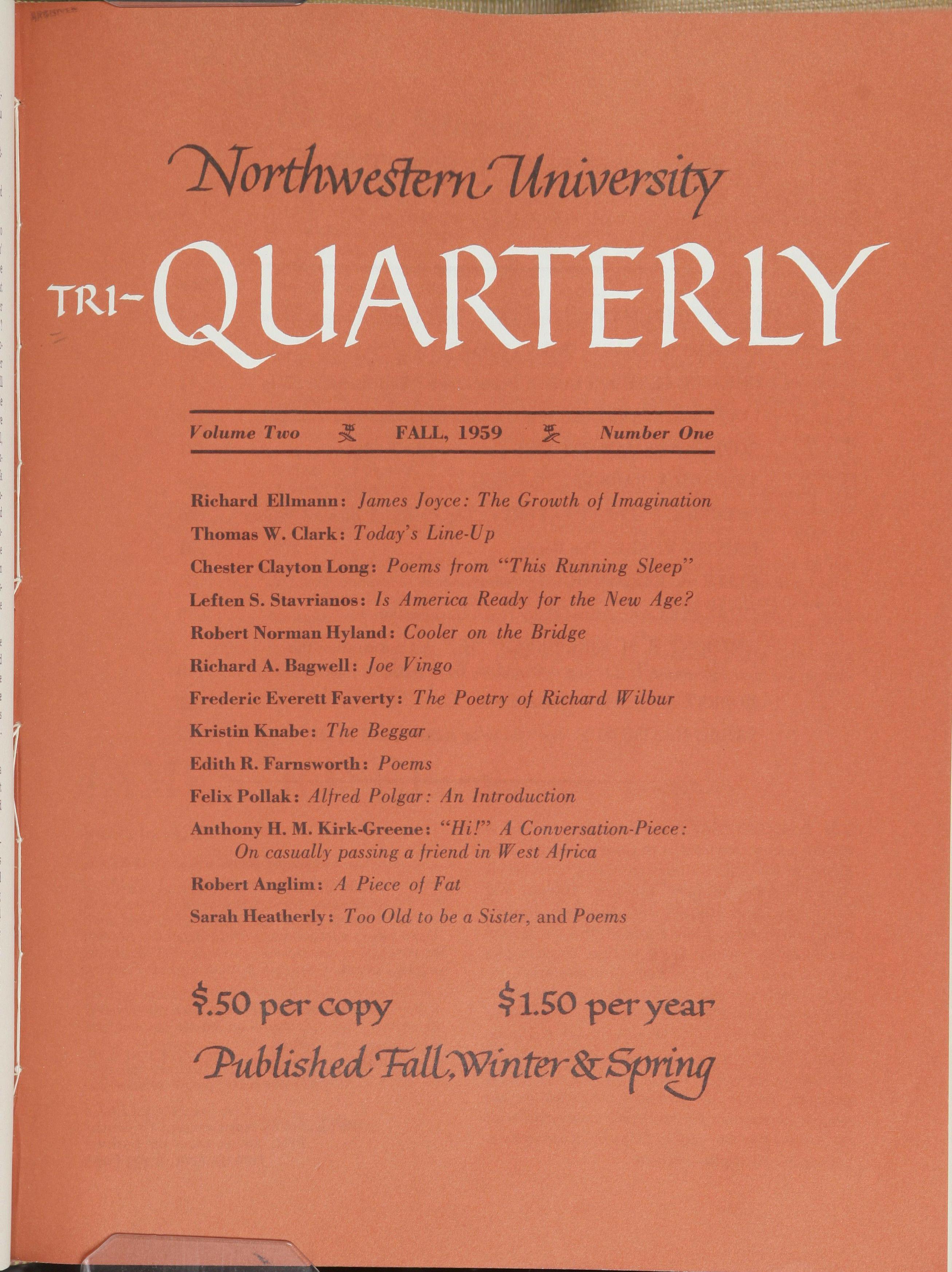
FALL, 1959
Number One Volume Tuo
Richard Ellmann: James Joyce: The Growth of Imagination
Thomas W. Clark: Today's Line-Up
Chester Clayton Long: Poems from "This Running Sleep"
Leften S. Stavrianos: Is America Ready for the New Age?
Robert Norman Hyland: Cooler on the Bridge
Richard A. Bagwell : Joe Vingo
Frederic Everett Faverty: The Poetry of Richard Wilbur
Kristin Knabe: The Beggar
Edith R. Farnsworth: Poems
Felix Pollak: Alfred Polgar.' An Introduction
Anthony H. M. Kirk-Greene: "Hi!" A Conversation-Piere: On casually passing a friend in West Africa
Rohert Anglim: A Piece of Fat
Sarah Heatherly: Too Old to be a Sister, and Poems $.50 per copy
$1.50l'eryear 'PublisW'1iJL';Winter&Spril!!!
The Tri-QUARTERLY is a magazine devoted to fiction, poetry, and articles of general interest, published in the fall, winter, and spring quarters at Northwestern University, Evanston, Illinois, and printed by Lloyd Hollister Inc., Wilmette, Illinois.
Subscription rates: $1.50 yearly within the United States; $1.65, Canada; $1.75, foreign. Single copies will be sold locally for $.50. Contributions, correspondence, and subscriptions should be addressed to The Tri-QUARTERLY, care of the Northwestern University Press, 1840 Sheridan Road, Evanston, Illinois. Contributions unaccompanied by a selfaddressed envelope and return postage will not be returned. Except by invitation, contributors are limited to persons who have some connection with the University. Copyright, 1959, by Northwestern University. All rights reserved.
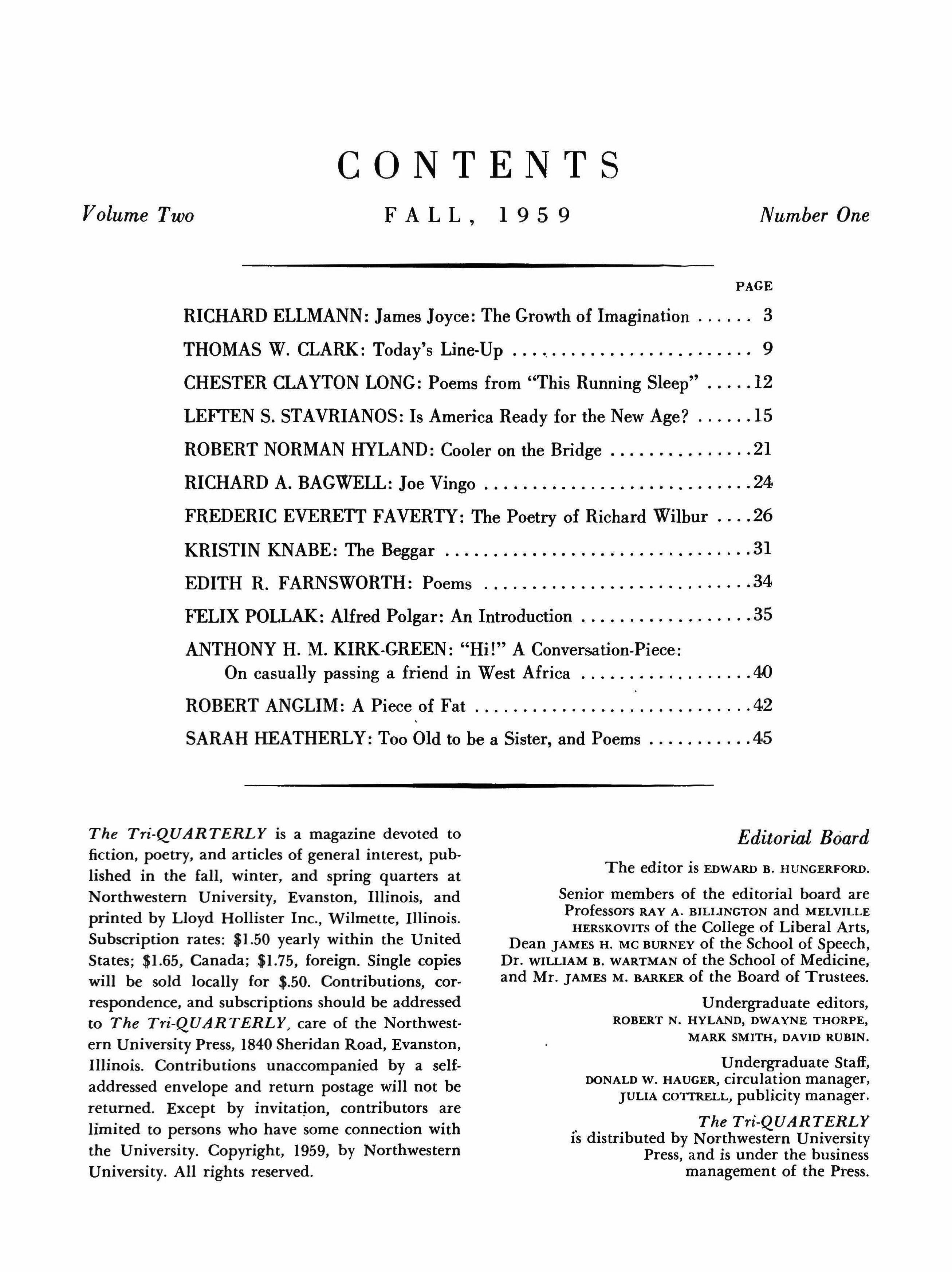
Editorial Board
The editor is EDWARD B. HUNGERFORD.
Senior members of the editorial board are Professors RAY A. BILLINGTON and MELVILLE HERSKOVITS of the College of Liberal Arts, Dean JAMES H. MC BURNEY of the School of Speech, Dr. WILLIAM B. WARTMAN of the School of Medicine, and Mr. JAMES M. BARKER of the Board of Trustees.
Undergraduate editors, ROBERT N. HYLAND, DWAYNE THORPE, MARK SMITH, DAVID RUBIN.
Undergraduate Staff, DONALD W. HAUGER, circulation manager, JULIA COTTRELL, publicity manager.
The Tri-QUARTERLY is distributed by Northwestern University Press, and is under the business management of the Press.
CONTENTS Volume Two FALL, 1959 Number One PAGE RICHARD ELLMANN: James Joyce: The Growth of Imagination 3 THOMAS W. CLARK: Today's Line-Up 9 CHESTER CLAYTON LONG: Poems from "This Running Sleep" 12 LEFTEN S. STAVRIANOS: Is America Ready for the New Age? 15 ROBERT NORMAN HYLAND: Cooler on the Bridge 21 RICHARD A. BAGWELL: Joe Vingo 24 FREDERIC EVERETT FAVERTY: The Poetry of Richard Wilbur 26 KRISTIN KNABE: The Beggar 31 EDITH R. FARNSWORTH: Poems 34 FELIX POLLAK: Alfred Polgar: An Introduction 35 ANTHONY
"Hi!" A Conversation-Piece: On casually passing a friend in West Africa 40 ROBERT ANGLIM: A Piece of Fat 42 SARAH HEATHERLY: Too Old to be a Sister, and Poems 45
H. M. KIRK-GREEN:
Richard Ellmann
The publication of Professor ElLmann's definitive biography, James Joyce* is an event of distinction in the literary world. The book is the result of years of travel and study in which Mr. Ellmann sought every possible source of information about Joyce, some of which, through death and the passage of time, will be available only through his researches. Mr. EHmann's students, his colleagues, and the University as a whole take special pride in his accomplishment, and THE Tru:-QUARTERLY is pleased to be able to reprint, with the permission of the Oxford University Press, a chapter of the biography which will reach our readers at approximately the date of the publication of the book.
Born in Michigan in 1918, Richard EHmann attended Yale University both as undergraduate and graduate student. In 1947 he received the degrees of Ph.D. from Yale and B. Litt from Trinity CoHege, Dublin. He taught at Harvard University, first as instructor and then as Briggs-Copeland Assisant Professor of English Composition. His teaching career at Harvard was interrupted by three years, during World War II, in the U.S. Navy and Office of Strategic Services. He came to Northwestern as Professor of English in 1951. He has held a number of fellowships and appointments, including Guggenheim fellowships, 1949-50, and 1957-58, a Rockefeller Post War Fellowship, 1946-47, the Kenyon Review Fellowship in Criticism, 1955-56, and appoi.ntments as professor and fellow in the Indiana School of Letters, in the summer of 1956, and as Euderick Ives Carpenter Visiting Professor at the University of Chicago in the spring of 1959.
His numerous pulHications have earned him a conspicuous place among critics and scholars in contemporary letters. In addition to his new James Joyce, Mr. EUmann's books include Yeats: the Man and the Masks (1948); Selected Writings of Henri Michaux (1951), a translation and introduction; The Identity of Yeats (1951); nad two volumes about Joyce, the one edited, the other coedited by Mr. EHmann, My Brother's Keeper, by Stanislaus Joyce (1958) and The Critical Writings of James Joyce (1959). He is presently preparing an edition of Joyce's letters.
JAMES JOYCE:
JOYCE, LIKE YEATS and other writers, never ceased to conduct a conversation with himself. A principal topic was the closeness of his bond to Dublin, which his books (as well as his letters) indicate he thoroughly examined. Although Stephen Dedalus in both Stephen Hero and A Portrait of the Artist as a Young Man assumes his own isolation, he surrounds himself with family and friends to whom he can confide it. When he rebels he hastens to let them know of his rebellion so that he can measure their response to it. He searches for disciples who must share his motives vicariously. As he de-
Copyright, 1959, by Richard Ellmann.
Fall, 1959
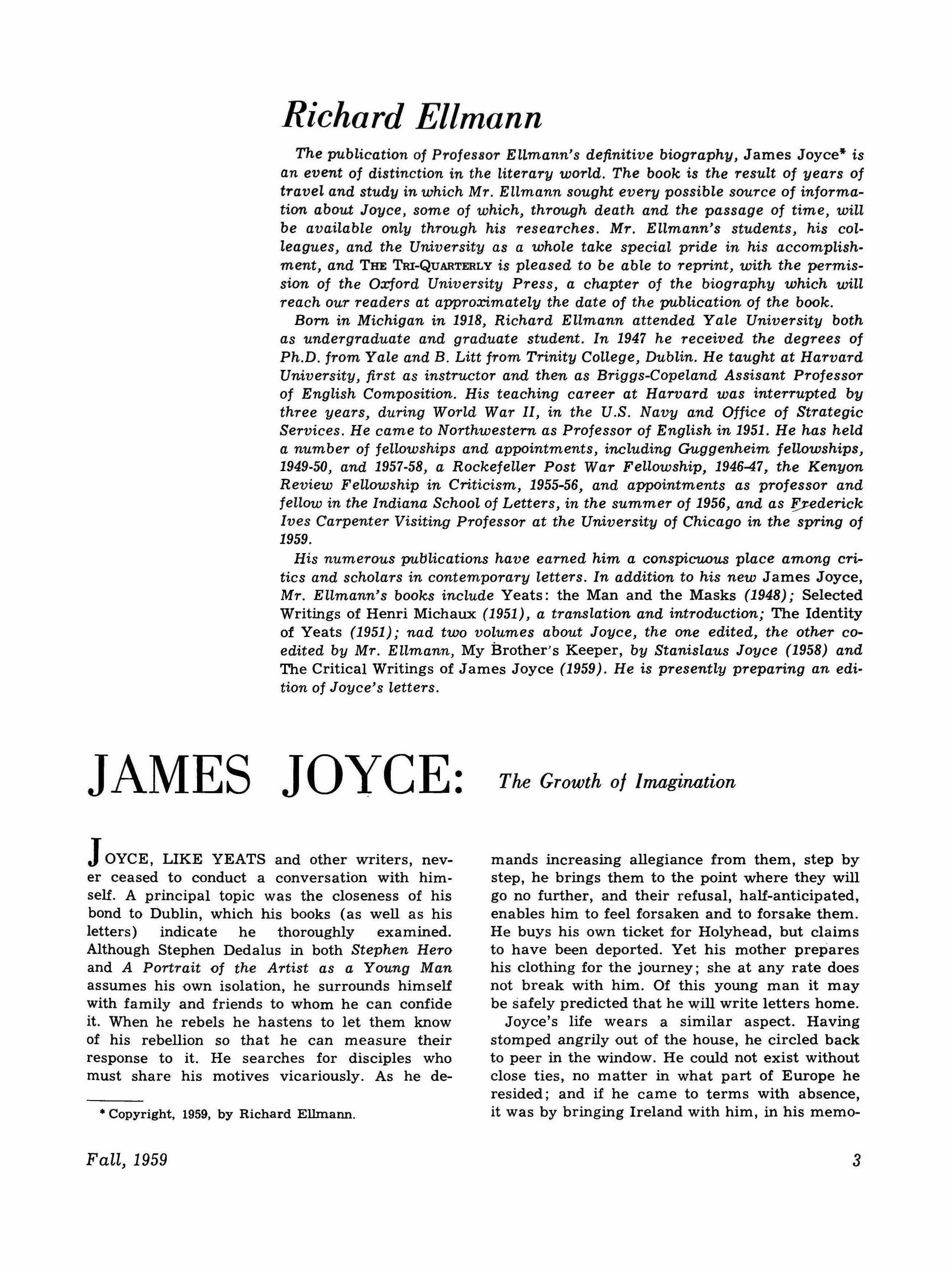
The Growth of Imagination
mands increasing allegiance from them, step by step, he brings them to the point where they will go no further, and their refusal, half-anticipated, enables him to feel forsaken and to forsake them. He buys his own ticket for Holyhead, but claims to have been deported. Yet his mother prepares his clothing for the journey; she at any rate does not break with him. Of this young man it may be safely predicted that he will write letters home. Joyce's life wears a similar aspect. Having stomped angrily out of the house, he circled back to peer in the window. He could not exist without close ties, no matter in what part of Europe he resided; and if he came to terms with absence, it was by bringing Ireland with him, in his memo-
3
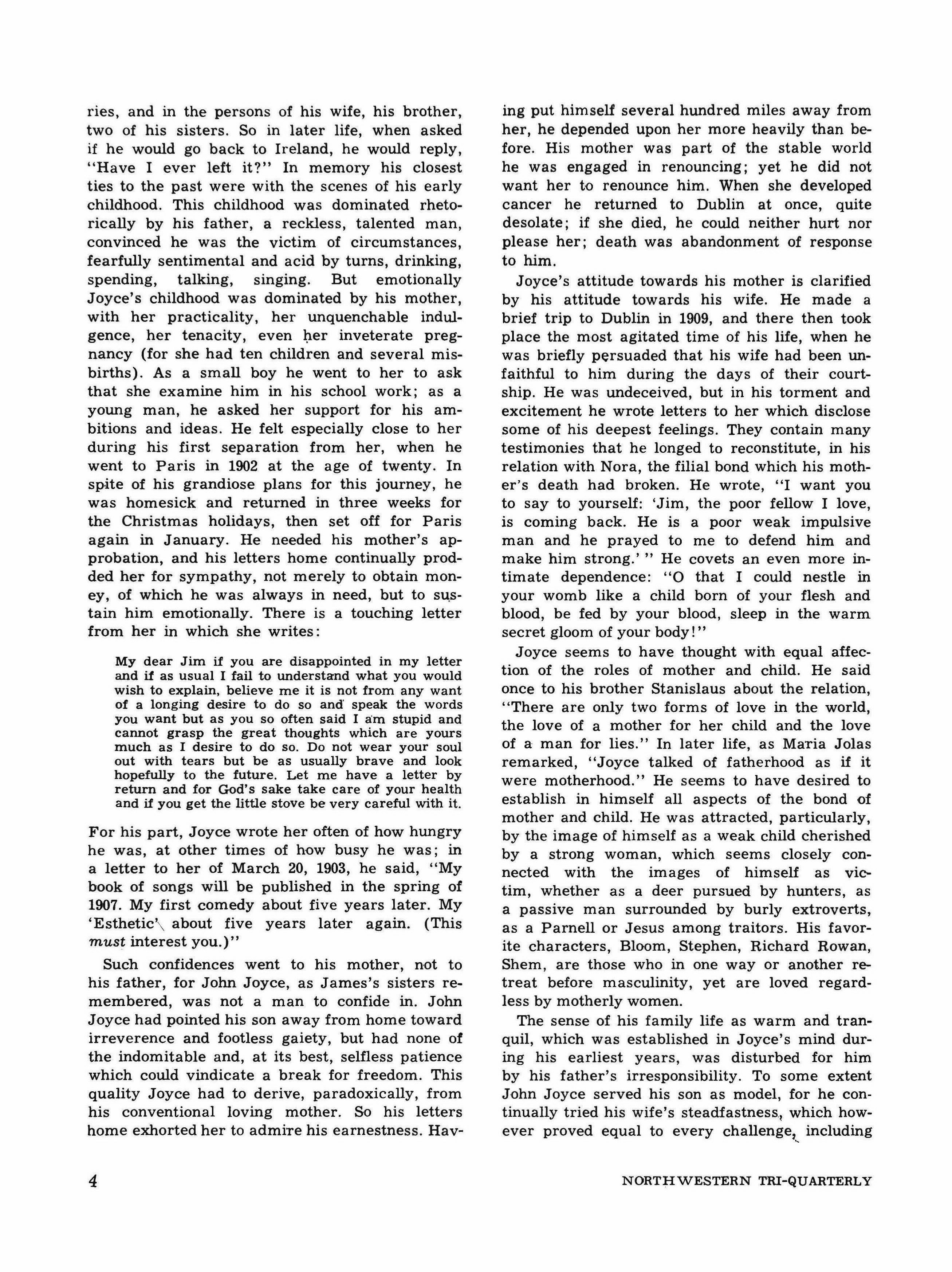
ries, and in the persons of his wife, his brother, two of his sisters. So in later life, when asked if he would go back to Ireland, he would reply, "Have I ever left it?" In memory his closest ties to the past were with the scenes of his early childhood. This childhood was dominated rhetorically by his father, a reckless, talented man, convinced he was the victim of circumstances, fearfully sentimental and acid by turns, drinking, spending, talking, singing. But emotionally Joyce's childhood was dominated by his mother, with her practicality, her unquenchable indulgence, her tenacity, even her inveterate pregnancy (for she had ten children and several misbirths). As a small boy he went to her to ask that she examine him in his school work; as a young man, he asked her support for his ambitions and ideas. He felt especially close to her during his first separation from her, when he went to Paris in 1902 at the age of twenty. In spite of his grandiose plans for this journey, he was homesick and returned in three weeks for the Christmas holidays, then set off for Paris again in January. He needed his mother's approbation, and his letters home continually prodded her for sympathy, not merely to obtain money, of which he was always in need, but to sustain him emotionally. There is a touching letter from her in which she writes:
My dear Jim if you are disappointed in my letter and if as usual I fail to understand what you would wish to explain, believe me it is not from any want of a longing desire to do so and' speak the words you want but as you so often said I am stupid and cannot grasp the great thoughts which are yours much as I desire to do so. Do not wear your soul out with tears but be as usually brave and look hopefully to the future. Let me have a letter by return and for God's sake take care of your health and if you get the little stove be very careful with it.
For his part, Joyce wrote her often of how hungry he was, at other times of how busy he was; in a letter to her of March 20, 1903, he said, "My book of songs will be published in the spring of 1907. My first comedy about five years later. My 'Esthetic'< about five years later again. (This must interest you.)"
Such confidences went to his mother, not to his father, for John Joyce, as James's sisters remembered, was not a man to confide in. John Joyce had pointed his son away from home toward irreverence and footless gaiety, but had none of the indomitable and, at its best, selfless patience which could vindicate a break for freedom. This quality Joyce had to derive, paradoxically, from his conventional loving mother. So his letters home exhorted her to admire his earnestness. Hav-
ing put himself several hundred miles away from her, he depended upon her more heavily than before. His mother was part of the stable world he was engaged in renouncing; yet he did not want her to renounce him. When she developed cancer he returned to Dublin at once, quite desolate; if she died, he could neither hurt nor please her; death was abandonment of response to him.
Joyce's attitude towards his mother is clarified by his attitude towards his wife. He made a brief trip to Dublin in 1909, and there then took place the most agitated time of his life, when he was briefly persuaded that his wife had been unfaithful to him during the days of their courtship. He was undeceived, but in his torment and excitement he wrote letters to her which disclose some of his deepest feelings. They contain many testimonies that he longed to reconstitute, in his relation with Nora, the filial bond which his mother's death had broken. He wrote, "I want you to say to yourself: 'Jim, the poor fellow I love, is coming back. He is a poor weak impulsive man and he prayed to me to defend him and make him strong.' He covets an even more intimate dependence: "0 that I could nestle in your womb like a child born of your flesh and blood, be fed by your blood, sleep in the warm secret gloom of your body!
Joyce seems to have thought with equal affection of the roles of mother and child. He said once to his brother Stanislaus about the relation, "There are only two forms of love in the world, the love of a mother for her child and the love of a man for lies." In later life, as Maria Jolas remarked, "Joyce talked of fatherhood as if it were motherhood." He seems to have desired to establish in himself all aspects of the bond of mother and child. He was attracted, particularly, by the image of himself as a weak child cherished by a strong woman, which seems closely connected with the images of himself as victim, whether as a deer pursued by hunters, as a passive man surrounded by burly extroverts, as a Parnell or Jesus among traitors. His favorite characters, Bloom, Stephen, Richard Rowan, Shem, are those who in one way or another retreat before masculinity, yet are loved regardless by motherly women.
The sense of his family life as warm and tranquil, which was established in Joyce's mind during his earliest years, was disturbed for him by his father's irresponsibility. To some extent John Joyce served his son as model, for he continually tried his wife's steadfastness, which however proved equal to every challenge; including
4
NORTHWESTERN TRI-QUARTERLY
a drunken attempt on her life. James, contesting for his mother's love, learned to use the same weapons with a difference. A merely good boy would have been submerged, unable to compete with his father in the inordinate demands upon his mother's affection, but a prodigal son had a better chance. His mother must be encouraged to love him more than his father because he was just as errant and much more gifted, so more pitiable and lovable. For his irresponsibility was the turbulence of genius, motivated-unlike his father's-by courage rather than by failure. At first James's irresponsibility took the form of arousing his mother to question his conduct. Should he really read those dreadful books of Ibsen? His answers proved surprisingly sweeping and persuasive. Then he tried her further: John Joyce had been anticlerical, James exceeded him by becoming irreligious.
This change, which was not easy for him to undergo, presented an added complication. For one thing, in the figure of the Virgin he had found a mother image which he cherished. He had gone to prostitutes and then prayed to the Virgin as later he would drum up old sins so as to demand Nora's forgiveness with them; the Virgin's love, like his mother's and later his wife's were of a sort especially suited to great sinners. But there was an aspect of Irish Catholicism which he was glad to abandon. It was not a mother church but a father church, harsh, repressive, masculine. To give it up was both consciously and unconsciously to offer his mother's love its supreme test, for his mother was deeply religious. She was disconcerted but did not abandon him. Yet her death not long after one of his open defiances of her belief seemed a punishment; he felt as if he had killed her by trying her too far. This thought he confided to Nora, who called him reproachfully, "Woman-killer."
When Joyce met Nora Barnacle in 1904, it was not enough for her to be his mistress; she must be his queen and even his goddess; he must be able to pray to her. But to gain all her love, and so increase her perfection, he must make sure she will accept even the worst in him. He must test her by making her his wife without calling her that, by denying legal sanction to the bond between them, just as in dealing with his mother he had wanted her to acknowledge him as her son even though in so many ways he was not filial. Nora Barnacle passed this test easily, no doubt aware that their attachment was indispensable to him. Then he tried her further, not by flouting her religion, which she did not care deeply about, but by entertaining doubts of
Fall, 1959
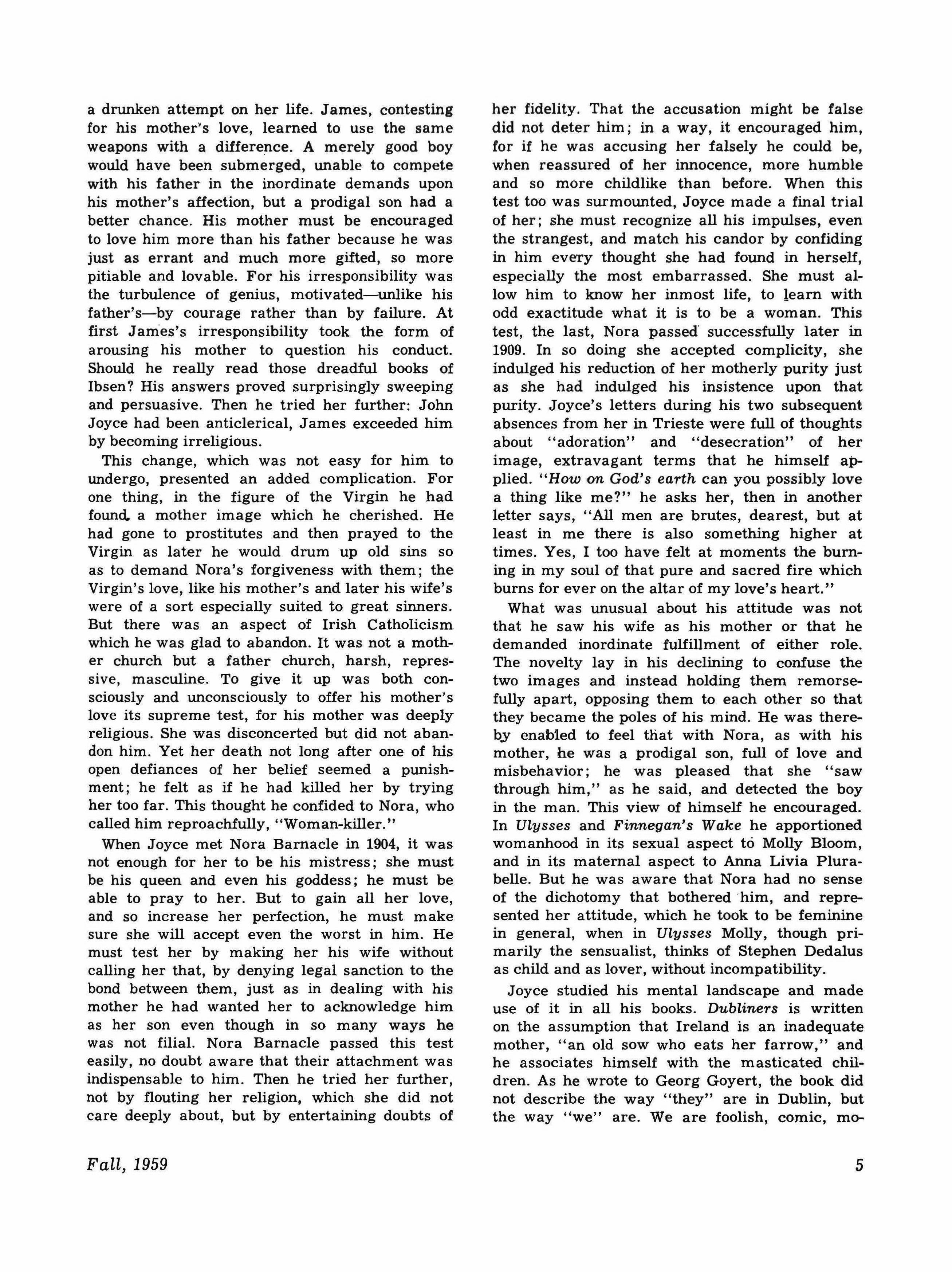
her fidelity. That the accusation might be false did not deter him; in a way, it encouraged him, for if he was accusing her falsely he could be, when reassured of her innocence, more humble and so more childlike than before. When this test too was surmounted, Joyce made a final trial of her; she must recognize all his impulses, even the strangest, and match his candor by confiding in him every thought she had found in herself, especially the most embarrassed. She must allow him to know her inmost life, to learn with odd exactitude what it is to be a woman. This test, the last, Nora passed" successfully later in 1909. In so doing she accepted complicity, she indulged his reduction of her motherly purity just as she had indulged his insistence upon that purity. Joyce's letters during his two subsequent absences from her in Trieste were full of thoughts about "adoration" and "desecration" of her image, extravagant terms that he himself applied. "How on God's earth can you possibly love a thing like me?" he asks her, then in another letter says, "All men are brutes, dearest, but at least in me there is also something higher at times. Yes, I too have felt at moments the burning in my soul of that pure and sacred fire which burns for ever on the altar of my love's heart."
What was unusual about his attitude was not that he saw his wife as his mother or that he demanded inordinate fulfillment of either role. The novelty lay in his declining to confuse the two images and instead holding them remorsefully apart, opposing them to each other so that they became the poles of his mind. He was thereby enabled to feel that with Nora, as with his mother, he was a prodigal son, full of love and misbehavior; he was pleased that she "saw through him," as he said, and detected the boy in the man. This view of himself he encouraged. In Ulysses and Finnegan's Wake he apportioned womanhood in its sexual aspect to Molly Bloom, and in its maternal aspect to Anna Livia Plurabelle. But he was aware that Nora had no sense of the dichotomy that bothered him, and represented her attitude, which he took to be feminine in general, when in Ulysses Molly, though primarily the sensualist, thinks of Stephen Dedalus as child and as lover, without incompatibility.
Joyce studied his mental landscape and made use of it in all his books. Dubliners is written on the assumption that Ireland is an inadequate mother, "an old sow who eats her farrow," and he associates himself with the masticated children. As he wrote to Georg Goyert, the book did not describe the way "they" are in Dublin, but the way "we" are. We are foolish, comic, mo-
5
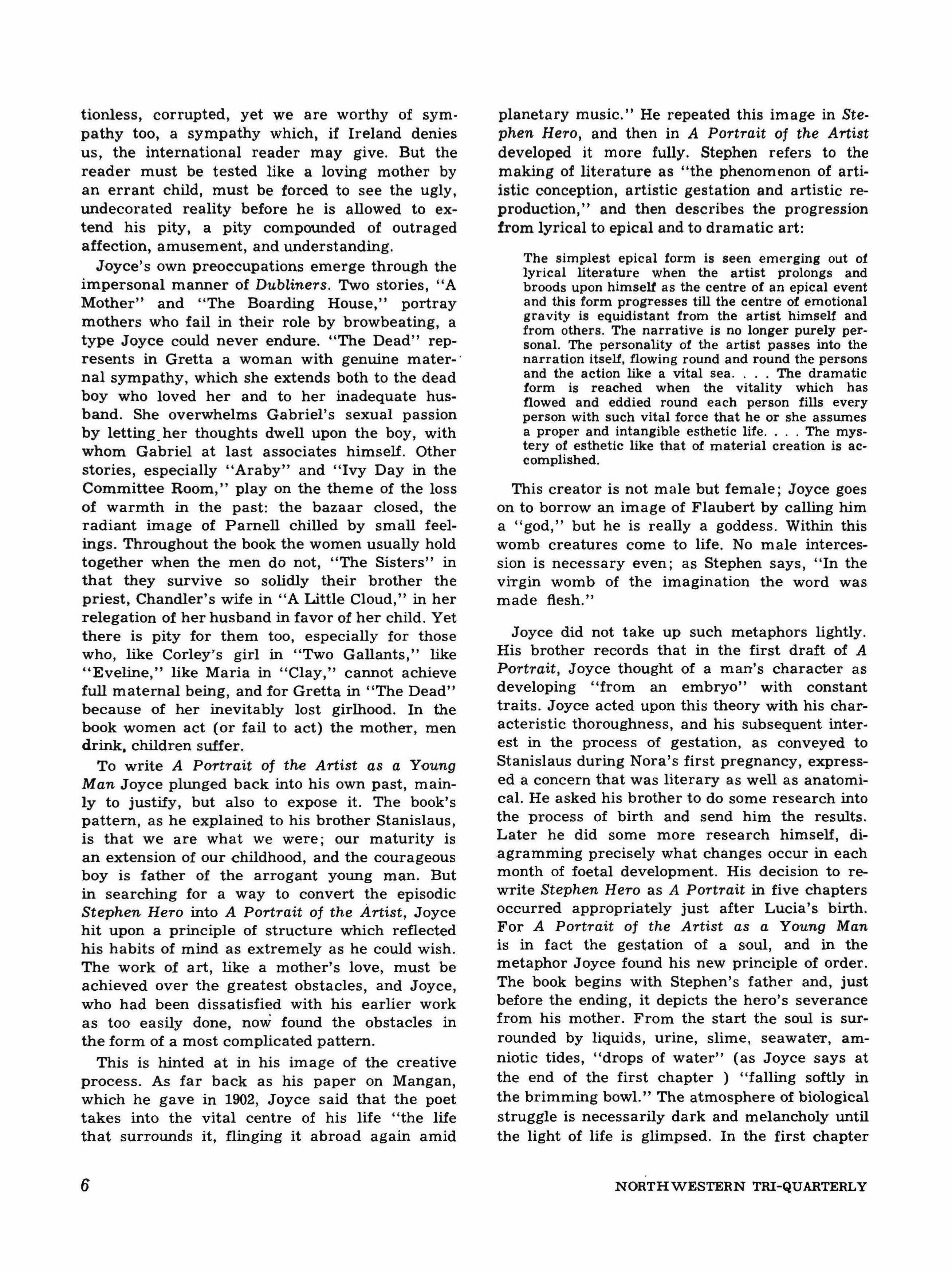
tionless, corrupted, yet we are worthy of sympathy too, a sympathy which, if Ireland denies us, the international reader may give. But the reader must be tested like a loving mother by an errant child, must be forced to see the ugly, undecorated reality before he is allowed to extend his pity, a pity compounded of outraged affection, amusement, and understanding.
Joyce's own preoccupations emerge through the impersonal manner of Du.bliners. Two stories, "A Mother" and "The Boarding House," portray mothers who fail in their role by browbeating, a type Joyce could never endure. "The Dead" represents in Gretta a woman with genuine mater-: nal sympathy, which she extends both to the dead boy who loved her and to her inadequate husband. She overwhelms Gabriel's sexual passion by letting_her thoughts dwell upon the boy, with whom Gabriel at last associates himself. Other stories, especially "Araby" and "Ivy Day in the Committee Room," play on the theme of the loss of warmth in the past: the bazaar closed, the radiant image of Parnell chilled by small feelings. Throughout the book the women usually hold together when the men do not, "The Sisters" in that they survive so solidly their brother the priest, Chandler's wife in "A Little Cloud," in her relegation of her husband in favor of her child. Yet there is pity for them too, especially for those who, like Corley's girl in "Two Gallants," like "Eveline," like Maria in "Clay," cannot achieve full maternal being, and for Gretta in "The Dead" because of her inevitably lost girlhood. In the book women act (or fail to act) the mother, men drink. children suffer.
To write A Portrait of the Artist as a You.ng Man Joyce plunged back into his own past, mainly to justify, but also to expose it. The book's pattern, as he explained to his brother Stanislaus, is that we are what we were; our maturity is an extension of our childhood, and the courageous boy is father of the arrogant young man. But in searching for a way to convert the episodic Stephen Hero into A Portrait of the Artist, Joyce hit upon a principle of structure which reflected his habits of mind as extremely as he could wish. The work of art, like a mother's love, must be achieved over the greatest obstacles, and Joyce, who had been dissatisfied with his earlier work as too easily done, now found the obstacles in the form of a most complicated pattern.
This is hinted at in his image of the creative process. As far back as his paper on Mangan, which he gave in 1902, Joyce said that the poet takes into the vital centre of his life "the life that surrounds it, flinging it abroad again amid
planetary music." He repeated this image in Stephen Hero, and then in A Portrait of the Artist developed it more fully. Stephen refers to the making of literature as "the phenomenon of artiistic conception, artistic gestation and artistic reproduction," and then describes the progression from lyrical to epical and to dramatic art:
The simplest epical form is seen emerging out of lyrical literature when the artist prolongs and broods upon himself as the centre of an epical event and this form progresses till the centre of emotional gravity is equidistant from the artist himself and from others. The narrative is no longer purely personal. The personality of the artist passes into the narration itself, flowing round and round the persons and the action like a vital sea The dramatic form is reached when the vitality which has flowed and eddied round each person fills every person with such vital force that he or she assumes a proper and intangible esthetic life. The mystery of esthetic like that of material creation is accomplished.
This creator is not male but female; Joyce goes on to borrow an image of Flaubert by calling him a "god," but he is really a goddess. Within this womb creatures come to life. No male intercession is necessary even; as Stephen says, "In the virgin womb of the imagination the word was made flesh."
Joyce did not take up such metaphors lightly. His brother records that in the first draft of A Portrait, Joyce thought of a man's character as developing "from an embryo" with constant traits. Joyce acted upon this theory with his characteristic thoroughness, and his subsequent interest in the process of gestation, as conveyed to Stanislaus during Nora's first pregnancy, expressed a concern that was literary as well as anatomical. He asked his brother to do some research into the process of birth and send him the results. Later he did some more research himself, diagramming precisely what changes occur in each month of foetal development. His decision to rewrite Stephen Hero as A Portrait in five chapters occurred appropriately just after Lucia's birth. For A Portrait of the Artist as a Young Man is in fact the gestation of a soul, and in the metaphor Joyce found his new principle of order. The book begins with Stephen's father and, just before the ending, it depicts the hero's severance from his mother. From the start the soul is surrounded by liquids, urine, slime, seawater, amniotic tides, "drops of water" (as Joyce says at the end of the first chapter ) "falling softly in the brimming bowl." The atmosphere of biological struggle is necessarily dark and melancholy until the light of life is glimpsed. In the first chapter
6
TRI-QUARTERLY
NORTHWESTERN
the foetal soul is for a few pages only slightly individualized, the organism responds only to the most primitive sensory impressions, then the heart forms and musters its affections, the being struggles towards some unspecified, uncomprehended culmination, it is flooded in ways it cannot understand or control, it gropes wordlessly towards sexual differentiation. In the third chapter shame floods Stephen's whole body as conscience develops, the lower bestial nature is put by. Then at the end of the fourth chapter the soul discovers the goal towards which it has been mysteriously proceeding-the goal of life. It must swim no more but emerge into air, the new metaphor being flight. The last chapter shows the soul, already fully developed, fattening itself for its journey until at last it is ready to leave. In the last few pages of the book, Stephen's diary, the soul is released from its confinement, its individuality is complete, and the style shifts with savage abruptness.
The sense of the soul's development as like that of an embryo not only helped Joyce to the book's liquid and air imagery, but also encouraged him to weave and re-weave the original elements in the process of gestation. Stephen's growth proceeds in waves, in accretions of flesh, in particularization of needs and desires around and around but always ultimately forward. The episodic framework of Stephen Hero was renounced in favor of a group of scenes radiating backwards and forwards. In the new first chapter Joyce had three clusters of sensations: his earliest memories of infancy, his sickness at Clongowes, and his pandying at Father Dolants hands. Under these he subsumed chains of related moments, with the effect of three fleshings in time rather than of a linear succession of events. The sequence became primarily one of layers rather than of years.
In this process other human beings are not allowed much existence except as influences upon the soul's development or features of it. The same figures appear and reappear, the schoolboy Heron for example, each time in an altered way to suggest growth in the soul's view of them. Eileen Vance, a partner in childhood games, becomes the object of Stephen's adolescent love poems; the master at Clongowes reappears as the preacher of the sermons at Belvedere. (In both these instances Joyce changed the actual events.) The same words, "apologise," "admit," "maroon," "green," "cold," "warm," "wet," and the like, keep recurring with new implications. The book moves from rudimentary meanings to more complex ones, as in the conceptions of the
Fall, 1959

call and the fall. Stephen, in the first chapter fascinated by unformed images, is next summoned by the flesh and then by the church, the second chapter ending with a prostitute's lingual kiss, the third with his reception of the Host upon his tongue. The soul that has been enraptured by body in the second chapter and by spirit in the third (both depicted in sensory images) is caught by art and life, which encompass both spirit and body without bowing before either, in the fourth chapter; the process of ontogeny is virtually complete. Similarly the fall into sin, at first a terror, gradually becomes an essential part of the discovery of self and life.
Now Stephen, his character still recomposing the same elements, leaves the Catholic priesthood behind him to become "a priest of eternal imagination, transmuting the daily bread of experience into the radiant body of everlasting life." Having listened to sermons on ugliness in the third chapter, he makes his own sermons on beauty in the last. The Virgin is transformed into the girl wading on the strand, symbolizing a more tangible reality. In the last two chapters, to suit his new structure, Joyce minimizes Stephen's physical life to show the dominance of his mind, which has accepted but subordinated physical things. The soul is ready now, it throws off its sense of imprisonment, its melancholy, its no longer tolerable conditions of lower existence, to be born.
Joyce was obviously well-pleased with the paradox into which his method had put him, that he was, as the artist framing his own development in a constructed matrix, his own mother. The complications of this state are implied in Stephen's thought of himself as not his parents' true son, but a foster-son. In Ulysses Joyce was to carry the method much further; he makes that book the epic of the whole human body, the womb being the organ only of the Oxen of the Sun episode. The Oxen of the Sun is based, even more meticulously than A Portrait, upon the stages of birth. As Joyce wrote Frank Budgen on March 20, 1920, "Am working hard at Oxen of the Sun, the idea being the crime committeed against fecundity by sterilizing the act of coition. Scene, lying-in hospital. Technique: a nineparted episode without divisions After listing the parts Joyce says, "This procession is also linked back at each part subtly with some foregoing episode of the day and, besides this, with the natural stages of development in the embryo and the periods of faunal evolution in general Bloom is the spermatozoon, the hospital the womb, the nurse the ovum, Stephen the embryo. How's
7
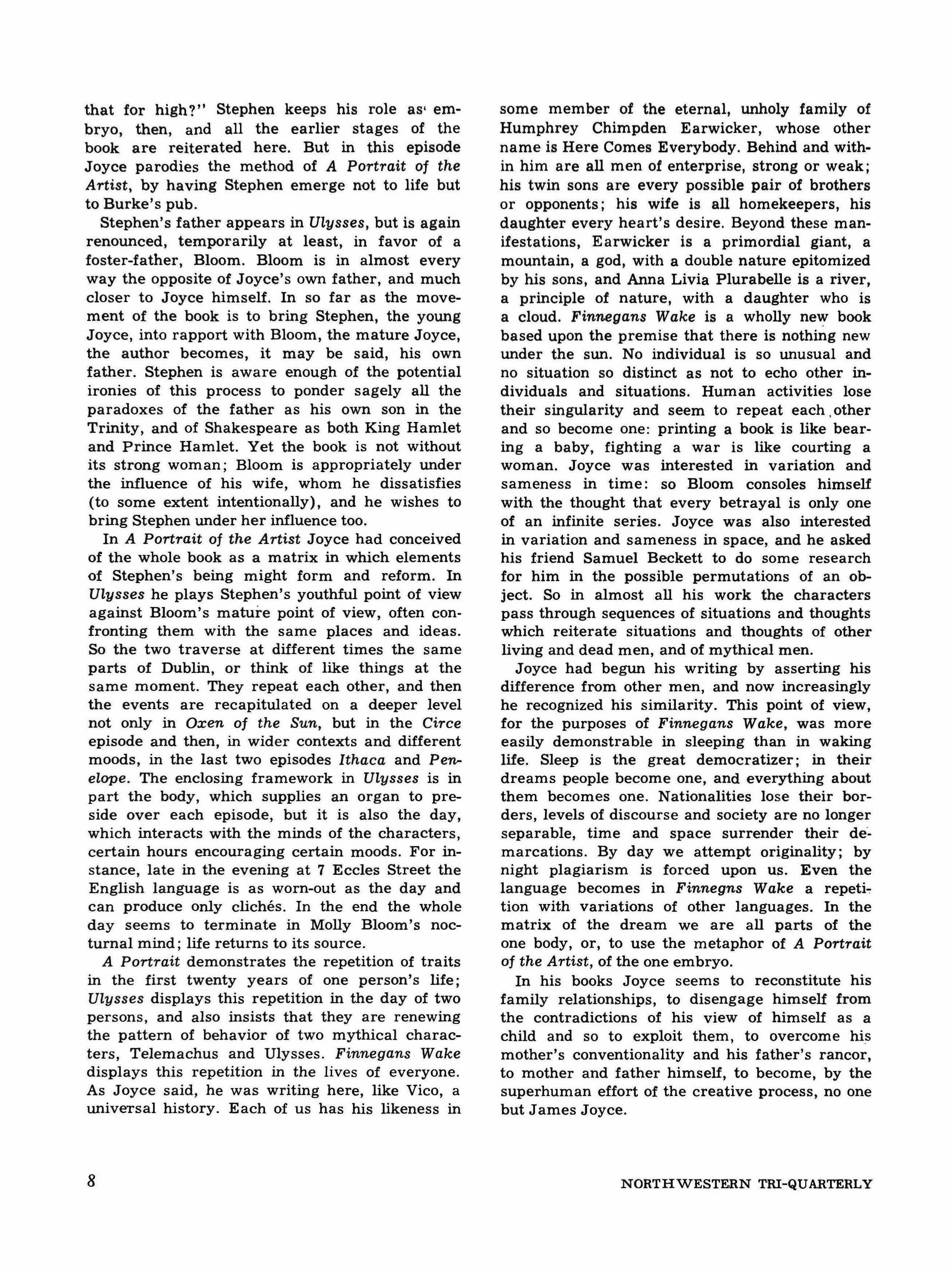
that for high?" Stephen keeps his role as' embryo, then, and all the earlier stages of the book are reiterated here. But in this episode Joyce parodies the method of A Portrait of the Artist, by having Stephen emerge not to life but to Burke's pub.
Stephen's father appears in Ulysses, but is again renounced, temporarily at least, in favor of a foster-father, Bloom. Bloom is in almost every way the opposite of Joyce's own father, and much closer to Joyce himself. In so far as the movement of the book is to bring Stephen, the young Joyce, into rapport with Bloom, the mature Joyce, the author becomes, it may be said, his own father. Stephen is aware enough of the potential ironies of this process to ponder sagely all the paradoxes of the father as his own son in the Trinity, and of Shakespeare as both King Hamlet and Prince Hamlet. Yet the book is not without its strong woman; Bloom is appropriately under the influence of his wife, whom he dissatisfies (to some extent intentionally), and he wishes to bring Stephen under her influence too.
In A Portrait of the Artist Joyce had conceived of the whole book as a matrix in which elements of Stephen's being might form and reform. In Ulysses he plays Stephen's youthful point of view against Bloom's mature point of view, often confronting them with the same places and ideas. So the two traverse at different times the same parts of Dublin, or think of like things at the same moment. They repeat each other, and then the events are recapitulated on a deeper level not only in Oxen of the Sun, but in the Circe episode and then, in wider contexts and different moods, in the last two episodes Ithaca and Penelope. The enclosing framework in Ulysses is in part the body, which supplies an organ to preside over each episode, but it is also the day, which interacts with the minds of the characters, certain hours encouraging certain moods. For instance, late in the evening at 7 Eccles Street the English language is as worn-out as the day and can produce only cliches. In the end the whole day seems to terminate in Molly Bloom's nocturnal mind; life returns to its source.
A Portrait demonstrates the repetition of traits in the first twenty years of one person's life; Ulysses displays this repetition in the day of two persons, and also insists that they are renewing the pattern of behavior of two mythical characters, Telemachus and Ulysses. Finnegans Wake displays this repetition in the lives of everyone. As Joyce said, he was writing here, like Vico, a universal history. Each of us has his likeness in
some member of the eternal, unholy family of Humphrey Chimpden Earwicker, whose other name is Here Comes Everybody. Behind and within him are all men of enterprise, strong or weak; his twin sons are every possible pair of brothers or opponents; his wife is all homekeepers, his daughter every heart's desire. Beyond these manifestations, Earwicker is a primordial giant, a mountain, a god, with a double nature epitomized by his sons, and Anna Livia Plurabelle is a river, a principle of nature, with a daughter who is a cloud. Finnegans Wake is a wholly new book based upon the premise that there is nothing new under the sun. No individual is so unusual and no situation so distinct as not to echo other individuals and situations. Human activities lose their singularity and seem to repeat each. other and so become one: printing a book is like bearing a baby, fighting a war is like courting a woman. Joyce was interested in variation and sameness in time: so Bloom consoles himself with the thought that every betrayal is only one of an infinite series. Joyce was also interested in variation and sameness in space, and he asked his friend Samuel Beckett to do some research for him in the possible permutations of an object. So in almost all his work the characters pass through sequences of situations and thoughts which reiterate situations and thoughts of other living and dead men, and of mythical men.
Joyce had begun his writing by asserting his difference from other men, and now increasingly he recognized his similarity. This point of view, for the purposes of Finnegans Wake, was more easily demonstrable in sleeping than in waking life. Sleep is the great democratizer; in their dreams people become one, and everything about them becomes one. Nationalities lose their borders, levels of discourse and society are no longer separable, time and space surrender their demarcations. By day we attempt originality; by night plagiarism is forced upon us. Even the language becomes in Finnegns Wake a repetition with variations of other languages. In the matrix of the dream we are all parts of the one body, or, to use the metaphor of A Portrait of the Artist, of the one embryo.
In his books Joyce seems to reconstitute his family relationships, to disengage himself from the contradictions of his view of himself as a child and so to exploit them, to overcome his mother's conventionality and his father's rancor, to mother and father himself, to become, by the superhuman effort of the creative process, no one but James Joyce.
8
NORTHWESTERN TRI-QUARTERLY
Thomas W. Clark
Thomas Walton Clark, Speech '55, was born in St. Louis, and attended high school first in Lima, Ohio, then in Evanston. He received his pilot's wings at Reese Air Force Base in Texas, and is now a jet pilot with the rank of First Lieutenant in the United States Air Force, stationed at Bunker Hill Air Force Base near Peru, Indiana. He is married and the father of a son, Thomas. In college he was active in dramatics and has contributed to every Waa-Mu Show since 1953, writing the major part of last year's very amusing and successful show.
TODAY'S LINE-UP
MILTON NEVINS, Director of the University Marching Band, sat nervously outside the President's office and hummed "Fight On, Fight On, L.T.U.!" again and again. Suddenly the buzzer on the secretary's desk buzzed. She spoke secretly and softly into it and then looked at Milton Nevins. "Doctor Fent will see you now," she said. He picked up his briefcase and opened the door to the inner office. "Come in, Nevins," said the President. And when Nevins was inside and had closed the door behind-"Sit down." Nevins sat down. He glanced at the little day-by-day calendar on the President's desk and read the words "Saturday, October 30." Beneath that was written "Homecoming." The last was underlined several times.
Not that it needed to be underlined for Milton Nevins. For; weeks, he'd driven the band relentlessly. The other half-time performances had been merely in preparation for this day of all days. The lights of the Band Building had burned late into the chill, autumn evenings. Inside were chalktalks and scouting reports and musical arrangements to be rearranged at the drop of a baton. The cool $d of early morning had wafted melodic airs across the campus as the band played, marched, and practiced for the big day-Saturday, October 30.
Now the President cleared his throat and stared at Nevins. "See here, Nevins," he began, "I'd no sooner finished assuring the president of the Quarterback Club that the band's performance this afternoon would be magnificent, when you called and said there was trouble with the band. Well, what's the trouble?"
The band director hesitated and considered with a flash of terror what he was about to say. He
reu, 1959
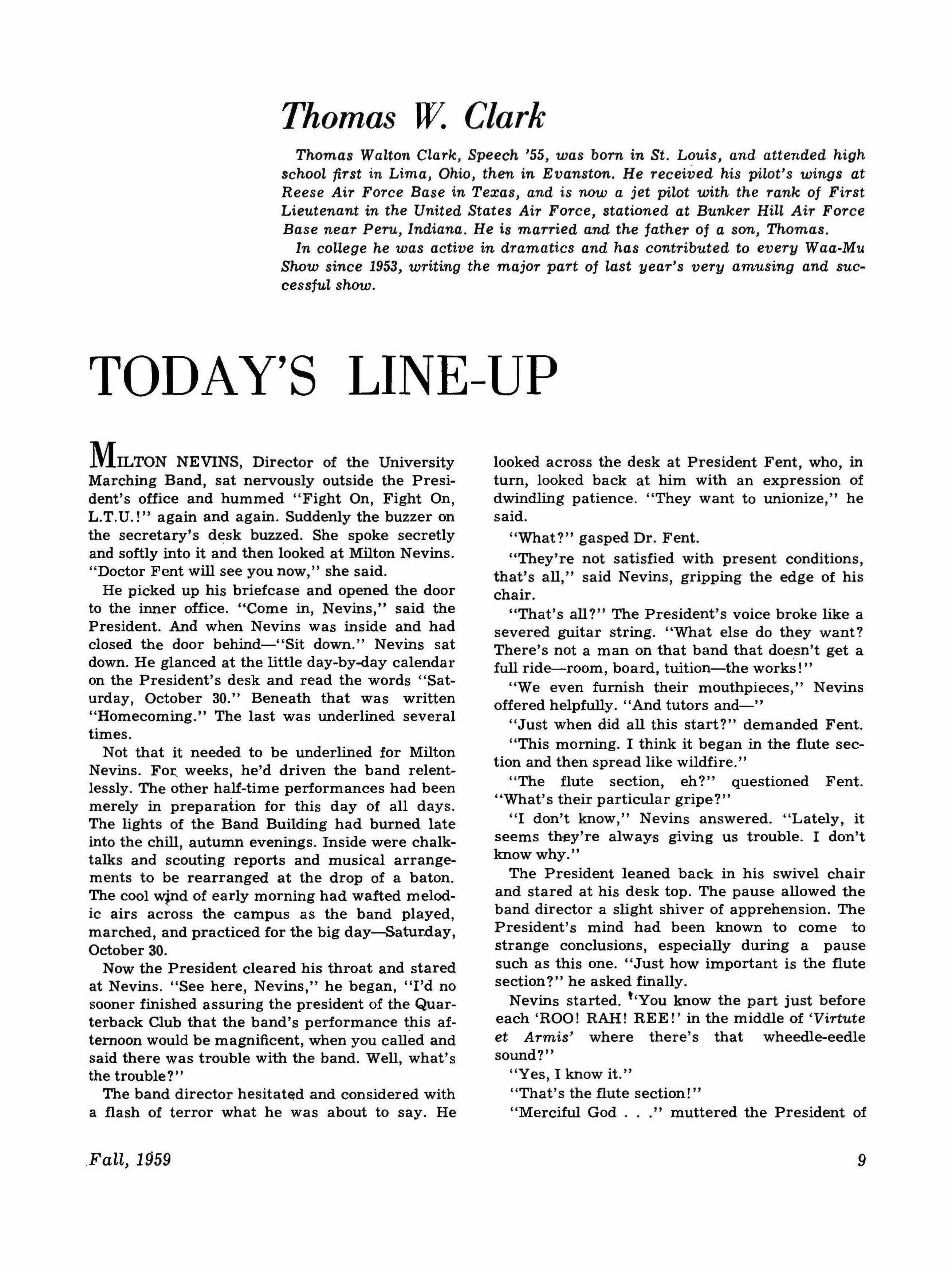
looked across the desk at President Fent, who, in turn, looked back at him with an expression of dwindling patience. "They want to unionize," he said.
"What?" gasped Dr. Fent.
"They're not satisfied with present conditions, that's all," said Nevins, gripping the edge of his chair.
"That's all?" The President's voice broke like a severed guitar string. "What else do they want? There's not a man on that band that doesn't get a full ride-room, board, tuition-the work�!
"We even furnish their mouthpieces," Nevins offered helpfully. "And tutors and-"
"Just when did all this start?" demanded Fent.
"This morning. I think it began in the flute section and then spread like wildfire."
"The flute section, eh?" questioned Fent. "What's their particular gripe?"
"I don't know," Nevins answered. "Lately, it seems they're always giving us trouble. I don't know why."
The President leaned back in his swivel chair and stared at his desk top. The pause allowed the band director a slight shiver of apprehension. The President's mind had been known to come to strange conclusions, especially during a pause such as this one.••Just how important is the flute section?" he asked finally.
Nevins started. t·you know the part just before each 'ROO! RAH! REEl' in the middle of 'Virtute et Armis' where there's that wheedle-eedle sound?"
"Yes, I know it."
"That's the flute section!"
"Merciful God ." muttered the President of 9
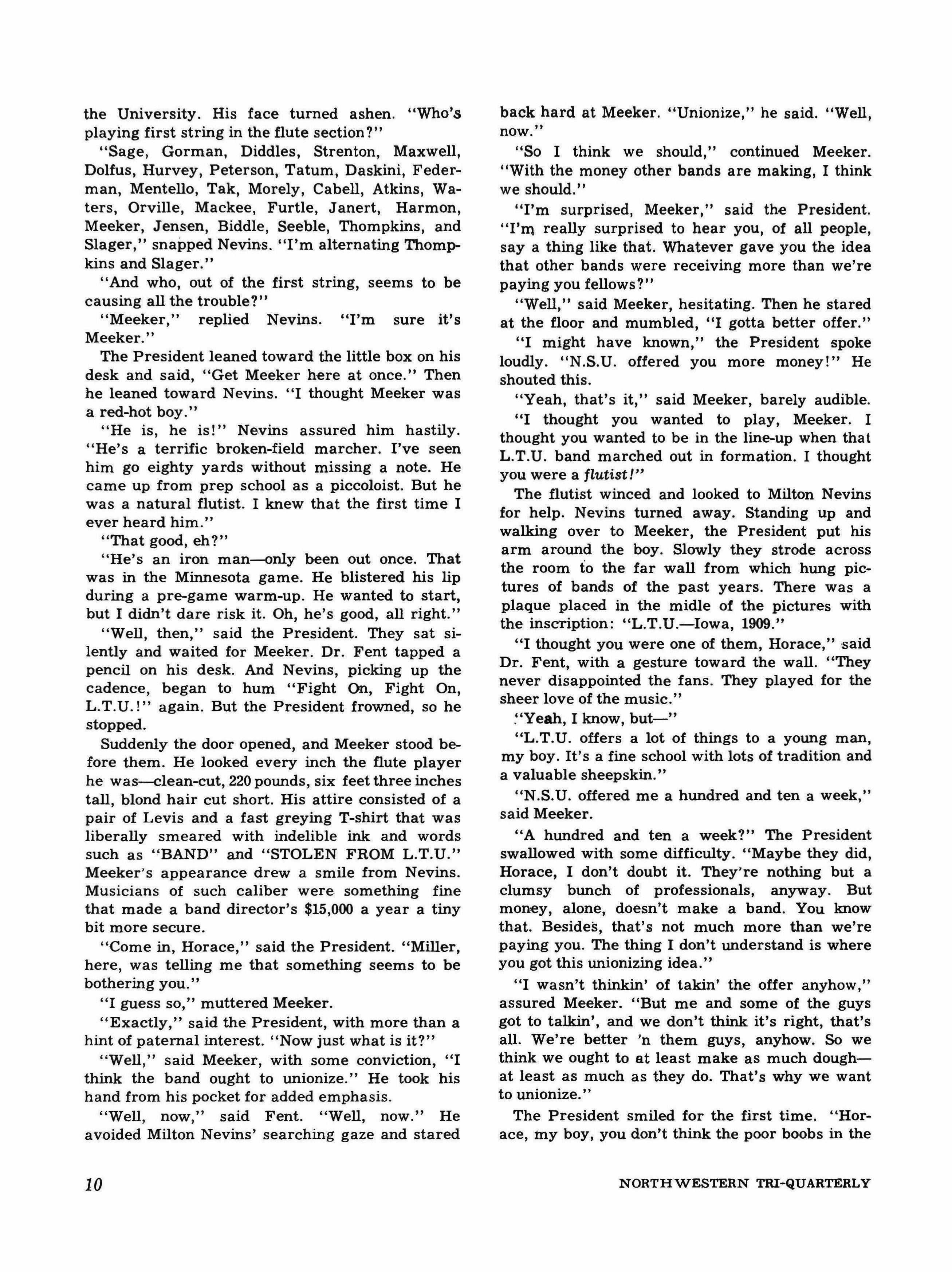
the University. His face turned ashen. "Who's playing first string in the flute section?"
"Sage, Gorman, Diddles, Strenton, Maxwell, Dolfus, Hurvey, Peterson, Tatum, Daskini, Federman, Mentello, Tak, Morely, Cabell, Atkins, Waters, Orville, Mackee, Furtle, Janert, Harmon, Meeker, Jensen, Biddle, Seeble, Thompkins, and Slager," snapped Nevins. "I'm alternating Thompkins and Slager."
"And who, out of the first string, seems to be causing all the trouble?"
"Meeker," replied Nevins. "I'm sure it's Meeker."
The President leaned toward the little box on his desk and said, "Get Meeker here at once." Then he leaned toward Nevins. "I thought Meeker was a red-hot boy."
"He is, he is! Nevins assured him hastily. "He's a terrific broken-field marcher. I've seen him go eighty yards without missing a note. He came up from prep school as a piccoloist. But he was a natural flutist. I knew that the first time I ever heard him."
"That good, eh?"
"He's an iron man--only been out once. That was in the Minnesota game. He blistered his lip during a pre-game warm-up. He wanted to start, but I didn't dare risk it. Oh, he's good, all right."
"Well, then," said the President. They sat silently and waited for Meeker. Dr. Fent tapped a pencil on his desk. And Nevins, picking up the cadence, began to hum "Fight On, Fight On, L.T.U.!" again. But the President frowned, so he stopped.
Suddenly the door opened, and Meeker stood before them. He looked every inch the flute player he was--clean-cut, 220 pounds, six feet three inches tall, blond hair cut short. His attire consisted of a pair of Levis and a fast greying T-shirt that was liberally smeared with indelible ink and words such as "BAND" and "STOLEN FROM L.T.U." Meeker's appearance drew a smile from Nevins. Musicians of such caliber were something fine that made a band director's $15,000 a year a tiny bit more secure.
"Come in, Horace," said the President. "Miller, here, was telling me that something seems to be bothering you."
"I guess so," muttered Meeker.
"Exactly," said the President, with more than a hint of paternal interest. "Now just what is it?"
"Well," said Meeker, with some conviction, "I think the band ought to unionize." He took his hand from his pocket for added emphasis.
"Well, now," said Fent. "Well, now." He avoided Milton Nevins' searching gaze and stared
back hard at Meeker. "Unionize," he said. "Well, now."
"So I think we should," continued Meeker. "With the money other bands are making, I think we should."
"I'm surprised, Meeker," said the President. "I'm really surprised to hear you, of all people, say a thing like that. Whatever gave you the idea that other bands were receiving more than we're paying you fellows?"
"Well," said Meeker, hesitating. Then he stared at the floor and mumbled, "I gotta better offer."
"I might have known," the President spoke loudly. "N.S.U. offered you more money!" He shouted this.
"Yeah, that's it," said Meeker, barely audible.
"I thought you wanted to play, Meeker. I thought you wanted to be in the line-up when that L.T.U. band marched out in formation. I thought you were a flutist!"
The flutist winced and looked to Milton Nevins for help. Nevins turned away. Standing up and walking over to Meeker, the President put his arm around the boy. Slowly they strode across the room to the far wall from which hung pictures of bands of the past years. There was a plaque placed in the midle of the pictures with the inscription: "L.T.U.-Iowa, 1909."
"I thought you were one of them, Horace," said Dr. Fent, with a gesture toward the wall. "They never disappointed the fans. They played for the sheer love of the music."
,"Yeah, I know, but-"
"L.T.U. offers a lot of things to a young man, my boy. It's a fine school with lots of tradition and a valuable sheepskin."
"N.S.U. offered me a hundred and ten a week," said Meeker.
"A hundred and ten a week?" The President swallowed with some difficulty. "Maybe they did, Horace, I don't doubt it. They're nothing but a clumsy bunch of professionals, anyway. But money, alone, doesn't make a band. You know that. Besides, that's not much more than we're paying you. The thing I don't understand is where you got this unionizing idea."
"I wasn't thinkin' of takin' the offer anyhow," assured Meeker. "But me and some of the guys got to talkin', and we don't think it's right, that's all. We're better 'n them guys, anyhow. So we think we ought to at least make as much doughat least as much as they do. That's why we want to unionize."
The President smiled for the first time. "Horace, my boy, you don't think the poor boobs in the
10
NORTHWESTERN TRI-QUARTERLY
N.S.U. band make a hundred and ten dollars a week do you?"
The flutist stared at the floor again. "That', what they offered me," he said. "A hundred and ten bucks."
"You know they all don't make that much," insisted Dr. Fent. "Sure they can pay one or two people that amount. Sure they can offer it to you, but not to everybody. We give more money to our players than any other school in the conference. If any band ought to unionize, it's the N.S.U. band. They're the ones that could stand the extra money."
Meeker considered this for a moment. He glanced over to Nevins, who in turn nodded in agreement. Then he gazed down at the floor again. "Yeah, I guess so," he said.
"Exactly," went on the President. "It's a dirty scheme, Horace--a dirty scheme! They not only try to steal you, but to create unrest in our entire organization. Don't you see?"
"Yeah."
"Now you go back and tell the band that. And
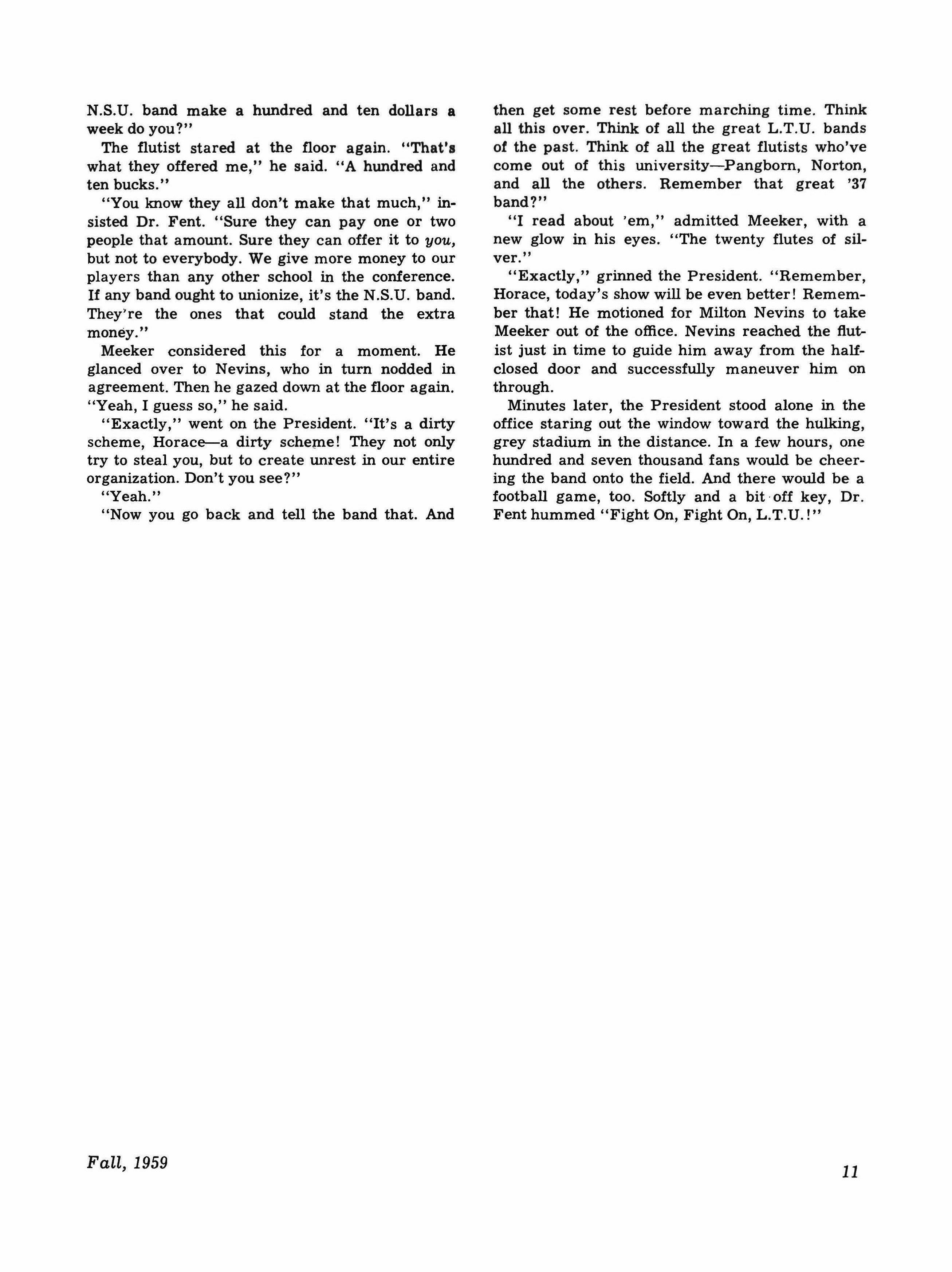
then get some rest before marching time. Think all this over. Think of all the great L.T.U. bands of the past. Think of all the great flutists who've come out of this university-Pangborn, Norton, and all the others. Remember that great '37 band?"
"I read about 'em," admitted Meeker, with a new glow in his eyes. "The twenty flutes of silver."
"Exactly," grinned the President. "Remember, Horace, today's show will be even better! Remember that! He motioned for Milton Nevins to take Meeker out of the office. Nevins reached the flutist just in time to guide him away from the halfclosed door and successfully maneuver him on through.
Minutes later, the President stood alone in the office staring out the window toward the hulking, grey stadium in the distance. In a few hours, one hundred and seven thousand fans would be cheering the band onto the field. And there would be a football game, too. Softly and a bit, off key, Dr. Fent hummed "Fight On, Fight On, L.T.U.!"
Fall,
1959
11
Clayton Long
Chester CLayton Long is an Assistant in the Department of Interpretation at Northwestern's Scnoo; of Speech, and is studying there for his doctorate.
Born in Salem County, New Jersey, in 1932, his boyhood was spent on a farm in Ohio. During the Korean War he served as an aircraft mechanic at Suwon, Korea. He attended the University of Ohio for two years, but transferred to the University of Washington to stu,dy under Roethke. (Because of Long's farm background, Roethke called him "the last of the pLoughboys.") Upon his graduation in 1957 he received a Woodrow Witson Fellowship, elected to study ora; interpretation at Northwestern, and received the master's degree from the School. of Speech in 1958. Last year he was Lecturer in the Department of Speech at the University of CaLifornia in Berkeieu, He has pubLished a number of poems in Occident and is currently preparing a volume of poetry to be entitled This Running Sleep.
POEMS FROM THIS RUNNING SLEEP
Poetry (Credo)
This music, violent within the skull, Is the source of empires of opal.
Take the immediate vision of the wren Twinkling in the rain, the Saracen
Jay, touching all the air into chaos: Opals of sight and sound, glorious, Various, fire-note sounds eluding, taunting The brain's olfactory organs of singing.
It is all "a taste in the head," Burke Says; Whistler, "arrangement is our work."
In the dark counties of the agate's moss I meet those fabulous birds where loss
Is only an ordinary word, unless Opals are mined from its hard singleness.
The Fall
Suwon, Korea: 1952-Athens, Ohio: 1955.
It staggered gracefully, as though well rehearsed, And then some giant fist punched it into earth. The body of my body rocked a moment; Vision reassembled itself from shocked pieces Of blue, silver, and unopened parachute.
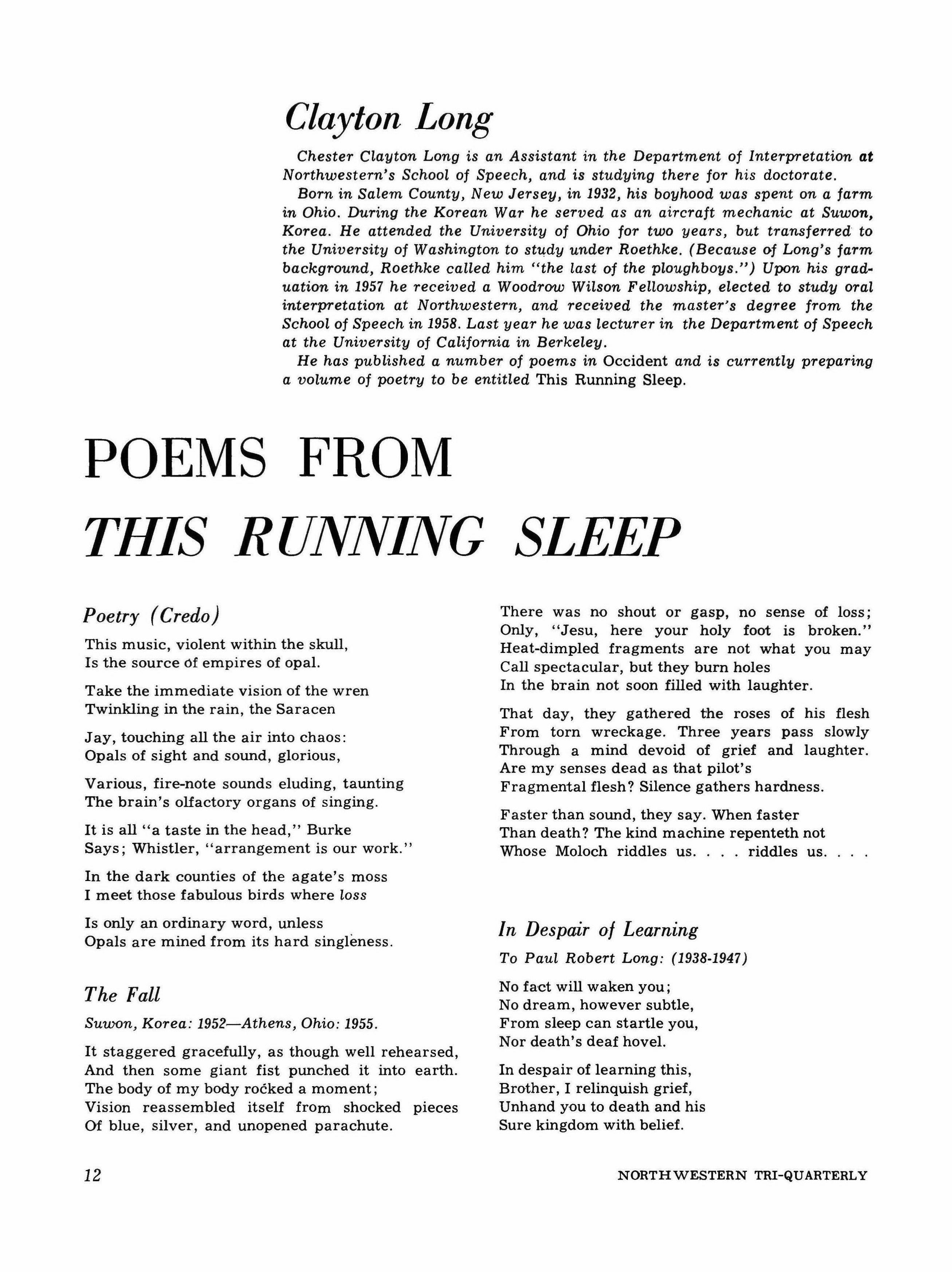
There was no shout or gasp, no sense of loss; Only, "Jesu, here your holy foot is broken." Heat-dimpled fragments are not what you may Call spectacular, but they burn holes In the brain not soon filled with laughter.
That day, they gathered the roses of his flesh From torn wreckage. Three years pass slowly Through a mind devoid of grief and laughter. Are my senses dead as that pilot's Fragmental flesh? Silence gathers hardness.
Faster than sound, they say. When faster Than death? The kind machine repenteth not Whose Moloch riddles us riddles us.
In Despair 01 Learning
To Paul Robert Long: (1938-1947)
No fact will waken YOUj No dream, however subtle, From sleep can startle you, Nor death's deaf hovel.
In despair of learning this, Brother, I relinquish grief, Unhand you to death and his Sure kingdom with belief.
12 NORTHWESTERN TRI-QUARTERLY
Patroclus, Paul, what matter The name in a universal Cry, one brother, or another? Death's gain is final.
And fool, like all men, all, As vain and pompous in sorrow, I repeat death's final gall, Who would embrace your shadow.
You are dead, like all dead, Removed and stern in death, Who turn deaf ears to the dread, Insurmountable pain of breath.
Animal
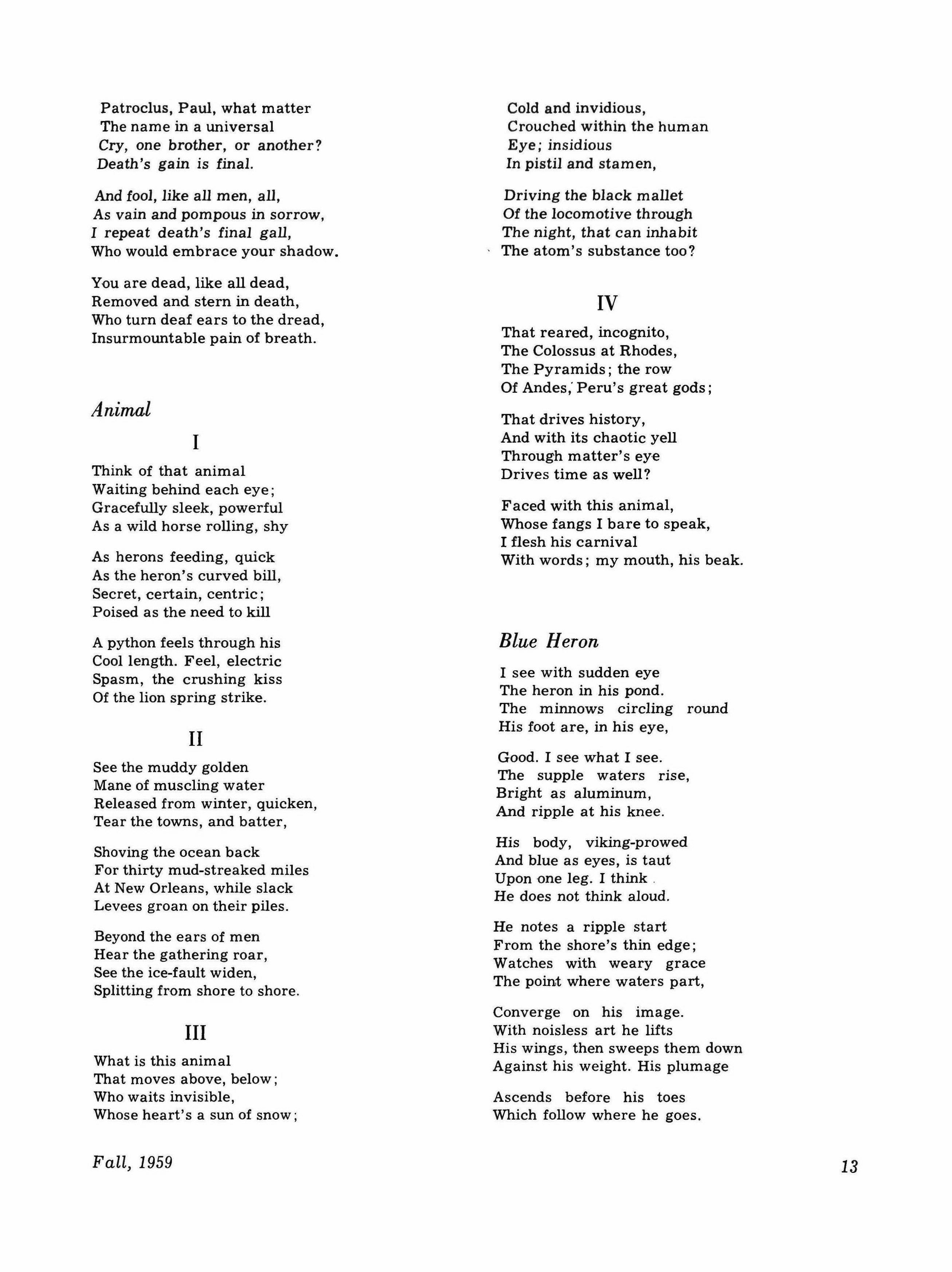
ICold and invidious, Crouched within the human Eye; insidious In pistil and stamen,
Driving the black mallet Of the locomotive through The night, that can inhabit The atom's substance too?
IV
That reared, incognito, The Colossus at Rhodes, The Pyramids; the row Of Andes; Peru's great gods;
That drives history, And with its chaotic yell Through matter's eye Drives time as well? Think of that animal Waiting behind each eye; Gracefully sleek, powerful As a wild horse rolling, shy
As herons feeding, quick As the heron's curved bill, Secret, certain, centric; Poised as the need to kill
A python feels through his Cool length. Feel, electric Spasm, the crushing kiss Of the lion spring strike.
II
See the muddy golden Mane of muscling water
Released from winter, quicken, Tear the towns, and batter,
Shoving the ocean back For thirty mud-streaked miles At New Orleans, while slack Levees groan on their piles.
Beyond the ears of men
Hear the gathering roar, See the ice-fault widen, Splitting from shore to shore.
III
What is this animal
That moves above, below; Who waits invisible, Whose heart's a sun of snow;
Faced with this animal, Whose fangs I bare to speak, I flesh his carnival With words; my mouth, his beak.
Blue Heron
I see with sudden eye The heron in his pond. The minnows circling round His foot are, in his eye,
Good. I see what I see. The supple waters rise, Bright as aluminum, And ripple at his knee.
His body, viking-prowed And blue as eyes, is taut Upon one leg. I think. He does not think aloud.
He notes a ripple start From the shore's thin edge; Watches with weary grace The point where waters part,
Converge on his image. With noisless art he lifts His wings, then sweeps them down Against his weight. His plumage
Ascends before his toes Which follow where he goes.
Fall,
13
1959
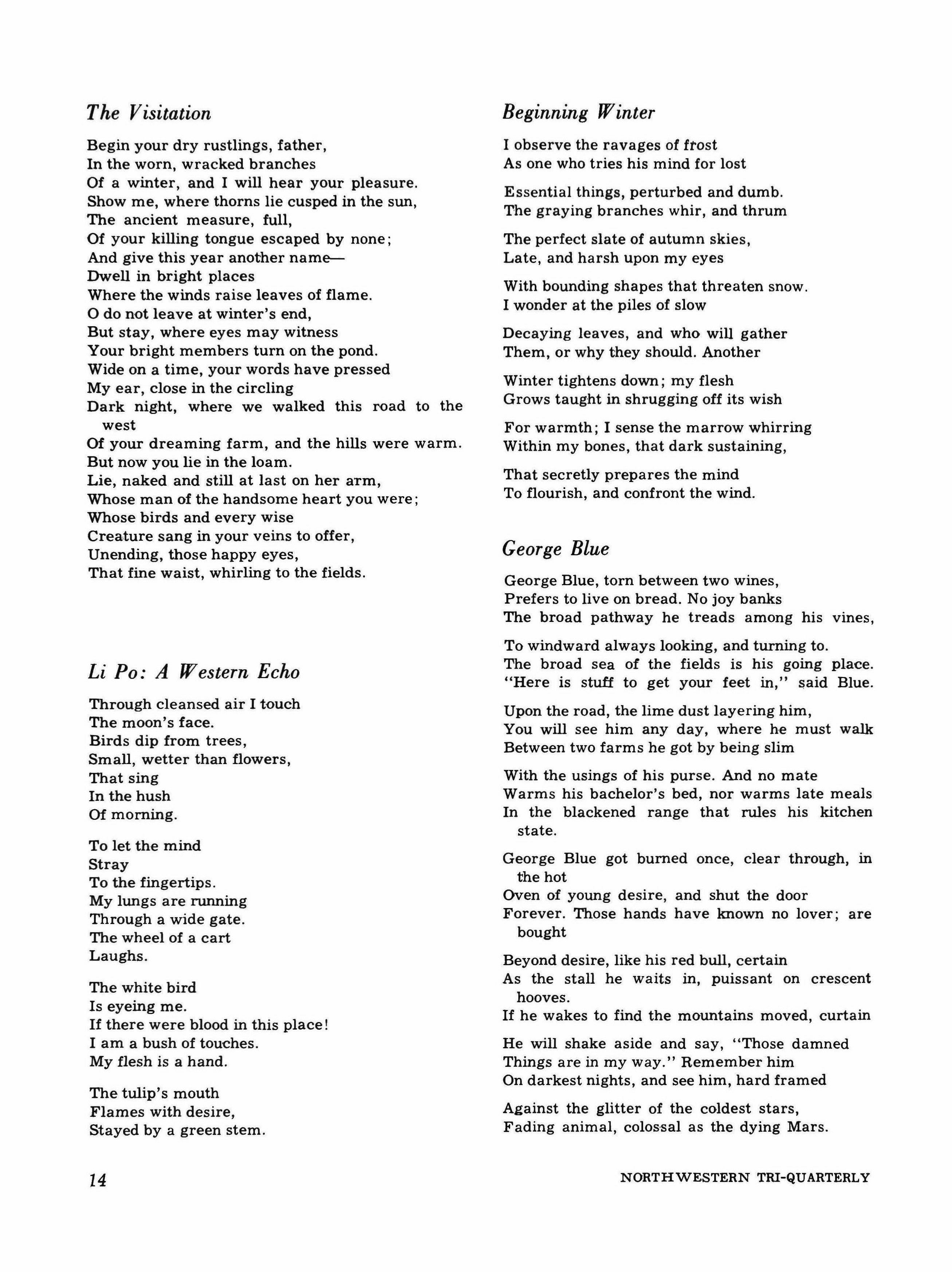
The Visitation
Begin your dry rustlings, father, In the worn, wracked branches
Of a winter, and I will hear your pleasure. Show me, where thorns lie cusped in the sun, The ancient measure, full, Of your killing tongue escaped by none; And give this year another nameDwell in bright places Where the winds raise leaves of flame. o do not leave at winter's end, But stay, where eyes may witness Your bright members turn on the pond. Wide on a time, your words have pressed My ear, close in the circling Dark night, where we walked this road to the west
Of your dreaming farm, and the hills were warm.
But now you lie in the loam. Lie, naked and still at last on her arm, Whose man of the handsome heart you were; Whose birds and every wise Creature sang in your veins to offer, Unending, those happy eyes, That fine waist, whirling to the fields.
Li Po: A Western Echo
Through cleansed air I touch The moon's face.
Birds dip from trees, Small, wetter than flowers, That sing In the hush Of morning.
To let the mind Stray To the fingertips. My lungs are running Through a wide gate. The wheel of a cart Laughs.
The white bird Is eyeing me. If there were blood in this place! I am a bush of touches. My flesh is a hand.
The tulip's mouth
Flames with desire, Stayed by a green stem.
Beginning Winter
I observe the ravages of ftost
As one who tries his mind for lost
Essential things, perturbed and dumb. The graying branches whir, and thrum
The perfect slate of autumn skies, Late, and harsh upon my eyes
With bounding shapes that threaten snow. I wonder at the piles of slow
Decaying leaves, and who will gather Them, or why they should. Another
Winter tightens down; my flesh Grows taught in shrugging off its wish
For warmth; I sense the marrow whirring Within my bones, that dark sustaining, That secretly prepares the mind To flourish, and confront the wind.
George Blue
George Blue, torn between two wines, Prefers to live on bread. No joy banks
The broad pathway he treads among his vines, To windward always looking, and turning to. The broad sea of the fields is his going place. "Here is stuff to get your feet in," said Blue.
Upon the road, the lime dust layering him, You will see him any day, where he must walk Between two farms he got by being slim
With the usings of his purse. And no mate Warms his bachelor's bed, nor warms late meals In the blackened range that rules his kitchen state.
George Blue got burned once, clear through, in the hot
Oven of young desire, and shut the door Forever. Those hands have known no lover; are bought
Beyond desire, like his red bull, certain As the stall he waits in, puissant on crescent hooves.
If he wakes to find the mountains moved, curtain
He will shake aside and say, "Those damned Things are in my way." Remember him
On darkest nights, and see him, hard framed
Against the glitter of the coldest stars, Fading animal, colos-sal as the dying Mars.
NORTHWESTERN TRI-QUARTERLY
14
Leften S. Staorianos
Professor of History at Northwestern, Lejten S. Stavrianos is an internationally known authority on the Batkans, In recent years the focus of his interests has turned upon the interpretation of contemporary worLd civiLization in historical perspective. Through the courtesy of grants fro.m the Carnegie Corporation of New York, he is currentLy on Leave preparing a book, and a new course to be presented next year: World History in Modern Times, a systematic analysis, from a global viewpoint, of the historical evolution of the modern world. His essay for THE TIu-QUARTERLY is a welcome reveLation of his work.
Born in Vancouver, he attended the University of British CoLumbia (B.A. 1933) and received his graduate degrees from CLark University (M.A. 1934, Ph.D. 1937). He taught for a year at Queens University, was a travelLing feLlow Of the Royal Society of Canada in 1938,. taught at Smith College, and in 1946 came to Northwestern. He was awarded a Guggenheim Fellowship, 1950-51, and a Ford Foundation Grant, 1953-54. His interest in the Balkans has Zed to his acting as consultant and technicaL advisor in the making of a number of documentary fiLms.
He has pubLished extensively on a diversity of subjects. His books include his Balkan Federation: Movements Toward Balkan Unity in Modern Times (1944); Greece: American Dilemma and Opportunity (1952); The Balkans Since 1453 (1958); and Ottoman Empire: Sick Man of Europe? (1957).
IS AMERICA READY
F'OR THE NEW AGE?
DISTURBED ABOUT HIS JOB, his future, his children, his social status or his old age, the average American probably feels that he has more than his share of worries. Personal problems have a way of being uppermost in all of our minds. The attitude of "Let the President worry about the missiles, let the State Department worry about foreign policy," is perhaps a normal one, but one that we can no longer afford.
There are problems in a democracy which can be solved only by the people themselves, by a conscious application of constructive thought on a wide scale, and today we Americans are faced with one of the gravest in our history. It is a question which will soon affect decisively our whole pattern and standard of living. It is a question raised by the new universal age of human history which we have just entered. Our future as a people and as a nation depends on the degree to which we can adjust to the demands of the new age and respond to its challenges and opportunities.
Fall, 1959
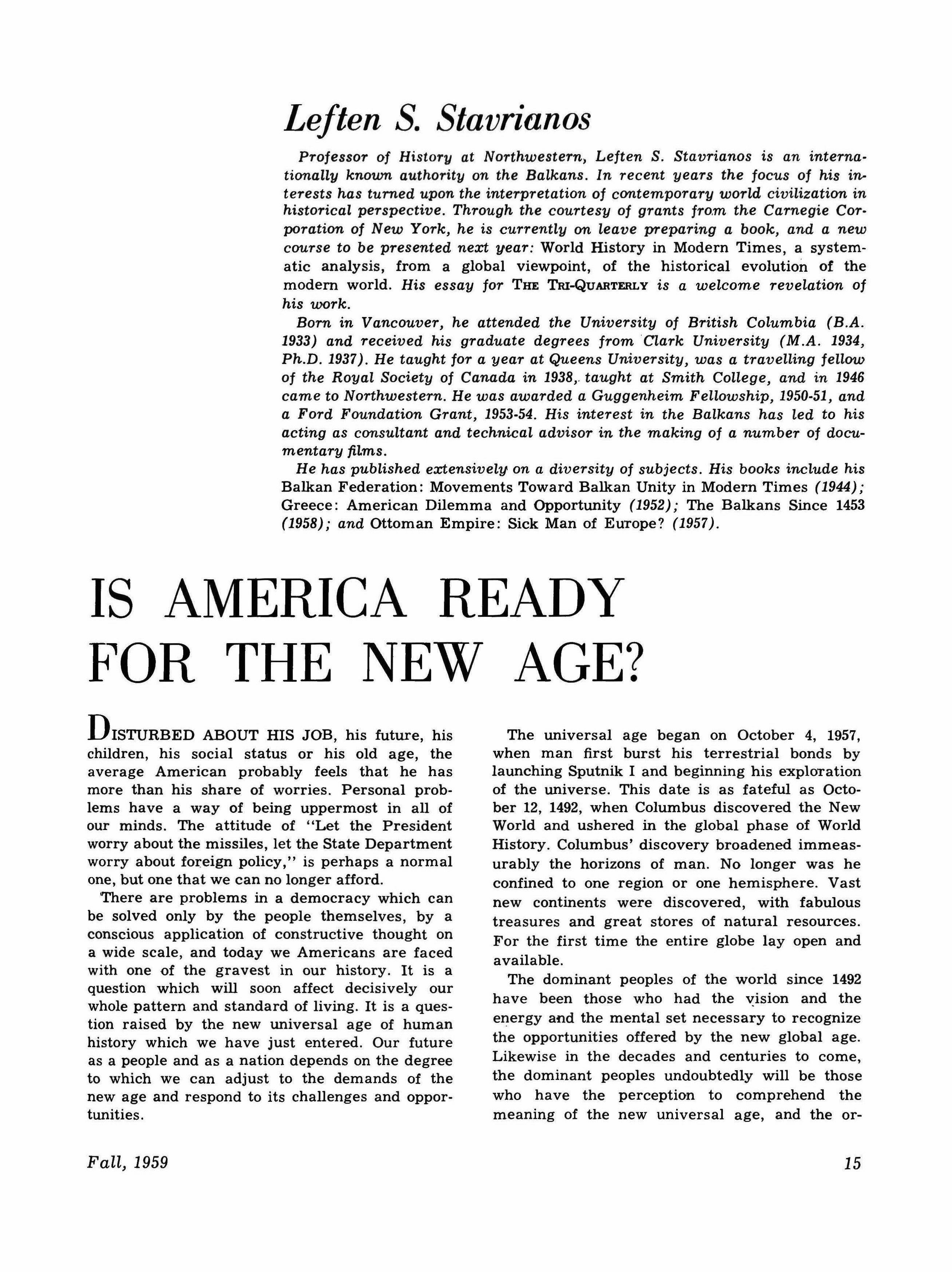
The universal age began on October 4, 1957, when man first burst his terrestrial bonds by launching Sputnik I and beginning his exploration of the universe. This date is as fateful as October 12, 1492, when Columbus discovered the New World and ushered in the global phase of World History. Columbus' discovery broadened immeasurably the horizons of man. No longer was he confined to one region or one hemisphere. Vast new continents were discovered, with fabulous treasures and great stores of natural resources. For the first time the entire globe lay open and available.
The dominant peoples of the world since 1492 have been those who had the vision and the energy and the mental set necessary to recognize the opportunities offered by the new global age. Likewise in the decades and centuries to come, the dominant peoples undoubtedly will be those who have the perception to comprehend the meaning of the new universal age, and the or-
15

ganization and techniques necessary to exploit the opportunities it offers.
The disturbing feature of this historical parallel is that when the global age began, the Spaniards and the Portuguese seemed to have had an unbeatable head start, comparable to that which we have enjoyed in the past few decades. It was the Spaniards and the Portugese who sent Columbus to the New World and da Gama around Africa to India. It was they who looted the treasures of the Aztecs and the Incas, and reaped the enormous profits of the eastern spice trade. It was their commerce and their industry that spurted ahead with the stimulus of overseas commodities and markets. And yet, within a century after Columbus, the Iberian peoples began to fall behind. The Dutch and the French and the English surpassed them in all fields-in commerce, in industry, in science and technology, and in the art of war. Inevitably Spain and Portugal were stripped of their colonial empires and sank back to the impotent obscurity from which they have never emerged.
Today the United States is in the same position as the Iberian states were in the sixteenth century. The past several decades have been our Golden Age. We are now as proud of our American way of life as the Spaniards were of their Catholic-Spanish way of life. But can we be sure that others will not surpass us, as the northwest Europeans surpassed the Iberians? A decade ago this question would have been dismissed as ridiculous nonsense. But in 1957 the Russians did shoot Sputnik I into the skies, and in 1958 two wellknown American journalists wrote a book entitled USA: Second-Class Power?
Perhaps it behooves us to find out why Spain declined and to consider seriously whether the shoe fits. One of the basic reasons for the decline was the ethos or values of Spanish society. The typical Spanish hidalgo or country squire prided himself on being a Catholic and a Spaniard, and preferred to starve on a small entailed estate than to demean his gentility by engaging in commerce or industry. Idolatry of the hidalgo was widespread, so that scorn and avoidance of remunerative work became the fashion. Thus the typical Spanish gentleman either languished in disdainful idleness or else crowded into such socially acceptable but economically unproductive occupations as the priesthood, the bureaucracy or the military. An example of this attitude is the diatribe of the famous Spanish writer, Miguel Cervantes, against the Moslem minority, which he excoriated as "the Moorish scum." "Their one and only aim," he complained, "is to
coin money, so that, ever getting and never spending, they gain the greater part of all the money in Spain They gather up everything, they hoard everything, they devour everything."
In other words, the Moors were the "scum" because they were thrifty and hard working and commercially-minded. And so the Spaniards drove the despised Moors out of the country, as they did also the Jews who had the same unfortunate habits. But it was precisely those habits, or values, that were shared also by the northwestern Europeans, and that enabled them to drive ahead to world domination. The patriciate of Holland and the nobility of England and of France were always ready to participate in any enterprise that promised to yield profits. Success in business was not a social stigma in northwestern Europe; rather it was the means to social acceptance and to political power. In striking contrast to the remarks of Cervantes, the English writer, Daniel Defoe, wrote in 1726: "Trade in England makes gentlemen, and has peopled this nation with gentlemen; for the tradesman's children, or at least their grandchildren, come to be as good gentlemen, statesmen, Parliament men, privy councillors, judges, bishops and noblemen, as those of the highest birth and the most ancient families."
It was this set of mind that enabled the northwest Europeans to overtake the Iberians, to seize their empires, and to remain the masters of the world until the twentieth century. They won out fundamentally because their values and their social structures proved to be better suited to the demands of the global age. The conquest and the efficient exploitation of the globe were beyond the powers of the hidalgo with his quixotic romanticism. This task called for the northwestern merchant with his acquisitiveness, individualism, industry and frugality. These were the qualities that made possible the winning of the great colonial empires in the East, the taming of the wilderness in the New World, and the unprecedented achievements of the Industrial Revolution. And these are the values that underlie our own society-that comprise the essence of our so-called American way of life.
The question we must now face squarely is whether these values that made us great yesterday and today, are appropriate for tomorrow? Are the qualities that proved so effective in the global age also effective for the universal age? And if they are not, are we willing and able to make the changes in our traditional ways of thinking and doing things which may be necessary for our survival as a vital and viable society?
To answer these questions we need to consider
16
NORTHWESTERN TRI-QUARTERLY
the new age's characteristics and requirements. These revolve around three great revolutions that are now in progress-the revolution in the colonial world, the revolution in economic productivity, and the revolution in science and technology.
The reality and extent of the colonial revolution scarcely needs to be emphasized. Since 1939 no less than twenty-six countries have gained their independence. Many more will join the family of nations in the next few decades, particularly in the continent of Africa. This colonial revolution is also a race revolution, since the subject peoples are largely colored, and the imperial powers mostly European. This means that race discrimination is as anachronistic in the new universal age as is the old-fashioned imperialism of the nineteenth century. It is anachronistic for at least three good reasons. One is that science has demolished the myth of inferior and superior races upon which racism is based. Another is that race discrimination has become economically intolerable in modern industrial society. Mrs. Oveta Culp Hobby, former Secretary of Health, Education and Welfare, declared in 1954 that the cost of discrimination to the United States was between 15 and 30 billion dollars annually. "Individuals who suffer discrimination," she explained, "cannot be full partners in an economy of plenty. They cannot afford to purchase their share of the goods we produce nor pay their potential share of taxes for the common good." Finally race discrimination has become politically untenable in a world of awakening colonial peoples. Incidents in Little Rock or Birmingham or Clinton are no longer exclusively our concern. Colored peoples throughout the world, who comprise two thirds of the human race, react indignantly in the same manner that Americans in the nineteenth century used to react against the Armenian massacres in Turkey. Indeed it is bitterly ironical that the United States, which mobilized world public opinion against the "bloody Sultan" because of the Armenian massacres, and against the Russian Tsar because of the maltreatment of Jews, is now in turn viewed by so many as a land of racist arrogance and lynch law.
Of course we have made much progress towards eliminating discrimination, particularly since World War II. The poll tax has been abolished in all but five states; the Supreme Court has ruled against segregation in housing, education, and interstate travel; and the Negroes have been able to obtain many types of work formerly reserved exclusively for whites.
Yet the fact remains that we still have far to go before all American citizens have equal rights in
fact as well as in theory. It is relevant to note here that on January 1, 1963, we will celebrate one hundred years of emancipation. A century is a long time for emancipation to remain unfinished. And those of us who are inclined to drag our feet and to talk about moving too fast, might reflect on the following warning by the distinguished British author, Barbara Ward:
At present, most Westerners think of the race problem as being primarily one of whether men and women of African stock - in Africa or the United States - can achieve full equality ot" status. But this definition is probably already outdated. The question is no longer whether Africans can achieve equality. It is becoming the wider query whether men and women of white color shall lose it. There is no certainty that mankind will, after three hundred years of white dominance, move safely to race equality.
The second revolution that comprises our universal age is the fantastic acceleration in economic productivity. On two other occasions man has made great spurts forward as a producer. The first was some nine thousand years ago when he learned to grow his food and thereby became a food producer rather than a mere food collector. The second was about two hundred years ago when man developed steam power and labor-saving machines of various types. This Industrial Revolution, as it is commonly called, was responsible for a seven-fold increase in the world's industrial production between 1860 and 1914. But even this spurt will be surpassed in our own day with the application of automation, electronics and nuclear power.
The question at this point is whether the United States will be able to keep up with the accelerating rate of technological and economic change. During the past several decades we have not only held our own but we have set the pace. Over the seventy-five years before World War II we doubled our national output every twenty-four years. Since World War II we have been growing at a faster pace, which promises to double our output every eighteen years. It is this leadership in economic growth that has made it possible for us to assume so prominent a role in world affairs in recent decades.
But now we come to a disturbing fact: the United States no longer is leading in rate of economic growth. In fact, we have fallen seriously behind the Soviet Union in this regard.
Item: In October 1957 Premier Khrushchev asserted: "In conditions of peace, the Soviet Union will, in a shorter period than forty years, by virtue of the rate of development of our countries, leave the United States of America far behind in
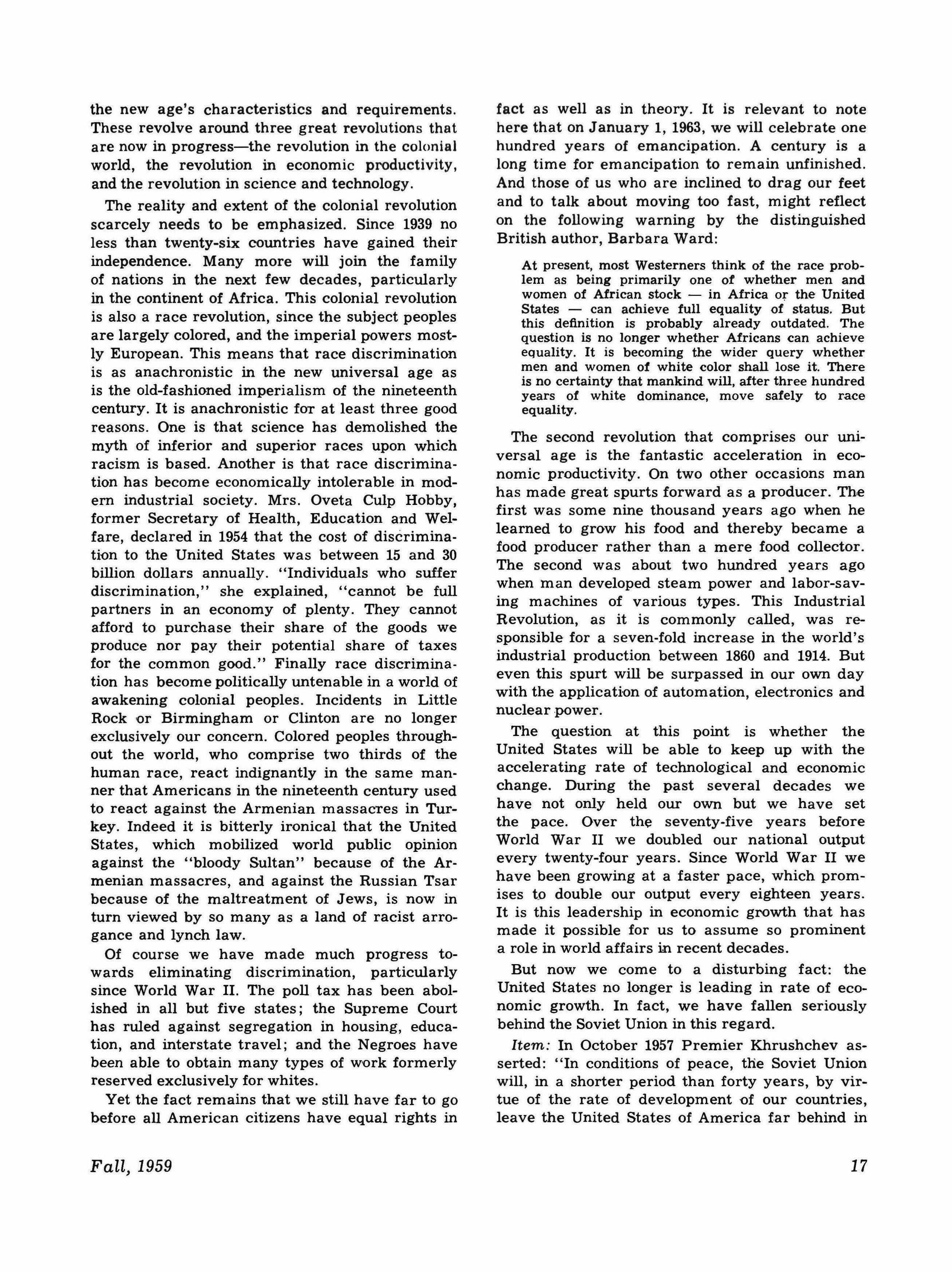
Fall, 1959
17
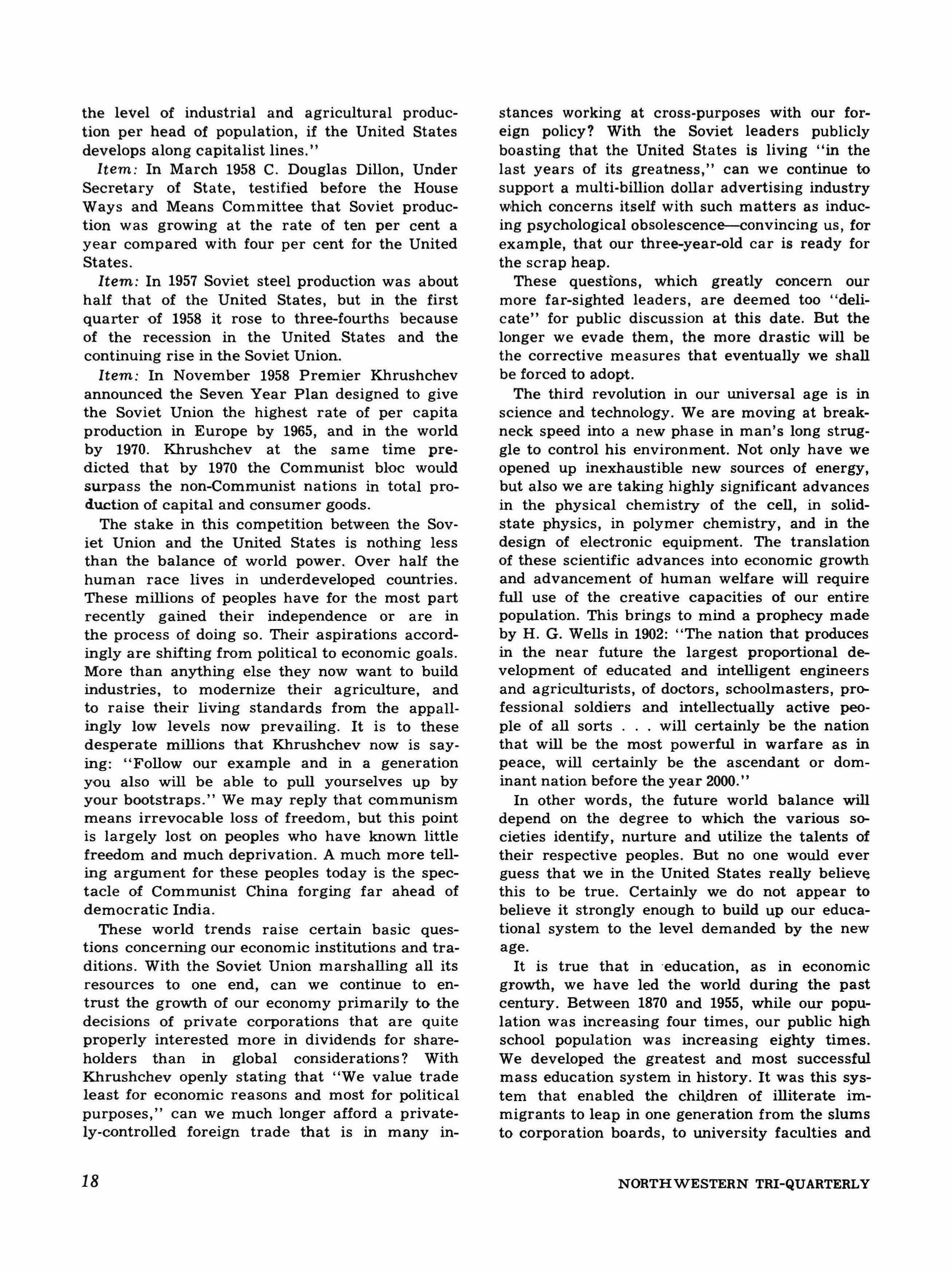
the level of industrial and agricultural production per head of population, if the United States develops along capitalist lines."
Item: In March 1958 C. Douglas Dillon, Under Secretary of State, testified before the House Ways and Means Committee that Soviet production was growing at the rate of ten per cent a year compared with four per cent for the United States.
Item: In 1957 Soviet steel production was about half that of the United States, but in the first quarter of 1958 it rose to three-fourths because of the recession in the United States and the continuing rise in the Soviet Union.
Item: In November 1958 Premier Khrushchev announced the Seven Year Plan designed to give the Soviet Union the highest rate of per capita production in Europe by 1965, and in the world by 1970. Khrushchev at the same time predicted that by 1970 the Communist bloc would surpass the non-Communist nations in total production of capital and consumer goods.
The stake in this competition between the Soviet Union and the United States is nothing less than the balance of world power. Over half the human race lives in underdeveloped countries. These millions of peoples have for the most part recently gained their independence or are in the process of doing so. Their aspirations accordingly are shifting from political to economic goals. More than anything else they now want to build industries, to modernize their agriculture, and to raise their living standards from the appallingly low levels now prevailing. It is to these desperate millions that Khrushchev now is saying: "Follow our example and in a generation you also will be able to pull yourselves up by your bootstraps." We may reply that communism means irrevocable loss of freedom, but this point is largely lost on peoples who have known little freedom and much deprivation. A much more telling argument for these peoples today is the spectacle of Communist China forging far ahead of democratic India.
These world trends raise certain basic questions concerning our economic institutions and traditions. With the Soviet Union marshalling all its resources to one end, can we continue to entrust the growth of our economy primarily to the decisions of private corporations that are quite properly interested more in dividends for shareholders than in global considerations? With Khrushchev openly stating that "We value trade least for economic reasons and most for political purposes," can we much longer afford a privately-controlled foreign trade that is in many in-
stances working at cross-purposes with our foreign policy? With the Soviet leaders publicly boasting that the United States is living "in the last years of its greatness," can we continue to support a multi-billion dollar advertising industry which concerns itself with such matters as inducing psychological obsolescence-convincing us, for example, that our three-year-old car is ready for the scrap heap.
These questions, which greatly concern our more far-sighted leaders, are deemed too "delicate" for public discussion at this date. But the longer we evade them, the more drastic will be the corrective measures that eventually we shall be forced to adopt.
The third revolution in our universal age is in science and technology. We are moving at breakneck speed into a new phase in man's long struggle to control his environment. Not only have we opened up inexhaustible new sources of energy, but also we are taking highly significant advances in the physical chemistry of the cell, in solidstate physics, in polymer chemistry, and in the design of electronic equipment. The translation of these scientific advances into economic growth and advancement of human welfare will require full use of the creative capacities of our entire population. This brings to mind a prophecy made by H. G. Wells in 1902: "The nation that produces in the near future the largest proportional development of educated and intelligent engineers and agriculturists, of doctors, schoolmasters, professional soldiers and intellectually active people of all sorts will certainly be the nation that will be the most powerful in warfare as in peace, will certainly be the ascendant or dominant nation before the year 2000.
In other words, the future world balance will depend on the degree to which the various societies identify, nurture and utilize the talents of their respective peoples. But no one would ever guess that we in the United States really believe this to be true. Certainly we do not appear to believe it strongly enough to build up our educational system to the level demanded by the new age.
It is true that in ·education, as in economic growth, we have led the world during the past century. Between 1870 and 1955, while our population was increasing four times, our public high school population was increasing eighty times. We developed the greatest and most successful mass education system in history. It was this system that enabled the children of illiterate immigrants to leap in one generation from the slums to corporation boards, to university faculties and
18
NORTHWESTERN TRI-QUARTERLY
to the professions. It was this system that provided the essence of the American dream, and made the United States stand throughout the world as the utopia of the common man.
But in this field of education, also, there are today many disturbing signs that we are not holding our own.
Item: We spend about seven-tenths of one per cent of our gross national product on higher education; the Soviets spend more than two per cent of their gross.
Item: Today we are short 150,000 public school teachers, and in the next ten years we shall be short 50,000 college instructors. By contrast, Dr. Alvin C. Eurich, Vice President and Director of the Ford Fund for the Advancement of Education, reported in 1958, following a visit in the Soviet Union, that, "Russia has no teacher shortage. At the university level, budgetary provisions are made automatically to provide one teacher for every ten students. The great prestige and high income make teaching at the university level especially attractive so there is no need to urge students to enter this profession or to assign them authoritatively to this type of work."
Item: In the fall of 1957 we were short of 142,000 public school classrooms, and there were 1,943,000 pupils in excess of "normal" classroom capacity. But in the preceding year, 1956, the United States had spent $27 billion on automobiles and their upkeep, $15 billion on smoking and drinking, and $10 billion on advertising, compared to $15.5 billion on public and private education, $0.6 billion on books, and $0.5 billion on basic research.
This shortage of money and teachers and classrooms presents a formidable problem, but it is not so formidable and basic as the lack of conviction and of values in our educational system and in our entire society. Indeed it is this absence of conviction and of values in society that is largely responsible for the plight of education. We are here touching upon what is perhaps the central problem of our society. It is a problem that manifests itself in various ways. One is anti-intellectualism-scorn for the "egghead." The term "egghead" is revealing in itself. What other people have coined words to suggest that interest in things of the mind is somehow reprehensible? This attitude was understandable during our frontier days when the man who could do things with his hands was, quite properly, highly valued. But today anti-intellectualism has become a stale and insufferable joke. Our own Alfred North Whitehead has warned us that, "In the conditions of modern life, the rule is absolute: the race which does not value trained in-
telligence is doomed." And yet Senator George D. Aiken of Vermont recently asked derisively, "Who would want to see the Senate of the United States run by ninety-six Phi Beta Kappas?"
Another manifestation of the malaise of our society is the high incidence of mental disease and of juvenile delinquency. One out of every sixteen Americans suffers from a mental or an emotional disorder. One in every twelve of our children will go to a mental hospital sometime during his life for treatment of severe mental illness. Between 1948 and 1954, juvenile court cases increased seventy per cent, although there was only sixteen per cent increase in the number of children who were of juvenile court age. And if the nation's delinquency rate continues upward at this rate, over one million children will appear before juvenile courts in 1965.
The paradoxical feature of this growing mental illness and juvenile delinquency is that they are occurring in a period of unparalleled prosperity. By and large, adults are not worrying themselves sick because of unemployment, and children are not going astray because of deprivation at home.
What, then, is the root of this spreading demoralization? The answer is that our society lacks direction, cohesion and purposefulness. It is a society that pampers the individual in his material needs but ignores his equally important emotional needs. The individual is assured employment when he is fit, compensation if he is injured, insurance if he falls ill, and a pension when he becomes old. And yet the individual does not feel that he counts as an individual. He does not feel a sense of participation-of ego involvement. He has money in his pocket but he has nowhere to go.
The "Rockefeller Report" on education (Pursuit of Exceltence) recently emphasized this point in a passage that deserves to be read and pondered by every American:
The characteristic picture of the citizen-as-consumer has taken a firm grip on the national imagination; and the consumer is, almost by definition, a creature devoted to self-gratification. He must be constantly and ingeniously served milder cigarettes, softer mattresses, and easier driving cars. If his dollars are to continue flowing, he must be endlessly catered to, soothed, anointed, protected, healed, cajoled, and generally babied. Add to this the fact that we get on with delegates of various sorts; and that whether these are congressmen serving their constituents, corporation executives representing their stockholders, labor leaders serving union members, or lobbyists representing their various employers, they are all committed to protecting and nourishing the interests of those by whose sufferance they hold their posts. It is their professional role to be selfish
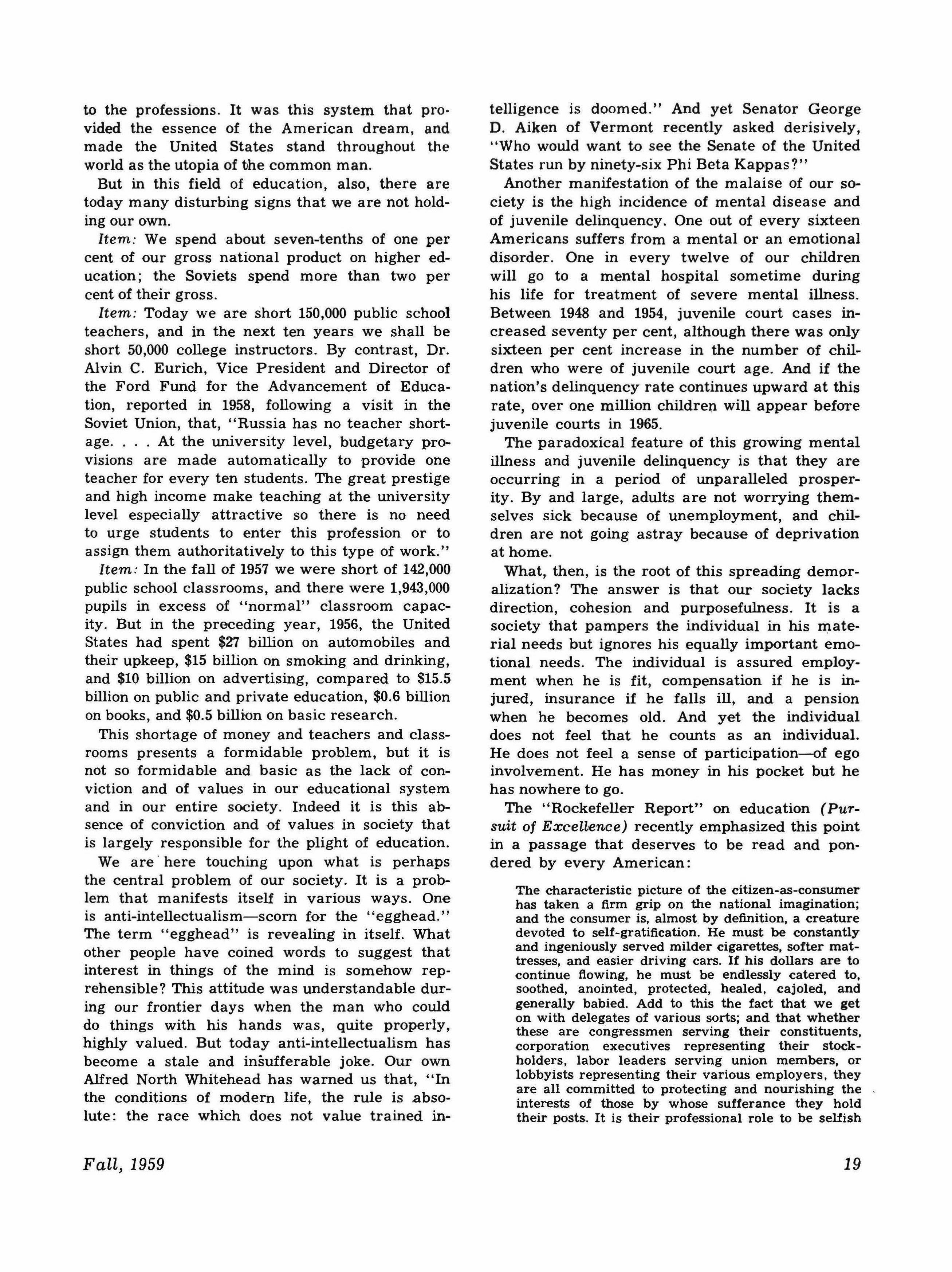
Fall, 1959
19
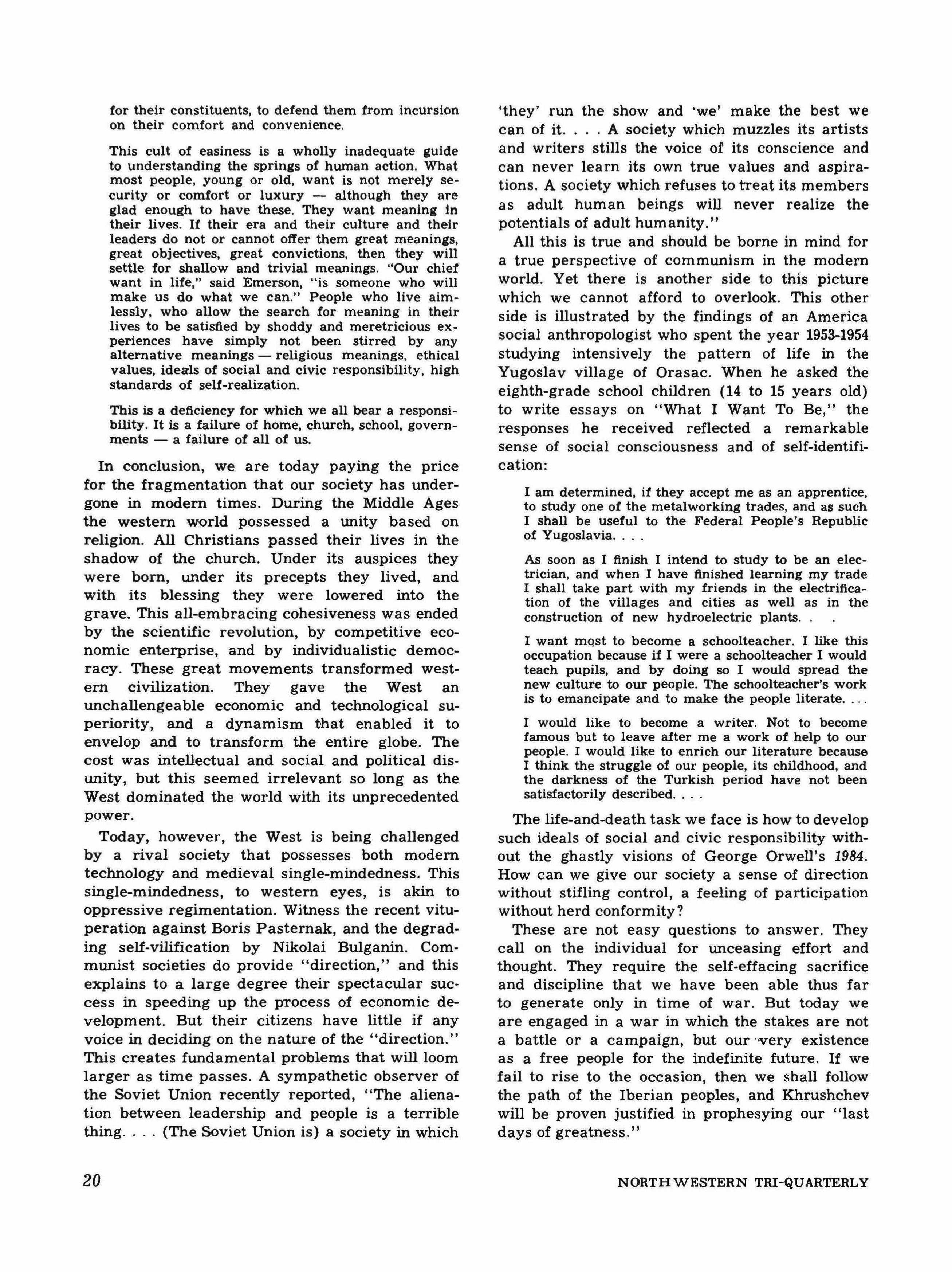
for their constituents, to defend them from incursion on their comfort and convenience.
This cult of easiness is a wholly inadequate guide to understanding the springs of human action. What most people, young or old, want is not merely security or comfort or luxury - although they are glad enough to have these. They want meaning in their lives. If their era and their culture and their leaders do not or cannot offer them great meanings, great objectives, great convictions, then they will settle for shallow and trivial meanings. "Our chief want in life," said Emerson, "is someone who will make us do what we can." People who live aimlessly, who allow the search for meaning in their lives to be satisfied by shoddy and meretricious experiences have simply not been stirred by any alternative meanings - religious meanings, ethical values, ideals of social and civic responsibility. high standards of self-realization.
This is a deficiency for which we all bear a responsibility. It is a failure of home, church, school, governments - a failure of all of us.
In conclusion, we are today paying the price for the fragmentation that our society has undergone in modern times. During the Middle Ages the western world possessed a unity based on religion. All Christians passed their lives in the shadow of the church. Under its auspices they were born, under its precepts they lived, and with its blessing they were lowered into the grave. This all-embracing cohesiveness was ended by the scientific revolution, by competitive economic enterprise, and by individualistic democracy. These great movements transformed western civilization. They gave the West an unchallengeable economic and technological superiority, and a dynamism that enabled it to envelop and to transform the entire globe. The cost was intellectual and social and political disunity, but this seemed irrelevant so long as the West dominated the world with its unprecedented power.
Today, however, the West is being challenged by a rival society that possesses both modern technology and medieval single-mindedness. This single-mindedness, to western eyes, is akin to oppressive regimentation. Witness the recent vituperation against Boris Pasternak, and the degrading self-vilification by Nikolai Bulganin. Communist societies do provide "direction," and this explains to a large degree their spectacular success in speeding up the process of economic development. But their citizens have little if any voice in deciding on the nature of the "direction." This creates fundamental problems that will loom larger as time passes. A sympathetic observer of the Soviet Union recently reported, "The alienation between leadership and people is a terrible thing (The Soviet Union is) a society in which
'they' run the show and 'we' make the best we can of it A society which muzzles its artists and writers stills the voice of its conscience and can never learn its own true values and aspirations. A society which refuses to treat its members as adult human beings will never realize the potentials of adult humanity."
All this is true and should be borne in mind for a true perspective of communism in the modern world. Yet there is another side to this picture which we cannot afford to overlook. This other side is illustrated by the findings of an America social anthropologist who spent the year 1953-1954 studying intensively the pattern of life in the Yugoslav village of Orasac. When he asked the eighth-grade school children (14 to 15 years old) to write essays on "What I Want To Be," the responses he received reflected a remarkable sense of social consciousness and of self-identification:
I am determined, if they accept me as an apprentice, to study one of the metalworking trades, and as such I Shall be useful to the Federal People's Republic of Yugoslavia.
As soon as I finish I intend to study to be an electrician, and when I have finished learning my trade I shall take part with my friends in the electrification of the villages and cities as well as in the construction of new hydroelectric plants.
I want most to become a schoolteacher. I like this occupation because if I were a schoolteacher I would teach pupils, and by doing so I would spread the new culture to our people. The schoolteacher'S work is to emancipate and to make the people literate
I would like to become a writer. Not to become famous but to leave after me a work of help to our people. I would like to enrich our literature because I think the struggle of our people, its childhood, and the darkness of the Turkish period have not been satisfactorily described
The life-and-death task we face is how to develop such ideals of social and civic responsibility without the ghastly visions of George Orwell's 1984. How can we give our society a sense of direction without stifling control, a feeling of participation without herd conformity?
These are not easy questions to answer. They call on the individual for unceasing effort and thought. They require the self-effacing sacrifice and discipline that we have been able thus far to generate only in time of war. But today we are engaged in a war in which the stakes are not a battle or a campaign, but our -very existence as a free people for the indefinite future. If we fail to rise to the occasion, then we shall follow the path of the Iberian peoples, and Khrushchev will be proven justified in prophesying our "last days of greatness."
20
NORTHWESTERN TRI-QUARTERLY
Robert Norman Hyland
Ro�ert Norman Hyland is a senior in the CoUege of Liberal Arts at Northwestern. He is .majoring in English Composition and is taking the pre-medical course. He hopes to attend medical school either at Northwestern or the University of Chicago.
Born in Chicago, he attended North Park Academy. At Northwestern he served as secretary in his junior year for the Interfraternity Council, was elected to both the junior and senior honorary societies (Norleggama and Deru] and is a student editor of THE TRI-QUARTERLY.
COOLER ON THE BRIDGE
ELLET AND ROTH had walked silently along the railroad tracks from Granite Junction for twenty minutes. The buzzing of hidden cicadas was the only sound penetrating the burning afternoon. Ahead of them stretched the baking roadbed; wiggling heat currents rose slowly from the crushed rock under the ties. Farther up the mountain the swath of the tracks was visible through the breaks in the big pines. The cabin was only about 1500 feet above the town but the only practicable way to get there was along the gradually ascending track, a path which, despite the miles of horizontal distance, took less time than the double-rut road through the woods. They had taken the road up twice when they brought their prospecting equipment to the cabin in the spring but even a Jeep could hardly manage the trip. Since then they had carried any needed supplies on their backs and followed the railroad up the mountain.
Roth knew Ellet well and realized that when he was down no one could make him talk; you could only wait for him to say something to you. When Ellet had answered his small talk after the bake sale with a volley of tight-jawed swear words, Roth said no more. He thought how incongruous Ellet looked sputtering his short attack with the daintily ribboned box of marzipan cookies under his arm. Remembering the Christian-faced people in the church basement they had just left, Ellet's outburst became almost humorous. Roth certainly didn't laugh at him, however, because nothing would inflame him more quickly. Beads of sweat were forming on Roth's temples and he swept them off with his forefinger.
Fall, 1959
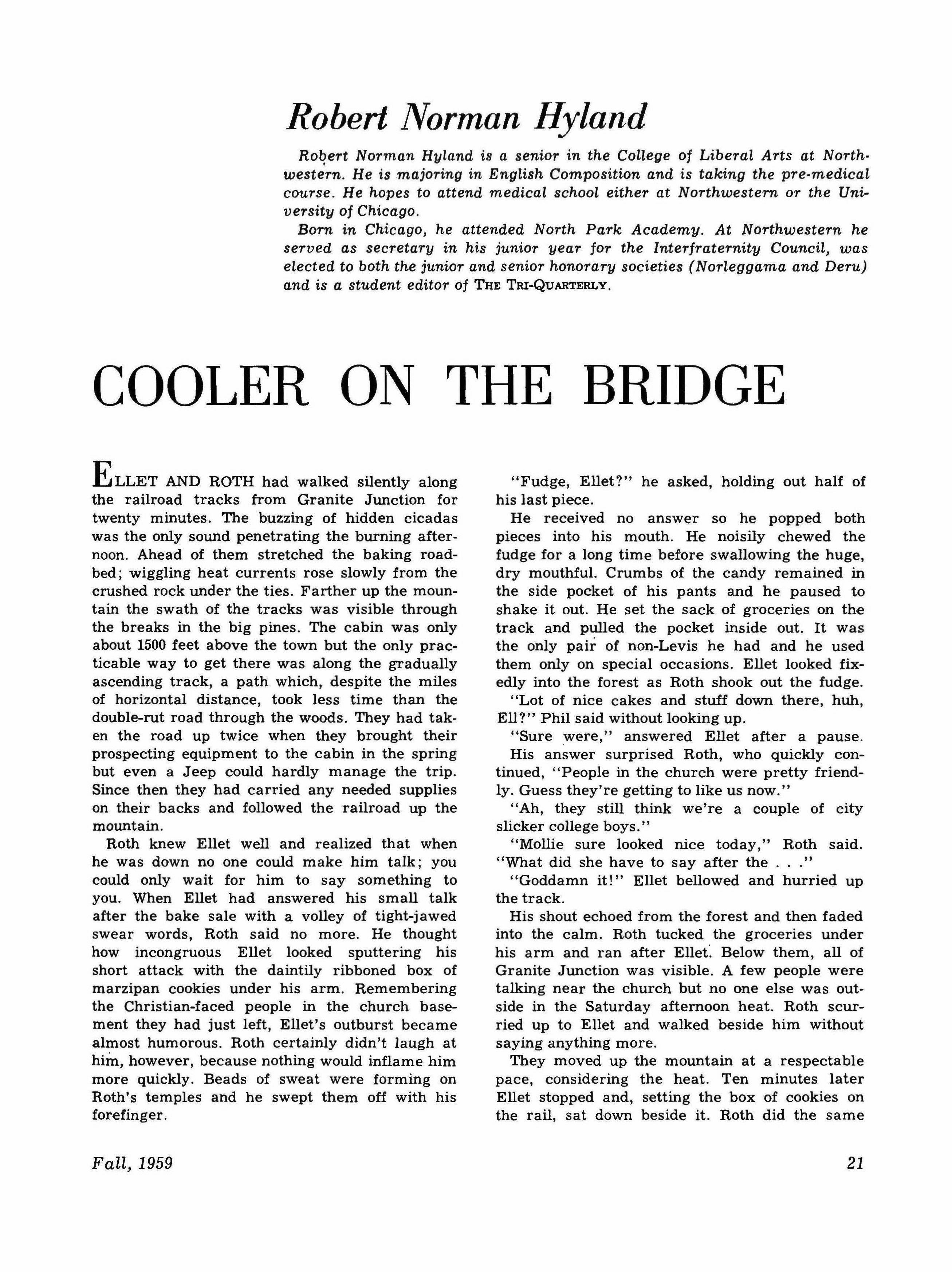
"Fudge, Ellet?" he asked, holding out half of his last piece.
He received no answer so he popped both pieces into his mouth. He noisily chewed the fudge for a long time before swallowing the huge, dry mouthful. Crumbs of the candy remained in the side pocket of his pants and he paused to shake it out. He set the sack of groceries on the track and pulled the pocket inside out. It was the only pair of non-Levis he had and he used them only on special occasions. Ellet looked fixedly into the forest as Roth shook out the fudge.
"Lot of nice cakes and stuff down there, huh, Ell?" Phil said without looking up.
"Sure were," answered Ellet after a pause.
His answer surprised Roth, who quickly continued, "People in the church were pretty friendly. Guess they're getting to like us now."
"Ah, they still think we're a couple of city slicker college boys."
"Mollie sure looked nice today," Roth said. "What did she have to say after the "Goddamn it!" Ellet bellowed and hurried up the track.
His shout echoed from the forest and then faded into the calm. Roth tucked the groceries under his arm and ran after Ellet". Below them, all of Granite Junction was visible. A few people were talking near the church but no one else was outside in the Saturday afternoon heat. Roth scurried up to Ellet and walked beside him without saying anything more.
They moved up the mountain at a respectable pace, considering the heat. Ten minutes later Ellet stopped and, setting the box of cookies on the rail, sat down beside it. Roth did the same
21
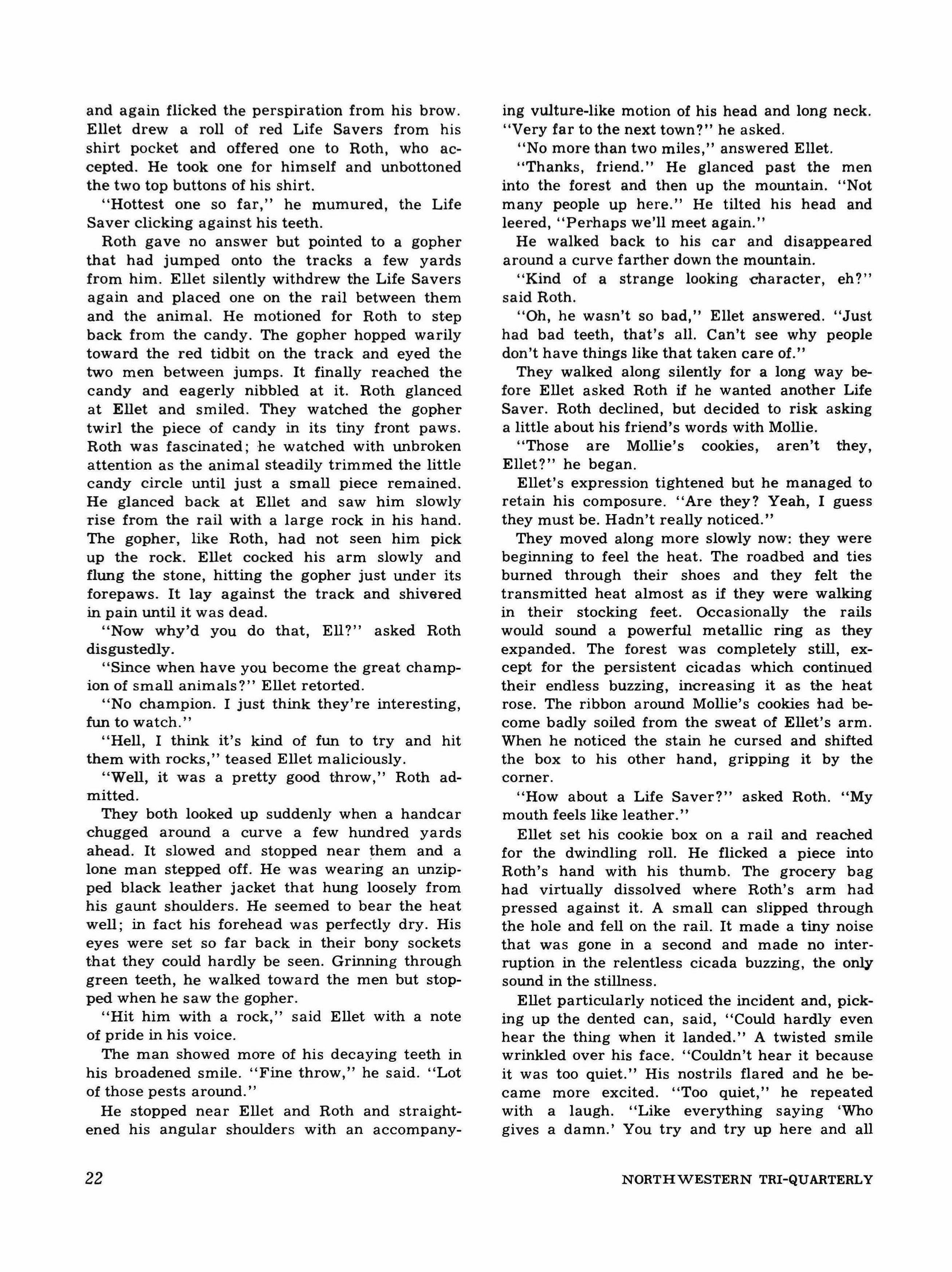
and again flicked the perspiration from his brow. Ellet drew a roll of red Life Savers from his shirt pocket and offered one to Roth, who accepted. He took one for himself and unbottoned the two top buttons of his shirt.
"Hottest one so far," he mumured, the Life Saver clicking against his teeth.
Roth gave no answer but pointed to a gopher that had jumped onto the tracks a few yards from him. Ellet silently withdrew the Life Savers again and placed one on the rail between them and the animal. He motioned for Roth to step back from the candy. The gopher hopped warily toward the red tidbit on the track and eyed the two men between jumps. It finally reached the candy and eagerly nibbled at it. Roth glanced at Ellet and smiled. They watched the gopher twirl the piece of candy in its tiny front paws. Roth was fascinated; he watched with unbroken attention as the animal steadily trimmed the little candy circle until just a small piece remained. He glanced back at Ellet and saw him slowly rise from the rail with a large rock in his hand. The gopher, like Roth, had not seen him pick up the rock. Ellet cocked his arm slowly and flung the stone, hitting the gopher just under its forepaws. It lay against the track and shivered in pain until it was dead.
"Now why'd you do that, Ell?" asked Roth disgustedly.
"Since when have you become the great champion of small animals?" Ellet retorted.
"No champion. I just think they're interesting, fun to watch."
"Hell, I think it's kind of fun to try and hit them with rocks," teased Ellet maliciously.
"Well, it was a pretty good throw," Roth admitted.
They both looked up suddenly when a handcar chugged around a curve a few hundred yards ahead. It slowed and stopped near them and a lone man stepped off. He was wearing an unzipped black leather jacket that hung loosely from his gaunt shoulders. He seemed to bear the heat well; in fact his forehead was perfectly dry. His eyes were set so far back in their bony sockets that they could hardly be seen. Grinning through green teeth, he walked toward the men but stopped when he saw the gopher.
"Hit him with a rock," said Ellet with a note of pride in his voice.
The man showed more of his decaying teeth in his broadened smile. "Fine throw," he said. "Lot of those pests around."
He stopped near Ellet and Roth and straightened his angular shoulders with an accompany-
ing vulture-like motion of his head and long neck. "Very far to the next town?" he asked.
"No more than two miles," answered Ellet. "Thanks, friend." He glanced past the men into the forest and then up the mountain. "Not many people up here." He tilted his head and leered, "Perhaps we'll meet again."
He walked back to his car and disappeared around a curve farther down the mountain.
"Kind of a strange looking character, eh?" said Roth.
"Oh, he wasn't so bad," Ellet answered. "Just had bad teeth, that's all. Can't see why people don't have things like that taken care of."
They walked along silently for a long way before Ellet asked Roth if he wanted another Life Saver. Roth declined, but decided to risk asking a little about his friend's words with Mollie.
"Those are Mollie's cookies, aren't they, Ellet?" he began.
Ellet's expression tightened but he managed to retain his composure. "Are they? Yeah, I guess they must be. Hadn't really noticed."
They moved along more slowly now: they were beginning to feel the heat. The roadbed and ties burned through their shoes and they felt the transmitted heat almost as if they were walking in their stocking feet. Occasionally the rails would sound a powerful metallic ring as they expanded. The forest was completely still, except for the persistent cicadas which continued their endless buzzing, increasing it as the heat rose. The ribbon around Mollie's cookies had become badly soiled from the sweat of Ellet's arm. When he noticed the stain he cursed and shifted the box to his other hand, gripping it by the corner.
"How about a Life Saver?" asked Roth. "My mouth feels like leather."
Ellet set his cookie box on a rail and reached for the dwindling roll. He flicked a piece into Roth's hand with his thumb. The grocery bag had virtually dissolved where Roth's arm had pressed against it. A small can slipped through the hole and fell on the rail. It made a tiny noise that was gone in a second and made no interruption in the relentless cicada buzzing, the only sound in the stillness.
Ellet particularly noticed the incident and, picking up the dented can, said, "Could hardly even hear the thing when it landed." A twisted smile wrinkled over his face. "Couldn't hear it because it was too quiet." His nostrils flared and he became more excited. "Too quiet," he repeated with a laugh. "Like everything saying 'Who gives a damn.' You try and try up here and all
22
NORTHWESTERN TRI-QUARTERLY
they say is 'Who gives a damn.' He glared at the can and gritted his teeth hissing, "Well, don't give a damn then. It won't stop me."
"It won't stop me!" he screamed so loud that his voice cracked.
The cicadas stopped. He listened to his echo trail off in the forest. Then the cicadas started again while he was still panting from the fury of his cries. He reached for the cookie box and crushed it unintentionally in his shaking hand. He closed his eyes and concentrated on being calm.
Roth had seen Ellet lose his temper before but never so completely. He followed Ellet for a few steps and then caught up and walked beside him. They pushed along silently and rounded a curve, at the end of which was a long straight section over a deep gorge. The embankment rose steadily above the surrounding forest to the glaring steel of the trestle. The forest and cicadas became more and more distant but, as if to fill the void, the heat rose to an unbearable degree. They reached the bridge only after a great deal of effort.
Ellett stumbled onto the ringing steel structure. He leaned against a beam but then quickly jumped away. "Too hot-can't even touch it."
Sweat from Roth's forehead ran into his eyes and from there to his chin and then dripped onto the rails. The droplets disappeared in a steaming hiss and there was no trace where they had' landed. He blinked the rest from his eyes and said to Ellet, "Any Life Savers left? Mouth dry."
Ellet fumbled in his shirt pocket and pulled out the almost depleted rolL He worked with his free hand to tear off the paper and push loose one piece from the end. He squeezed the roll too hard and it slipped from his wet, still trembling hand. He watched futilely as it fell towards the river at the bottom of the gorge.
The heat surrounded them: in the sun, in the steel, in the ties, in the air. They were suspended in heat with no energy left to combat it. Roth jogged his grocery sack to readjust it on his aching hip. At that instant the soggy bag broke at the bottom and cans and boxes plummeted through the steel girders below making steadily diminishing plinks as the cans hit lower and lower steel beams. Roth stared after them, making quiet noises in his quivering throat.
"Jesus," Ellet began, "out here with no one
or nothing for miles and miles and still pressed in. Confined." Then very quietly he said. "Always able to stop you."
Ellet ran his tongue over the front of his teeth. It stuck to his lips. He coughed to summon anything moist from his throat but there was nothing. Roth wiped his eyes again and stepped over to Ellet. "It's all right," he said clapping his hand weakly on his friend's shoulder. "We'll find something up inside the mountain. We're bound to, we've tried so long."
"Mollie said she didn't want to see me any more," said Ellet, completely ignoring Roth's words. "She said I was too moody, too hard to know."
He leaned carelessly over the low safety cable at the edge of the catwalk. Roth hurried over to him and grabbed his shoulder, squeezing it gently.
"Everyone crabby when it's hot. Change by next week. Wait and see."
He smiled a weakling smile and looked into Ellet's face with cheerful ignorance. He tried to ease him away from the edge of the bridge. Ellet angrily shook Roth's hand from his shoulder.
"She said we were very different, had nothing to share." And then looking into the gorge, he said, "She asked me why I couldn't be more like you."
"Be all right next week," Roth said again. "She'll think it over, take everything back. Women like that."
Ellet was leaning over the railing looking down and Roth stood behind him whispering meaningless kind words that didn't ease his hurt.
"Damn it. Damn it," Ellet repeated. "Damn it. Damn you!"
He whirled and grabbed Roth's belt and pushed him over the railing. Roth spiraled, screaming, into the gorge, his sound diminishing like that of the falling cans, and disappeared in a small splash into the river.
Ellet clutched his heat-aching head and moved away from the railing. He could hardly move his dry tongue in his dry mouth. He was totally exhausted and his arms and legs folded involuntarily as he sat heavily on one of the rails. He sat distracted for a moment until he saw the man with the leather jacket walking toward him across the trestle grinning through his green teeth. Ellet stared vacantly at the approaching form but didn't move, nor did he care to.
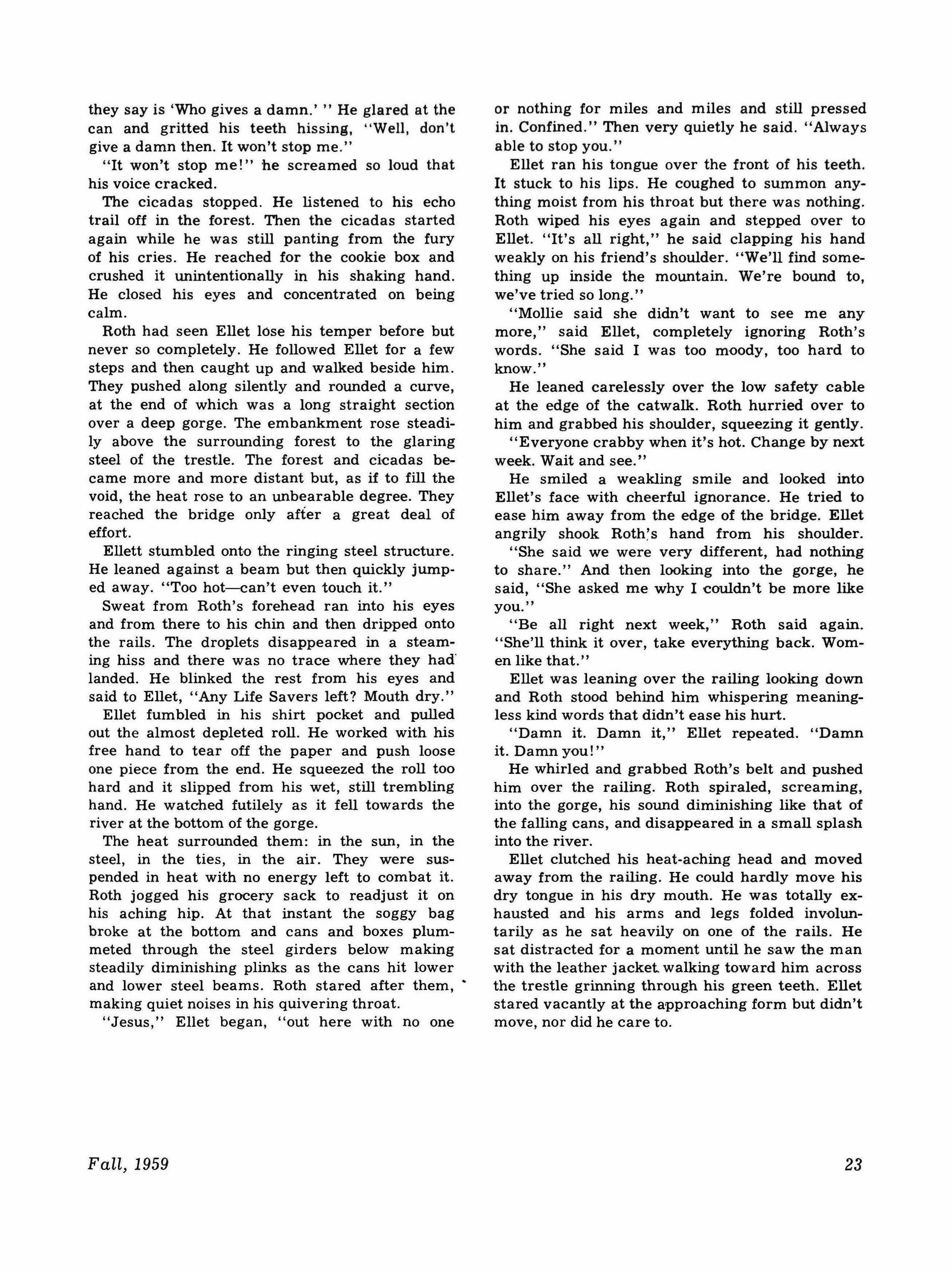
Fall, 1959
23
Richard H. Bagwell
Richard A. Bagwell is presently in the Army, attached to the Information Section of a Nike Brigade at McCord Air Base in Tacoma, Washington.
A native Chicagoan, he attended Morgan Park High School, majored in English in the College of Liberal Arts at Northwestern, taking some courses in acting and directing at the School of Speech. Soon after his graduation in June, 1958, he was married to a classmate, Elizabeth Loverde. For a short time before his induction he served as a civilian writer for the Army's Stars and Stripes in New York. After his mUitary service he plans to enroll at the University of Washington for graduate study in the theater.
A recent letter announces the birth of his daughter, Gillian.
JOE VINGO
THE FIRST TIME Joe Vingo's mother and father saw through him was a bright Saturday afternoon in June, when the sun sent splashes of glare spilling through the west windows into the living room. Saw through him literally, that is. In his agitation Joe had 'wandered to the window and turned with his back against it. Mr. and Mrs. Vingo noticed with a shock, which they immediately repressed, that through Joe they could see a little sunlight, a faint angle of a window comer shining through his body. It was not red, the red glow that can be made by holding a strong light in a closed hand, just a faint glow as though Joe's body was a little less solid than a human body should be.
Both Mr. and Mrs. Vingo noticed the phenomenon, but both suppressed the impulse to call attention to it, partly because' they knew the other would ridicule the idea if they didn't see the light shining through, and partly because they weren't really sure that they had seen it. But then it was gone.
"No, you don't believe in me," said Joe, stepping away from the window, "I can see it in your eyebrows and in your teeth. You don't think I'll ever 'amount to anything,' as they say in the Saturday Evening Post."
"Believe in you? Of course we do. Or why do you think we'd have spent all that money putting you through school? Your father and I worked very hard to make that money. I could use a new coat this spring, but I'll have to wait until next year." Mrs. Vingo ruffled the pages of her magazine angrily.
"Don't you talk that way to us, son. We don't have to take it and we won't."
Joe moved jerkily toward the door, wearing a
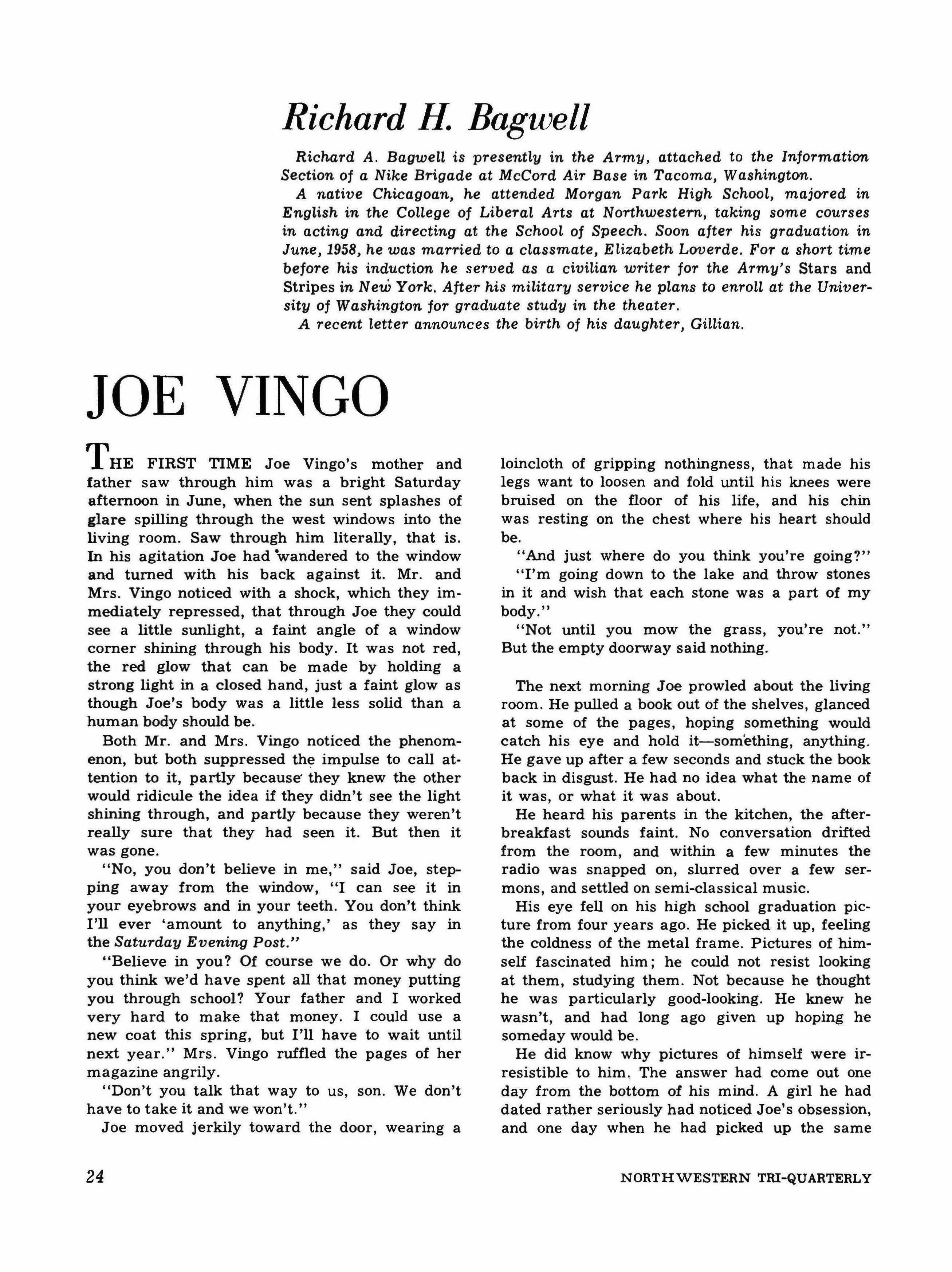
loincloth of gripping nothingness, that made his legs want to loosen and fold until his knees were bruised on the floor of his life, and his chin was resting on the chest where his heart should be.
"And just where do you think you're going?"
"I'm going down to the lake and throw stones in it and wish that each stone was a part of my body."
"Not until you mow the grass, you're not." But the empty doorway said nothing.
The next morning Joe prowled about the living room. He pulled a book out of the shelves, glanced at some of the pages, hoping something would catch his eye and hold it-something, anything. He gave up after a few seconds and stuck the book back in disgust. He had no idea what the name of it was, or what it was about.
He heard his parents in the kitchen, the afterbreakfast sounds faint. No conversation drifted from the room, and within a few minutes the radio was snapped on, slurred over a few sermons, and settled on semi-classical music.
His eye fell on his high school graduation picture from four years ago. He picked it up, feeling the coldness of the metal frame. Pictures of himself fascinated him; he could not resist looking at them, studying them. Not because he thought he was particularly good-looking. He knew he wasn't, and had long ago given up hoping he someday would be.
He did know why pictures of himself were irresistible to him. The answer had come out one day from the bottom of his mind. A girl he had dated rather seriously had noticed Joe's obsession, and one day when he had picked up the same NORTHWESTERN
24
TRI-QUARTERLY
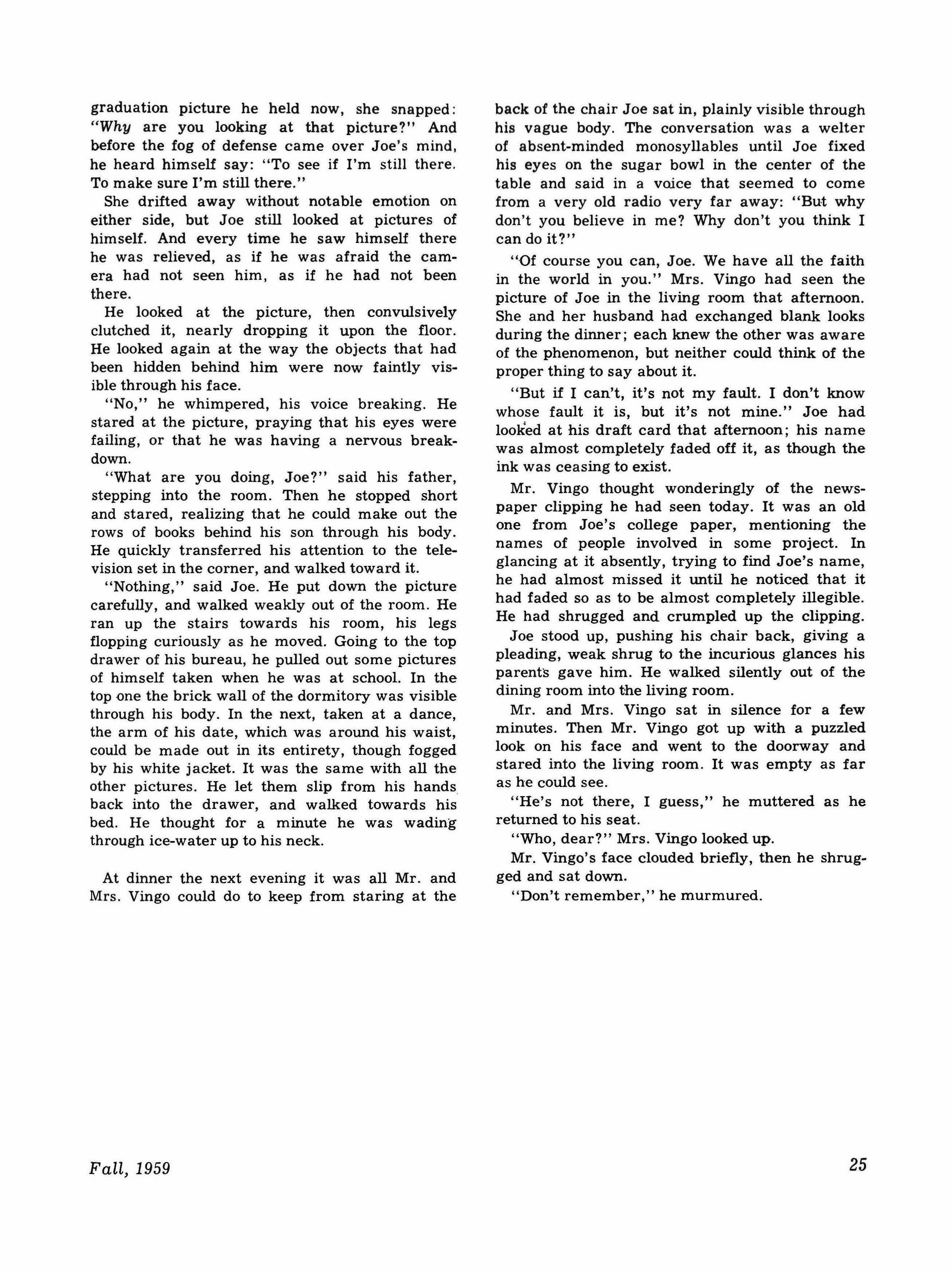
graduation picture he held now, she snapped: "Why are you looking at that picture?" And before the fog of defense came over Joe's mind, he heard himself say: "To see if I'm still there. To make sure I'm still there."
She drifted away without notable emotion on either side, but Joe still looked at pictures of himself. And every time he saw himself there he was relieved, as if he was afraid the camera had not seen him, as if he had not been there.
He looked at the picture, then convulsively clutched it, nearly dropping it upon the floor. He looked again at the way the objects that had been hidden behind him were now faintly visible through his face.
"No," he whimpered, his voice breaking. He stared at the picture, praying that his eyes were failing, or that he was having a nervous breakdown.
"What are you doing, Joe?" said his father, stepping into the room. Then he stopped short and stared, realizing that he could make out the rows of books behind his son through his body. He quickly transferred his attention to the television set in the corner, and walked toward it.
"Nothing," said Joe. He put down the picture carefully, and walked weakly out of the room. He ran up the stairs towards his room, his legs flopping curiously as he moved. Going to the top drawer of his bureau, he pulled out some pictures of himself taken when he was at school. In the top one the brick wall of the dormitory was visible through his body. In the next, taken at a dance, the arm of his date, which was around his waist, could be made out in its entirety, though fogged by his white jacket. It was the same with all the other pictures. He let them slip from his hands back into the drawer, and walked towards his bed. He thought for a minute he was wading through ice-water up to his neck.
At dinner the next evening it was all Mr. and Mrs. Vingo could do to keep from staring at the
back of the chair Joe sat in, plainly visible through his vague body. The conversation was a welter of absent-minded monosyllables until Joe fixed his eyes on the sugar bowl in the center of the table and said in a voice that seemed to come from a very old radio very far away: "But why don't you believe in me? Why don't you think I can do it?"
"Of course you can, Joe. We have all the faith in the world in you." Mrs. Vingo had seen the picture of Joe in the living room that afternoon. She and her husband had exchanged blank looks during the dinner; each knew the other was aware of the phenomenon, but neither could think of the proper thing to say about it.
"But if I can't, it's not my fault. I don't know whose fault it is, but it's not mine." Joe had looked at his draft card that afternoon; his name was almost completely faded off it, as though the ink was ceasing to exist.
Mr. Vingo thought wonderingly of the newspaper clipping he had seen today. It was an old one from Joe's college paper, mentioning the names of people involved in some project. In glancing at it absently, trying to find Joe's name, he had almost missed it until he noticed that it had faded so as to be almost completely illegible. He had shrugged and crumpled up the clipping.
Joe stood up, pushing his chair back, giving a pleading, weak shrug to the incurious glances his parents gave him. He walked silently out of the dining room into the living room.
Mr. and Mrs. Vingo sat in silence for a few minutes. Then Mr. Vingo got up with a puzzled look on his face and went to the doorway and stared into the living room. It was empty as far as he could see.
"He's not there, I guess," he muttered as he returned to his seat.
"Who, dear?" Mrs. Vingo looked up.
Mr. Vingo's face clouded briefly, then he shrugged and sat down.
"Don't remember," he murmured.
Fall,
1959
25
Frederic Everett Faverty
This is the fourth in a series of articles on living American poets, written especiaUy for THE TRI-QUARTERLY.
Frederic Everett Faverty served as chairman of the English Department for thirteen years, 1945-58, and since 1956 has held the Morrison Professorship in English Literature. He is a member of the Society of Midland Authors. Born in Chester, IlZinois, he was graduated in 1924 fro.m Washington University, taught for a short time there and at Western Reserve, then took his graduate degrees at Harvard, coming to Northwestern in 1930.
His Matthew Arnold the Ethnologist, published in 1951, and a diversity of critical and scholarly articles, have made him a distinguished authority 0111 Victorian Literature, and he has been caUed upon to perform many services, editorial and bibliographical, for the learned societies and publications in his field. In other functions, civic and academic, he has given his time generously.
Mr. Faverty's literary interests are not narrowly specialized. His Our Literary Heritage, published this faU by Lippincott, contains in book form the essays - some seventy in number, now somewhat revised - which appeared from week to week in the Chicago Tribune's "Magazine of Books." Both in their substance and in the modern wit and elegance of their style, these discerning appraisals of the most famous men of letters from Homer to our own time are informative and an enticement to good reading.
THE POETRY OF RICHARD WILBUR
"Everything in the world is strange and marvellous to well-open eyes. This faculty of wonder is the delight which leads the intellectual man through life in the perpetual ecstasy of the visionary. His special attribute is the wonder of the eyes. Hence it was that the ancients gave Minerva her owl, the bird with ever-dazzled eyes."
(Jose Ortega y Gasset, Revolt of the Masses.)l
FOR A COMPARATIVELY
YOUNG POET, Richard Wilbur (b. 1921) has received considerable recognition from official quarters: the Harriet Monroe Prize in poetry, 1948; the Oscar Blumenthal Prize, 1950; the Edna St. Vincent Millay Memorial Award, 1957; the National Book Award, 1957; and the Pulitzer Prize, 1957. In recognition of his promise as well as his achievement he has been granted fellowships by the Guggenheim Foundation (1952) and by the American Academy of Arts and Letters (1954). Currently he is a professor of English at Wesleyan University.
1 Quoted under "The Owl" in A Bestiary, compiled by Richard Wilbur, illustrated by Alexander Calder (Pantheon Books, 1955).
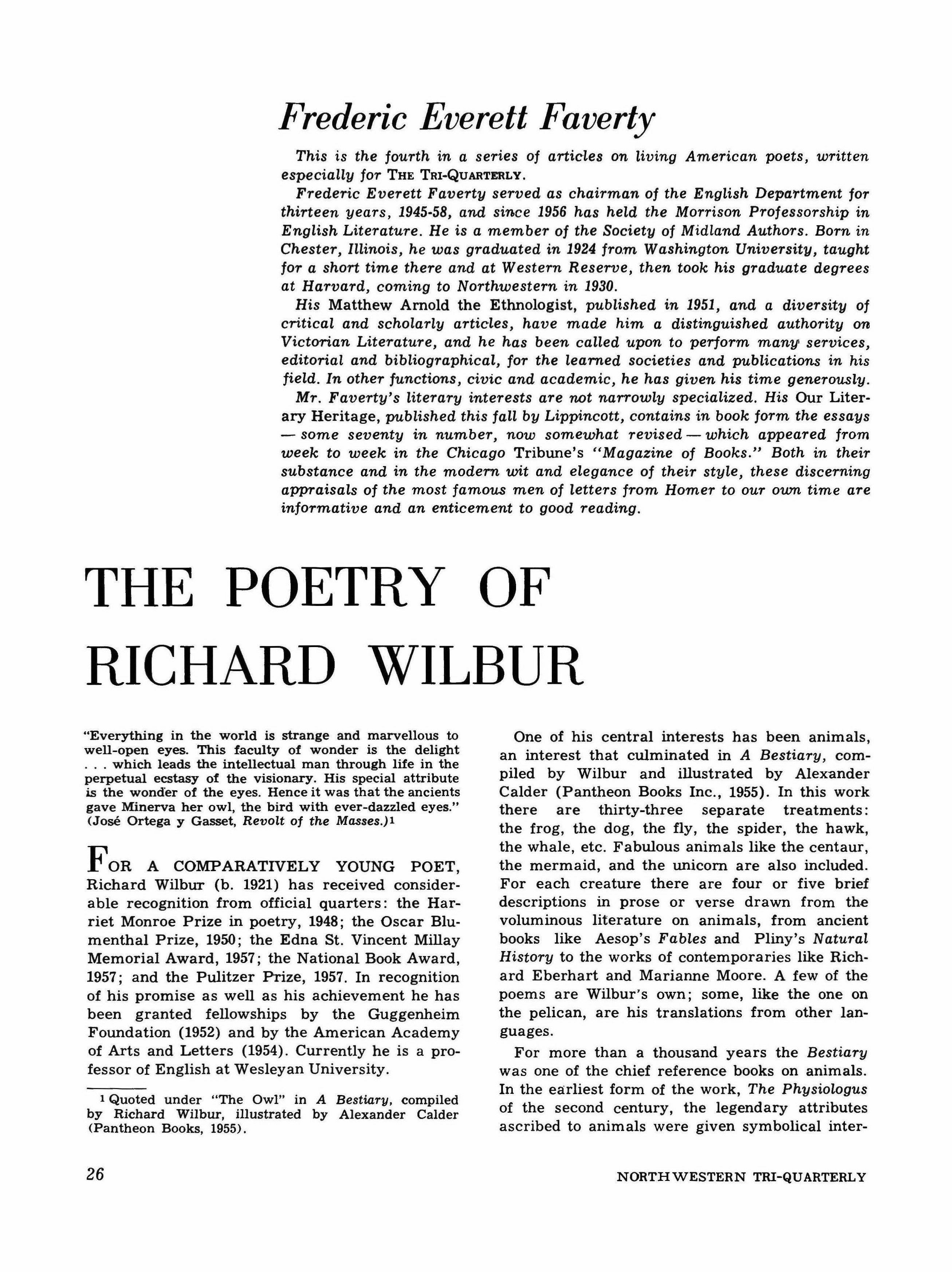
One of his central interests has been animals, an interest that culminated in A Bestiary, compiled by Wilbur and illustrated by Alexander Calder (Pantheon Books Inc., 1955). In this work there are thirty-three separate treatments: the frog, the dog, the fly, the spider, the hawk, the whale, etc. Fabulous animals like the centaur, the mermaid, and the unicorn are also included. For each creature there are four or five brief descriptions in prose or verse drawn from the voluminous literature on animals, from ancient books like Aesop's Fables and Pliny's Natural History to the works of contemporaries like Richard Eberhart and Marianne Moore. A few of the poems are Wilbur's own; some, like the one on the pelican, are his translations from other languages.
For more than a thousand years the Bestiary was one of the chief reference books on animals. In the ea:rliest form of the work, The Physiologus of the second century, the legendary attributes ascribed to animals were given symbolical inter-
26
NORTHWESTERN TRI-QUARTE.RLY
pretations. By ingenious parallels the lion and the whale, for example, were shown to represent Christ. In many a medieval tapestry the unicorn dominates the scene. According to legend, it was an exceedingly dangerous beast; yet at sight of a virgin it would approach gently and place its head in her lap. So, Christ, mightiest of celestial beings, took on human form in the .womb of the Virgin Mary. Animal allegories of this sort were favored by the Greek and Latin Church Fathers: Origen, Ambrose, Jerome, and Augustine. Through their influence the Physiologus came to be translated as the Bestiary into most of the west European vernaculars. Wilbur draws particularly upon the Middle English Bestiary. For translation from the twelfth century Anglo-Norman Philippe de Thaun's Bestiaire he selects "The Pelican" in which sophistication and naivete are skilfully blended. The father pelican angered by the attacks his infant offspring make upon him, slays them. Moved by compassion he returns after three days, draws blood from his side and sprinkles it upon the lifeless forms. The little birds revive. In similar fashion, mankind condemned to death has been restored to life through the shedding of Christ's blood.
In definition and range, however, Wilbur's Bestiary goes far beyond its medieval original. It includes classical and modern accounts that have no trace of allegory. Thorstein Veblen's diatribe on "the filthiest of the domestic animals," the dog, is an example. Of Wilbur's translations, one of the best is A Prayer to Go to Paradise with the Donkeys, by the late nineteenth century French poet, Francis Jammes. In its humble subject, its simple diction, and its unquestioning faith, it recaptures something of the charm of the middle ages. Wilbur's faithful translation deserves to be quoted in full:
When I must come to you, 0 my God, I pray It be some dust-roaded holiday, And even as in my travels here below, I beg to choose by what road I shall go To Paradise, where the clear stars shine by day. I'll take my walking-stick and go my way, And to my friends the donkeys I shall say, 'I am Francis Jammes, and I'm going to Paradise, For there is no hell in the land of the loving God.' And I'll say to them: 'Come, sweet friends of the blue skies, Poor creatures who with a flap of the ears or a nod Of the head shake off the buffets, the bees, the flies .'
Let me come with these donkeys, Lord, into your land,
These beasts who bow their heads so gently, and stand
With their small feet joined together in a fashion Utterly gentle, asking your compassion.
I shall arrive, followed by their thousands of ears,
Fall, 1959
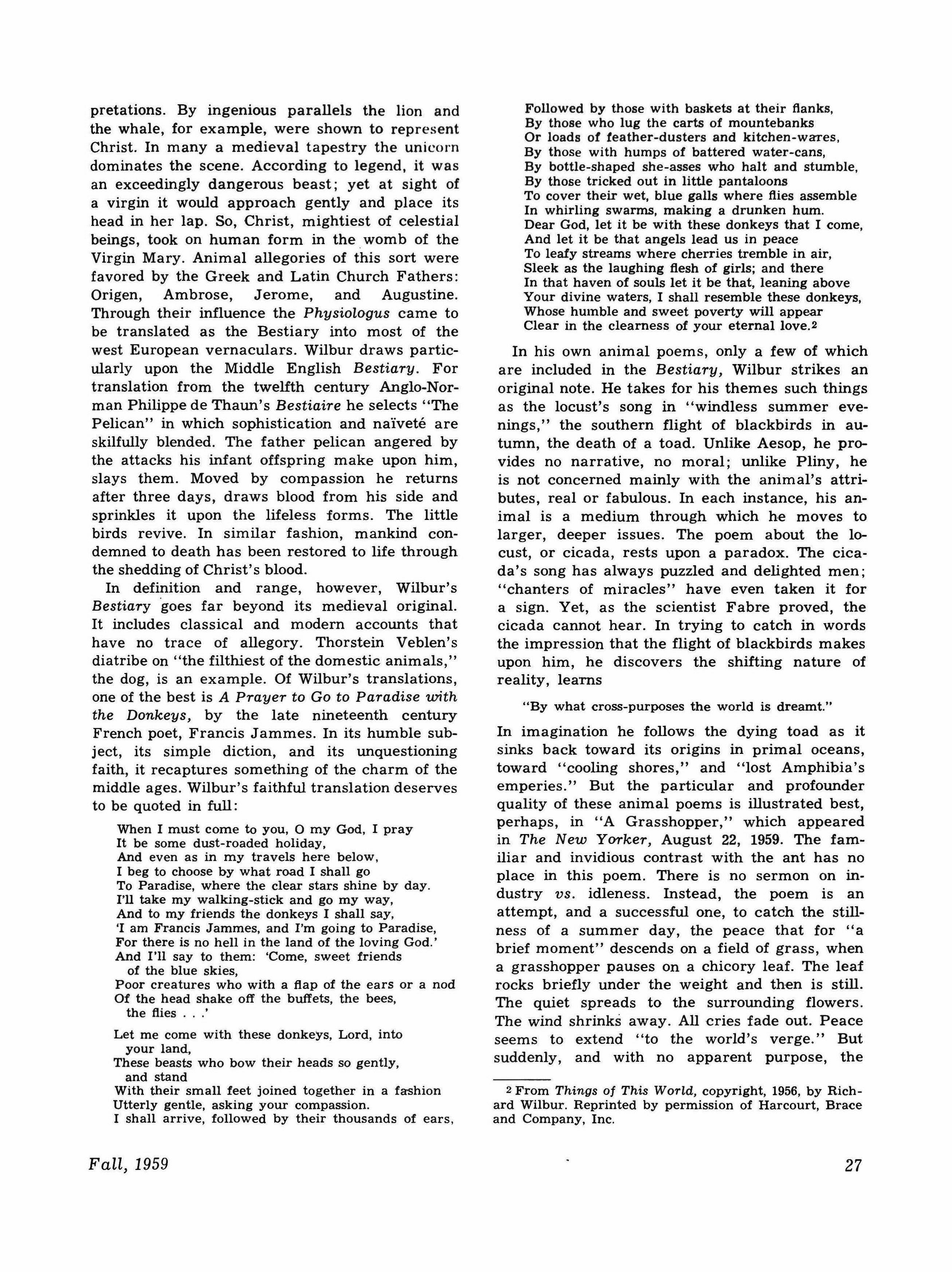
Followed by those with baskets at their flanks, By those who lug the carts of mountebanks Or loads of feather-dusters and kitchen-wa-res, By those with humps of battered water-cans, By bottle-shaped she-asses who halt and stumble, By those tricked out in little pantaloons
To cover their wet, blue galls where flies assemble In whirling swarms, making a drunken hum. Dear God, let it be with these donkeys that I come, And let it be that angels lead us in peace
To leafy streams where cherries tremble in air, Sleek as the laughing flesh of girls; and there In that haven of souls let it be that, leaning above Your divine waters, I shall resemble these donkeys, Whose humble and sweet poverty will appear Clear in the clearness of your eternal love.2
In his own animal poems, only a few of which are included in the Bestiary, Wilbur strikes an original note. He takes for his themes such things as the locust's song in "windless summer evenings," the southern flight of blackbirds in autumn, the death of a toad. Unlike Aesop, he provides no narrative, no moral; unlike Pliny, he is not concerned mainly with the animal's attributes, real or fabulous. In each instance, his animal is a medium through which he moves to larger, deeper issues. The poem about the locust, or cicada, rests upon a paradox. The cicada's song has always puzzled and delighted men; "chanters of miracles" have even taken it for a sign. Yet, as the scientist Fabre proved, the cicada cannot hear. In trying to catch in words the impression that the flight of blackbirds makes upon him, he discovers the shifting nature of reality, learns
"By what cross-purposes the world is dreamt."
In imagination he follows the dying toad as it sinks back toward its origins in primal oceans, toward "cooling shores," and "lost Amphibia's emperies." But the particular and profounder quality of these animal poems is illustrated best, perhaps, in "A Grasshopper," which appeared in The New Yorker, August 22, 1959. The familiar and invidious contrast with the ant has no place in this poem. There is no sermon on industry vs. idleness. Instead, the poem is an attempt, and a successful one, to catch the stillness of a summer day, the peace that for "a brief moment" descends on a field of grass, when a grasshopper pauses on a chicory leaf. The leaf rocks briefly under the weight and then is still. The quiet spreads to the surrounding flowers. The wind shrinks away. All cries fade out. Peace seems to extend "to the world's verge." But suddenly, and with no apparent purpose, the
2 From Things of This Wortd, copyright, 1956, by Richard Wilbur. Reprinted by permission of Harcourt, Brace and Company, Inc.
27
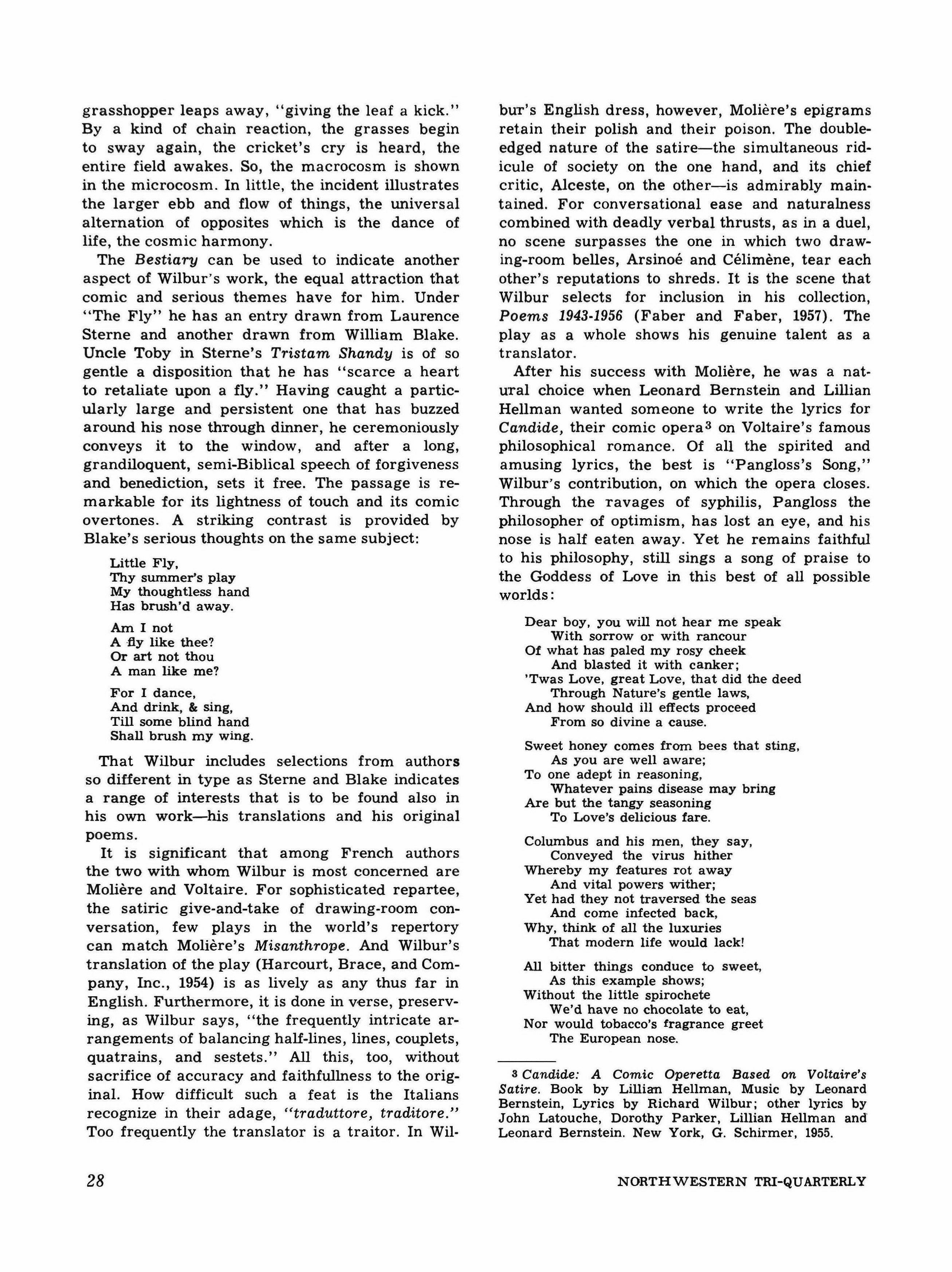
grasshopper leaps away, "giving the leaf a kick." By a kind of chain reaction, the grasses begin to sway again, the cricket's cry is heard, the entire field awakes. So, the macrocosm is shown in the microcosm. In little, the incident illustrates the larger ebb and flow of things, the universal alternation of opposites which is the dance of life, the cosmic harmony.
The Bestiary can be used to indicate another aspect of Wilbur's work, the equal attraction that comic and serious themes have for him. Under "The Fly" he has an entry drawn from Laurence Sterne and another drawn from William Blake. Uncle Toby in Sterne's Tristam Shandy is of so gentle a disposition that he has "scarce a heart to retaliate upon a fly." Having caught a particularly large and persistent one that has buzzed around his nose through dinner, he ceremoniously conveys it to the window, and after a long, grandiloquent, semi-Biblical speech of forgiveness and benediction, sets it free. The passage is remarkable for its lightness of touch and its comic overtones. A striking contrast is provided by Blake's serious thoughts on the same subject:
Little Fly, Thy summer's play My thoughtless hand Has brush'd away.
Am I not A ·fly like thee? Or art not thou A man like me?
For I dance, And drink, & sing, Till some blind hand Shall brush my wing.
That Wilbur includes selections from authors so different in type as Sterne and Blake indicates a range of interests that is to be found also in his own work-his translations and his original poems.
It is significant that among French authors the two with whom Wilbur is most concerned are Moliere and Voltaire. For sophisticated repartee, the satiric give-and-take of drawing-room conversation, few plays in the world's repertory can match Moliere's Misanthrope. And Wilbur's translation of the play (Harcourt, Brace, and Company, Inc., 1954) is as lively as any thus far in English. Furthermore, it is done in verse, preserving, as Wilbur says, "the frequently intricate arrangements of balancing half-lines, lines, couplets, quatrains, and sestets." All this, too, without sacrifice of accuracy and faithfullness to the original. How difficult such a feat is the Italians recognize in their adage, "traduttore, traditore." Too frequently the translator is a traitor. In Wil-
bur's English dress, however, Moliere's epigrams retain their polish and their poison. The doubleedged nature of the satire-the simultaneous ridicule of society on the one hand, and its chief critic, Alceste, on the other-is admirably maintained. For conversational ease and naturalness combined with deadly verbal thrusts, as in a duel, no scene surpasses the one in which two drawing-room belles, Arsinoe and Celimene, tear each other's reputations to shreds. It is the scene that Wilbur selects for inclusion in his collection, Poems 1943-1956 (Faber and Faber, 1957). The playas a whole shows his genuine talent as a translator.
After his success with Moliere, he was a natural choice when Leonard Bernstein and Lillian Hellman wanted someone to write the lyrics for Candide, their comic opera e on Voltaire's famous philosophical romance. Of all the spirited and amusing lyrics, the best is "Pangloss's Song," Wilbur's contribution, on which the opera closes. Through the ravages of syphilis, Pangloss the philosopher of optimism, has lost an eye, and his nose is half eaten away. Yet he remains faithful to his philosophy, still sings a song of praise to the Goddess of Love in this best of all possible worlds:
Dear boy, you will not hear me speak With sorrow or with raneour Of what has paled my rosy cheek And blasted it with canker; 'Twas Love, great Love, that did the deed Through Nature's gentle laws, And how should ill effects proceed From so divine a cause.
Sweet honey comes from bees that sting, As you are well aware; To one adept in reasoning, Whatever pains disease may bring Are but the tangy seasoning To Love's delicious fare.
Columbus and his men, they say, Conveyed the virus hither Whereby my features rot away And vital powers wither; Yet had they not traversed the seas And come infected back, Why, think of all the luxuries That modern life would lack!
All bitter things conduce to sweet, As this example shows; Without the little spirochete We'd have no chocolate to eat, Nor would tobacco's fragrance greet The European nose.
3 Candide: A Comic Operetta Based on Voltaire's Satire. Book by Lillian Hellman, Music by Leonard Bernstein, Lyrics by Richard Wilbur; other lyrics by John Latouche, Dorothy Parker, Lillian Hellman and Leonard Bernstein. New York, G. Schirmer, 1955.
NORTHWESTERN TRI-QUARTERLY
28
Each nation guards its native land With cannon and with sentry, Inspectors look for contraband
At every port of entry, Yet nothing can prevent the spread Of Love's divine disease; It rounds the world from bed to bed As pretty as you please.
Men worship Venus everywhere As plainly may be seen; The decorations which I bear Are nobler than the Croix de Guerre, And gained in service of our fair And universal Queen.4
There is a sprinkling of poems of the light and humorous sort in each of Wilbur's books thus far published. Two clever couplets, for example, are devoted to Dr. Samuel Johnson's kicking a stone in refutation of Berkeley's idealistic philosophy ("Epistemology"). Don Quixote riding abroad in search of glory and adventure comes to a crossing and allows his horse to choose the way. The horse, wiser than the master, heads back for the barn ("Parable"). A graceful dancer pirouettes on a museum wall ("Museum Piece"). It is a painting by Edgar Degas who once bought an excellent EI Greco
To hang his pants on while he slept.
Degas, to whom Wilbur devotes two poems ("Museum Piece" and "L'Etoile"), is not the only painter, however, to interest him. "My Father Paints the Summer" is another poem on the kindred art. Eugene Delacroix receives a tribute in "The Giaour and the Pacha." A painting by Bazille is the subject of "Ceremony." And Pieter de Hooch's art inspires "Objects" and "A Dutch Courtyard." In the work of these painters it is evident that Wilbur finds principles operative that are of value, also, to him as a poet. There is, for example, the peculiar power the painter Pieter de Hooch has of making "objects speak." This power Wilbur also possesses. From many possible illustrations, "Driftwood" can be selected as representative. Cast up by the sea, at rest finally on the sand, a few gnarled relics have a tremendous significance. They tell of years of growing in the forest; of service as mast, or oar, or plank; of eventual ship-wreck; of floating in deep waters by which they were "never dissolved"; of being "shaped" and "fitted" by ocean tides until now they have the beauty of Excellence earned.
To the present generation faced by so many difficult problems, these relics should have a spe-
4 Reprinted by permission of the author.
Fall, 1959
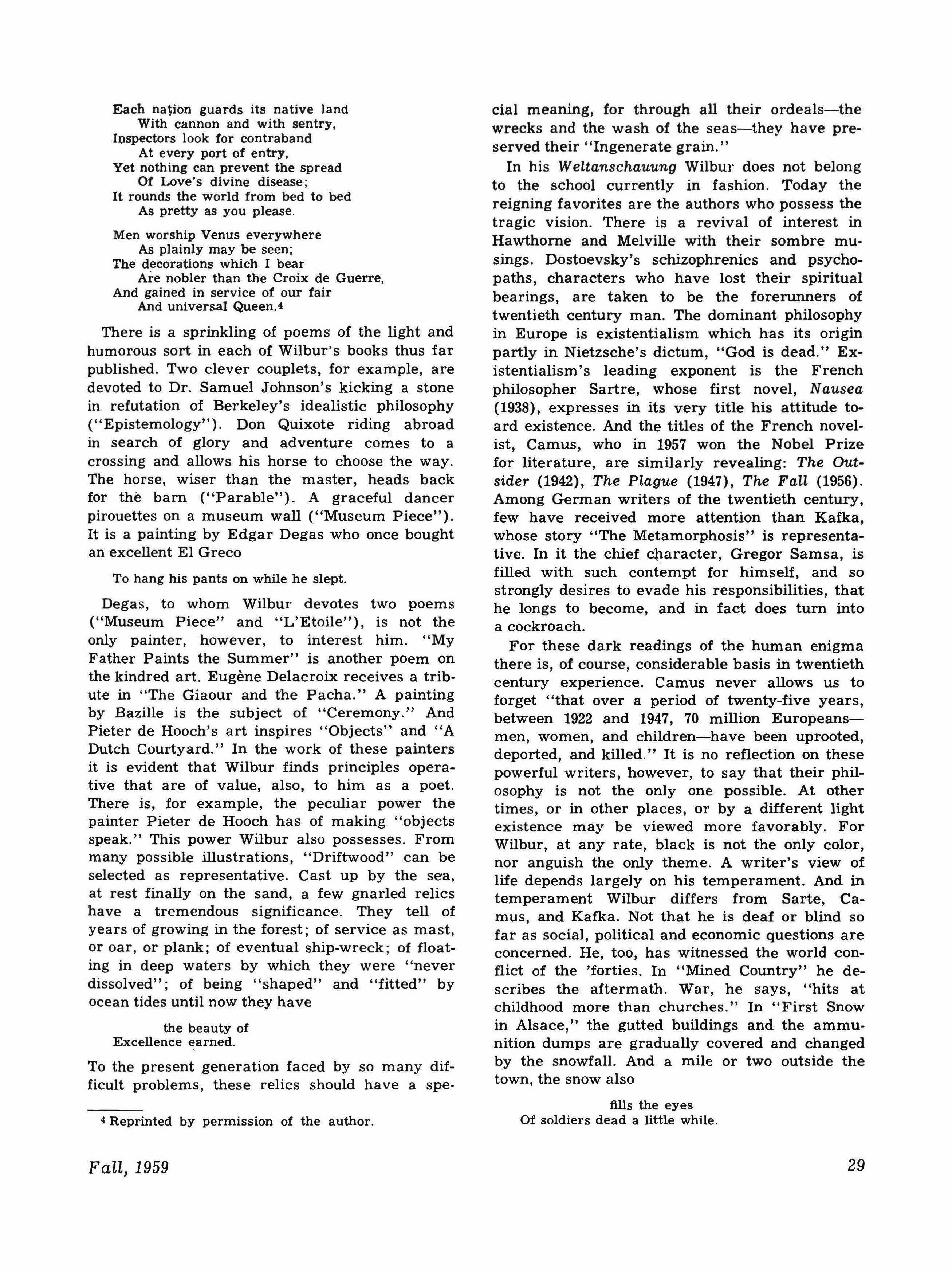
cial meaning, for through all their ordeals-the wrecks and the wash of the seas-they have preserved their "Ingenerate grain."
In his Weltanschauung Wilbur does not belong to the school currently in fashion. Today the reigning favorites are the authors who possess the tragic vision. There is a revival of interest in Hawthorne and Melville with their sombre musings. Dostoevsky's schizophrenics and psychopaths, characters who have lost their spiritual bearings, are taken to be the forerunners of twentieth century man. The dominant philosophy in Europe is existentialism which has its origin partly in Nietzsche's dictum, "God is dead." Existentialism's leading exponent is the French philosopher Sartre, whose first novel, Nausea (1938), expresses in its very title his attitude toard existence. And the titles of the French novelist, Camus, who in 1957 won the Nobel Prize for literature, are similarly revealing: The Outsider (1942), The Plague (1947), The Fall (1956). Among German writers of the twentieth century, few have received more attention than Kafka, whose story "The Metamorphosis" is representative. In it the chief character, Gregor Samsa, is filled with such contempt for himself, and so strongly desires to evade his responsibilities, that he longs to become, and in fact does turn into a cockroach.
For these dark readings of the human enigma there is, of course, considerable basis in twentieth century experience. Camus never allows us to forget "that over a period of twenty-five years, between 1922 and 1947, 70 million Europeansmen, women, and children-have been uprooted, deported, and killed." It is no reflection on these powerful writers, however, to say that their philosophy is not the only one possible. At other times, or in other places, or by a different light existence may be viewed more favorably. For Wilbur, at any rate, black is not the only color, nor anguish the only theme. A writer's view of life depends largely on his temperament. And in temperament Wilbur differs from Sarte, Camus, and Kafka. Not that he is deaf or blind so far as social, political and economic questions are concerned. He, too, has witnessed the world conflict of the 'forties. In "Mined Country" he describes the aftermath. War, he says, "hits at childhood more than churches." In "First Snow in Alsace," the gutted buildings and the ammunition dumps are gradually covered and changed by the snowfall. And a mile or two outside the town, the snow also fills the eyes
soldiers dead a little while.
29
Of
He refers in passing to such things as the Negro problem, and "the single-tax state" ("Water Walker"). Five of his quatrains berate the Philistines in the suburbs ("To an American Poet Just Dead"). But he is not at his best on these subjects. They lie on the periphery of his thought.
Essentially, Wilbur's note is one of affirmation. He is attracted, for example, by an Italian fountain ("A Baroque Wall-Fountain in the Villa Sciarra"), by the carved fauns at their innocent games. They never grow weary of the sun. They are happy in the loose waterfall and spray,
Reproving our disgust and our ennui
With humble insatiety.
It is possible, Wilbur implies ("A Problem from Milton"), that men reflect too much on the nature of things, do not enough enjoy the natural phenomena of which they are a part, the life force evidencing itself in the coiled vine, the lush tree, the comber dashing itself on the rocks. Adam in Eden was the first offender. Not content simply with being, he lost Paradise in his attempt to understand it. For splendid vitality there is no better example than the sea
Whose horses never know their lunar reins.
As Ortega y Gasset says in the passage quoted at the beginning of this article, "Everything in the world is strange and marvellous to well-open eyes." Unquestionably, Wilbur would meet with the Spanish philosopher's approval. For he discovers the strange and the marvellous in the commonest objects. Like the painter, Pieter de Hooch, whom he admires ("Objects" and "A Dutch Courtyard"), he is entranced by the way in which a courtyard seems to burn in the sun, finds pleasure in "true textures," "true integuments," magic in "the weave of a sleeve." Even the lowly potato inspires a lyric ("Potato") ten stanzas long.
Yet he is aware, as Wordsworth earlier was aware, that when he invests the commonplace with magic, he half perceives and half creates the objects of his vision. In "My Father Paints the Summer," the setting is a beach hotel on a chilly, rainy July day. While the other guests shiver by the "lobby fire," the father in his room puts on canvas his conception of the perfect season. It is "a summer never seen," having its origin in the heart, for
Caught summer is always an imagined time. On occasion, as in "La Rose des Vents," the poet may be too prone to journey to the lands of his imagining, to cultivate the "roses of the mind." His lady calls him back to reality so that he may tend the true
The mortal flower.
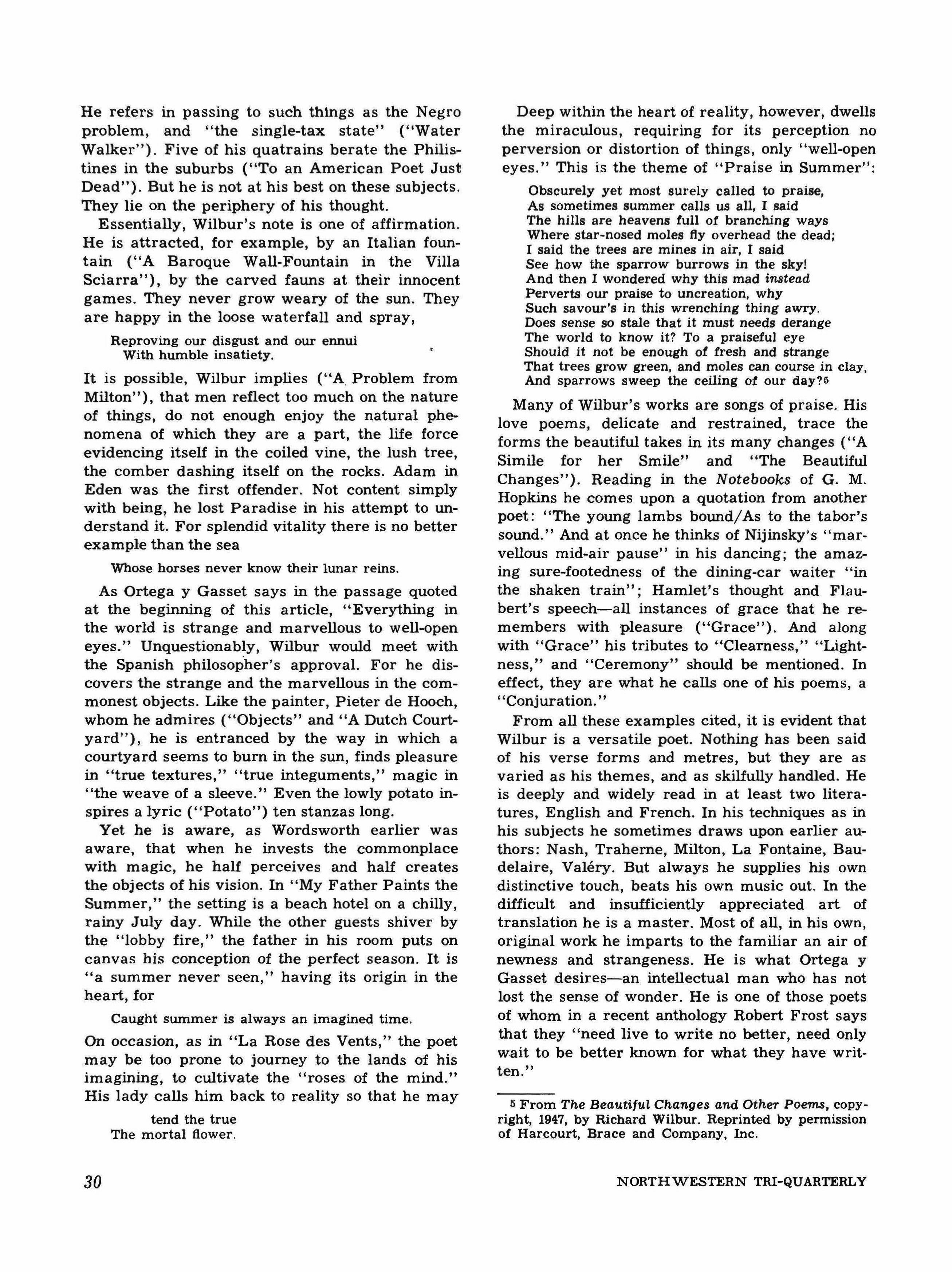
Deep within the heart of reality, however, dwells the miraculous, requiring for its perception no perversion or distortion of things, only "well-open eyes." This is the theme of "Praise in Summer":
Obscurely yet most surely called to praise, As sometimes summer calls us all, I said The hills are heavens full of branching ways Where star-nosed moles fly overhead the dead; I said the trees are mines in air, I said See how the sparrow burrows in the sky!
And then I wondered why this mad instead Perverts our praise to uncreation, why Such savour's in this wrenching thing awry. Does sense so stale that it must needs derange The world to know it? To a praiseful eye
Should it not be enough ot fresh and strange
That trees grow green, and moles can course in clay, And sparrows sweep the ceiling of our day?1I
Many of Wilbur's works are songs of praise. His love poems, delicate and restrained, trace the forms the beautiful takes in its many changes ("A Simile for her Smile" and "The Beautiful Changes"). Reading in the Notebooks of G. M. Hopkins he comes upon a quotation from another poet: "The young lambs bound/As to the tabor's sound." And at once he thinks of Nijinsky's "marvellous mid-air pause" in his dancing; the amazing sure-footedness of the dining-car waiter "in the shaken train"; Hamlet's thought and Flaubert's speech-all instances of grace that he remembers with pleasure ("Grace"). And along with "Grace" his tributes to "Clearness," "Lightness," and "Ceremony" should be mentioned. In effect, they are what he calls one of his poems, a "Conjuration.
From all these examples cited, it is evident that Wilbur is a versatile poet. Nothing has been said of his verse forms and metres, but they are as varied as his themes, and as skilfully handled. He is deeply and widely read in at least two literatures, English and French. In his techniques as in his subjects he sometimes draws upon earlier authors: Nash, Traherne, Milton, La Fontaine, Baudelaire, Valery. But always he supplies his own distinctive touch, beats his own music out. In the difficult and insufficiently appreciated art of translation he is a master. Most of all, in his own, original work he imparts to the familiar an air of newness and strangeness. He is what Ortega y Gasset desires-an intellectual man who has not lost the sense of wonder. He is one of those poets of whom in a recent anthology Robert Frost says that they "need live to write no better, need only wait to be better known for what they have written."
II From The Beautiful Changes and Other Poems, copyright, 1947, by Richard Wilbur. Reprinted by permission of Harcourt, Brace and Company, Inc.
30
NORTHWESTERN TRI-QUARTERLY
Kristin Knabe
Kristin Knabe sent from Amsterdam this story, revised from a first writing last spring. During the summer she studied at the University of Munich, and wiU be working at Cologne this winter.
Born in Pittsburgh, Pennsylvania, she attended school there, came to Northwestern in 1955 where she majored in the Department of Romance Languages, studying French and Italian. She spent her junior year in France pursuing an independent program of studies for which she received, with distinction, le Diplome annuel d'Etudes de Civilisation francaise at the Sorbonne of the University of Paris. Returning to Northwestern, she was graduated with her class in June, 1959. She is a member of Kappa Delta sorority.
THE BEGGAR
TONED DECIDUOUS brown and evergreen, the unspicy gray of English autumn. The Thames flows clean to Oxford, there takes in the Cherwell and a tincture of industrial excrement, and continues Londonward. Karen walked down High Street.
Past St. Mary's spire on the other side, past the book store where she put in a head to .say hello, Mr. McDow, and ask is Malraux'-
"Now, Mrs. Edwards, have some faith in an old man. You'll have your first edition." The big Scotsman bent from the hip-joint to retrieve a book his shuffling ungrace made topple from a table, and stepped outside onto the cobblestone sidewalk. "You ought to know a watched pot never boils," he said, laughing and thwacking her shoulder. "How's the little fellow?"
"He's fine,' Karen said, "but he's growing too fast for my income."
"I'll say it again, young lady: anyone who's spent the time and money you have educating herself"-his tone was for a frown-"is entitled to better returns from the business world." But his merry eyes won up the corners of his mouth. "Well, you know, I'm quite serious."
Karen's smile hugged him. "I wrote to an agency in Liverpool yesterday, but I'll be just as happy if nothing comes of it. You know how much I like the library."
"Still cataloguing oriental manuscripts, I suppose."
"Still? I just began!"
"Some months ago you just began. Oh, it's good work, sure. Just being able to see meaning
Fall, 1959
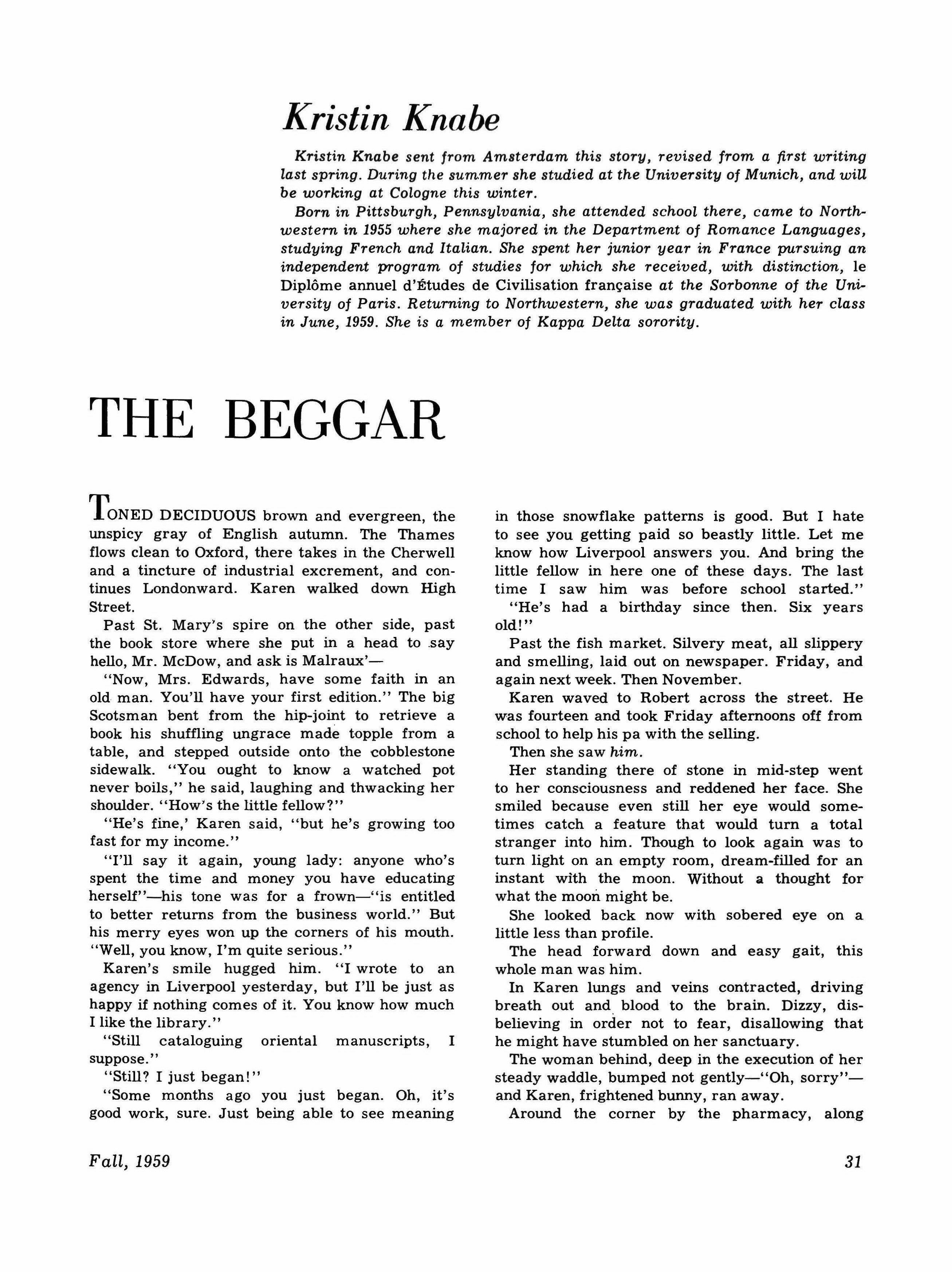
in those snowflake patterns is good. But I hate to see you getting paid so beastly little. Let me know how Liverpool answers you. And bring the little fellow in here one of these days. The last time I saw him was before school started."
"He's had a birthday since then. Six years old!
Past the fish market. Silvery meat, all slippery and smelling, laid out on newspaper. Friday, and again next week. Then November.
Karen waved to Robert across the street. He was fourteen and took Friday afternoons off from school to help his pa with the selling.
Then she saw him.
Her standing there of stone in mid-step went to her consciousness and reddened her face. She smiled because even still her eye would sometimes catch a feature that would turn a total stranger into him. Though to look again was to turn light on an empty room, dream-filled for an instant with the moon. Without a thought for what the moon might be.
She looked back now with sobered eye on a little less than profile.
The head forward down and easy gait, this whole man was him.
In Karen lungs and veins contracted, driving breath out and blood to the brain. Dizzy, disbelieving in order not to fear, disallowing that he might have stumbled on her sanctuary.
The woman behind, deep in the execution of her steady waddle, bumped not gently-"Oh, sorry"and Karen, frightened bunny, ran away.
Around the corner by the pharmacy, along
31
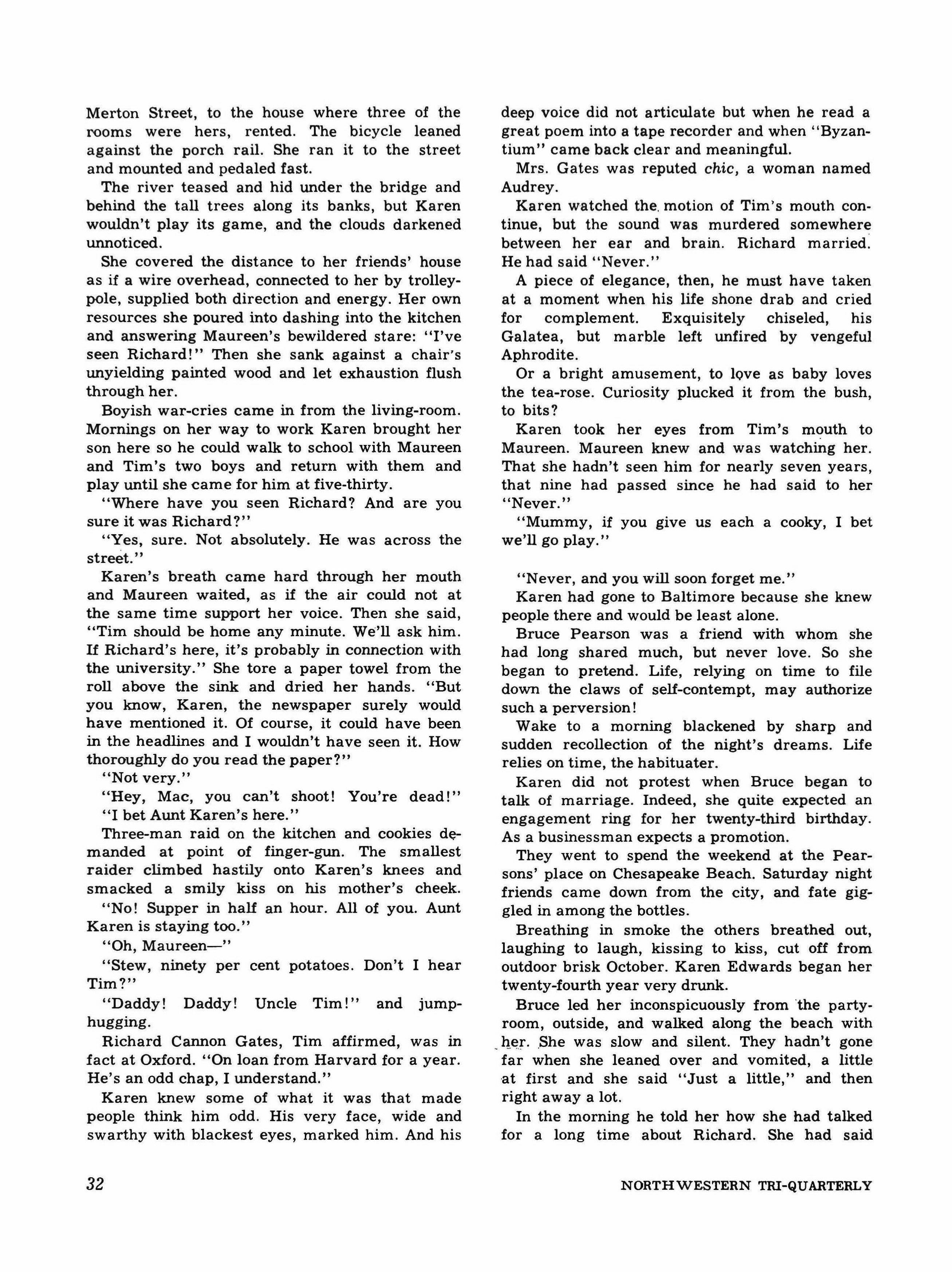
Merton Street, to the house where three of the rooms were hers, rented. The bicycle leaned against the porch rail. She ran it to the street and mounted and pedaled fast.
The river teased and hid under the bridge and behind the tall trees along its banks, but Karen wouldn't play its game, and the clouds darkened unnoticed.
She covered the distance to her friends' house as if a wire overhead, connected to her by trolleypole, supplied both direction and energy. Her own resources she poured into dashing into the kitchen and answering Maureen's bewildered stare: "I've seen Richard!" Then she sank against a chair's unyielding painted wood and let exhaustion flush through her.
Boyish war-cries came in from the living-room. Mornings on her way to work Karen brought her son here so he could walk to school with Maureen and Tim's two boys and return with them and play until she came for him at five-thirty.
"Where have you seen Richard? And are you sure it was Richard?"
"Yes, sure. Not absolutely. He was across the street."
Karen's breath came hard through her mouth and Maureen waited, as if the air could not at the same time support her voice. Then she said, "Tim should be home any minute. We'll ask him. If Richard's here, it's probably in connection with the university." She tore a paper towel from the roll above the sink and dried her hands. "But you know, Karen, the newspaper surely would have mentioned it. Of course, it could have been in the headlines and I wouldn't have seen it. How thoroughly do you read the paper?"
"Not very."
"Hey, Mac, you can't shoot! You're dead!"
"I bet Aunt Karen's here."
Three-man raid on the kitchen and cookies demanded at point of finger-gun. The smallest raider climbed hastily onto Karen's knees and smacked a smily kiss on his mother's cheek.
"No! Supper in half an hour. All of you. Aunt Karen is staying too."
"Oh, Maureen-"
"Stew, ninety per cent potatoes. Don't I hear Tim?"
"Daddy! Daddy! Uncle Tim!" and jumphugging.
Richard Cannon Gates, Tim affirmed, was in fact at Oxford. "On loan from Harvard for a year. He's an odd chap, I understand."
Karen knew some of what it was that made people think him odd. His very face, wide and swarthy with blackest eyes, marked him. And his
deep voice did not articulate but when he read a great poem into a tape recorder and when "Byzantium" came back clear and meaningful.
Mrs. Gates was reputed chic, a woman named Audrey.
Karen watched the. motion of Tim's mouth continue, but the sound was murdered somewhere between her ear and brain. Richard married. He had said "Never."
A piece of elegance, then, he must have taken at a moment when his life shone drab and cried for complement. Exquisitely chiseled, his Galatea, but marble left unfired by vengeful Aphrodite.
Or a bright amusement, to love as baby loves the tea-rose. Curiosity plucked it from the bush, to bits?
Karen took her eyes from Tim's mouth to Maureen. Maureen knew and was watching her. That she hadn't seen him for nearly seven years, that nine had passed since he had said to her "Never."
"Mummy, if you give us each a cooky, I bet we'll go play."
"Never, and you will soon forget me."
Karen had gone to Baltimore because she knew people there and would be least alone.
Bruce Pearson was a friend with whom she had long shared much, but never love. So she began to pretend. Life, relying on time to file down the claws of self-contempt, may authorize such a perversion!
Wake to a morning blackened by sharp and sudden recollection of the night's dreams. Life relies on time, the habituater.
Karen did not protest when Bruce began to talk of marriage. Indeed, she quite expected an engagement ring for her twenty-third birthday. As a businessman expects a promotion.
They went to spend the weekend at the Pearsons' place on Chesapeake Beach. Saturday night friends came down from the city, and fate giggled in among the bottles.
Breathing in smoke the others breathed out, laughing to laugh, kissing to kiss, cut off from outdoor brisk October. Karen Edwards began her twenty-fourth year very drunk.
Bruce led her inconspicuously from the partyroom, outside, and walked along the beach with her She was slow and silent. They hadn't gone far when she leaned over and vomited, a little at first and she said "Just a little," and then right away a lot.
In the morning he told her how she had talked for a long time about Richard. She had said
32
NORTHWESTERN TRI-QUARTERLY
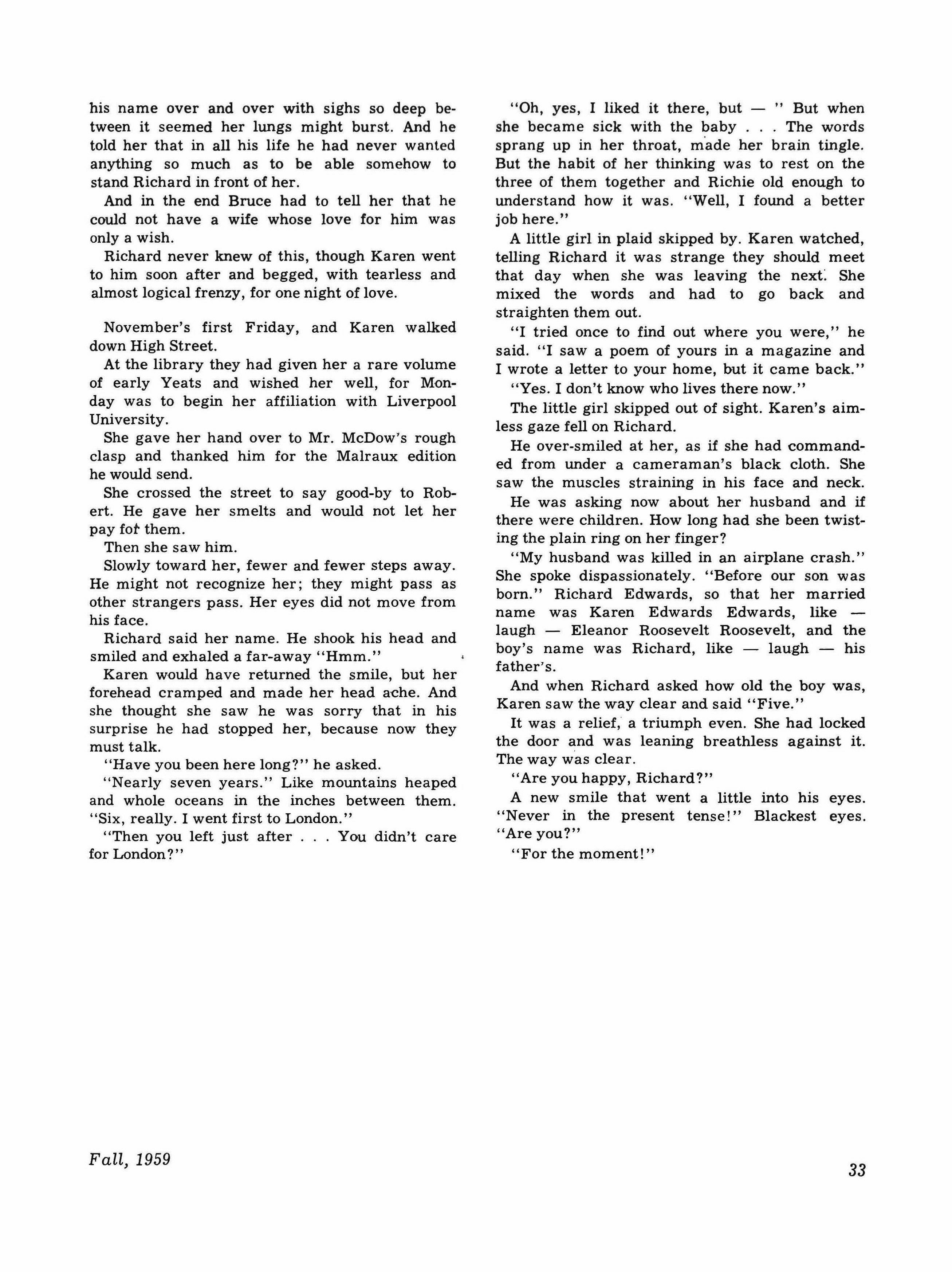
his name over and over with sighs so deep between it seemed her lungs might burst. And he told her that in all his life he had never wanted anything so much as to be able somehow to stand Richard in front of her.
And in the end Bruce had to tell her that he could not have a wife whose love for him was only a wish.
Richard never knew of this, though Karen went to him soon after and begged, with tearless and almost logical frenzy, for one night of love.
November's first Friday, and Karen walked down High Street.
At the library they had given her a rare volume of early Yeats and wished her well, for Monday was to begin her affiliation with Liverpool University.
She gave her hand over to Mr. McDow's rough clasp and thanked him for the Malraux edition he would send.
She crossed the street to say good-by to Robert. He gave her smelts and would not let her pay fot them.
Then she saw him.
Slowly toward her, fewer and fewer steps away. He might not recognize her; they might pass as other strangers pass. Her eyes did not move from his face.
Richard said her name. He shook his head and smiled and exhaled a far-away "Hmm."
Karen would have returned the smile, but her forehead cramped and made her head ache. And she thought she saw he was sorry that in his surprise he had stopped her, because now they must talk.
"Have you been here long?" he asked.
"Nearly seven years." Like mountains heaped and whole oceans in the inches between them. "Six, really. I went first to London."
"Then you left just after You didn't care for London?" FaZZ, 1959
"Oh, yes, I liked it there, but - But when she became sick with the baby The words sprang up in her throat, made her brain tingle. But the habit of her thinking was to rest on the three of them together and Richie old enough to understand how it was. "Well, I found a better job here."
A little girl in plaid skipped by. Karen watched, telling Richard it was strange they should meet that day when she was leaving the next: She mixed the words and had to go back and straighten them out.
"I tried once to find out where you were," he said. "I saw a poem of yours in a magazine and I wrote a letter to your home, but it came back."
"Yes. I don't know who lives there now."
The little girl skipped out of sight. Karen's aimless gaze fell on Richard.
He over-smiled at her, as if she had commanded from under a cameraman's black cloth. She saw the muscles straining in his face and neck.
He was asking now about her husband and if there were children. How long had she been twisting the plain ring on her finger?
"My husband was killed in an airplane crash." She spoke dispassionately. "Before our son was born. Richard Edwards, so that her married name was Karen Edwards Edwards, likelaugh - Eleanor Roosevelt Roosevelt, and the boy's name was Richard, like - laugh - his father's.
And when Richard asked how old the boy was, Karen saw the way clear and said "Five."
It was a relief, a triumph even. She had locked the door and was leaning breathless against it. The way was clear.
"Are you happy, Richard?"
A new smile that went a little into his eyes. "Never in the present tense!" Blackest eyes. "Are you?"
"For the moment!"
33
Edith B. Farnsworth
Edith B. Farnsworth, Assistant Professor in Medicine at the Northwestern School of Medicine is a native Chicagoan. As an undergraduate she attended both the University of Chicago and Northwestern, and received her M.D. at the latter in 1939. She served her internship and completed her residency at Passavant Memorial Hospital. She has served as Associate on the Staff of Cook County Hospital. Consultant in Medicine at the Chicago Maternity Center, and is presently on the Attending Staff of Passavant Me:morial Hospital. She has published extensively in the field of internal medicine and related subjects.
POEMS
February Thaw
Warped and spongy lay the winter ice upon the river
And stale was the snow from February's gales. The fields were seamed with bitter slush And here and there the brown clay, the tarnished tuft
Emerged.
Clouds sank to the surface of the highroad
And, lower still, to the very margin of the river, Veiling a breeze without direction.
How is one to travel through a country without landmarks, Toward a destination so attenuated As nearly to be forgotten?
There is a row of posts, but not a fence and Not a field.
Now looms the shadow of a maple tree, without a landscape.
On the right you see a mailbox-Hoskins is the name-
And soon another, with the name J. Humphrey. No farmhouse is there to be seen; For the names, no bearer.
Emerging from obscurity below, Proceeding toward impending sky above, A string of yearling heiffers walks, Their protopathic instincts more than ours secure
To find the path, sure-footed, among the unrelated landmarks
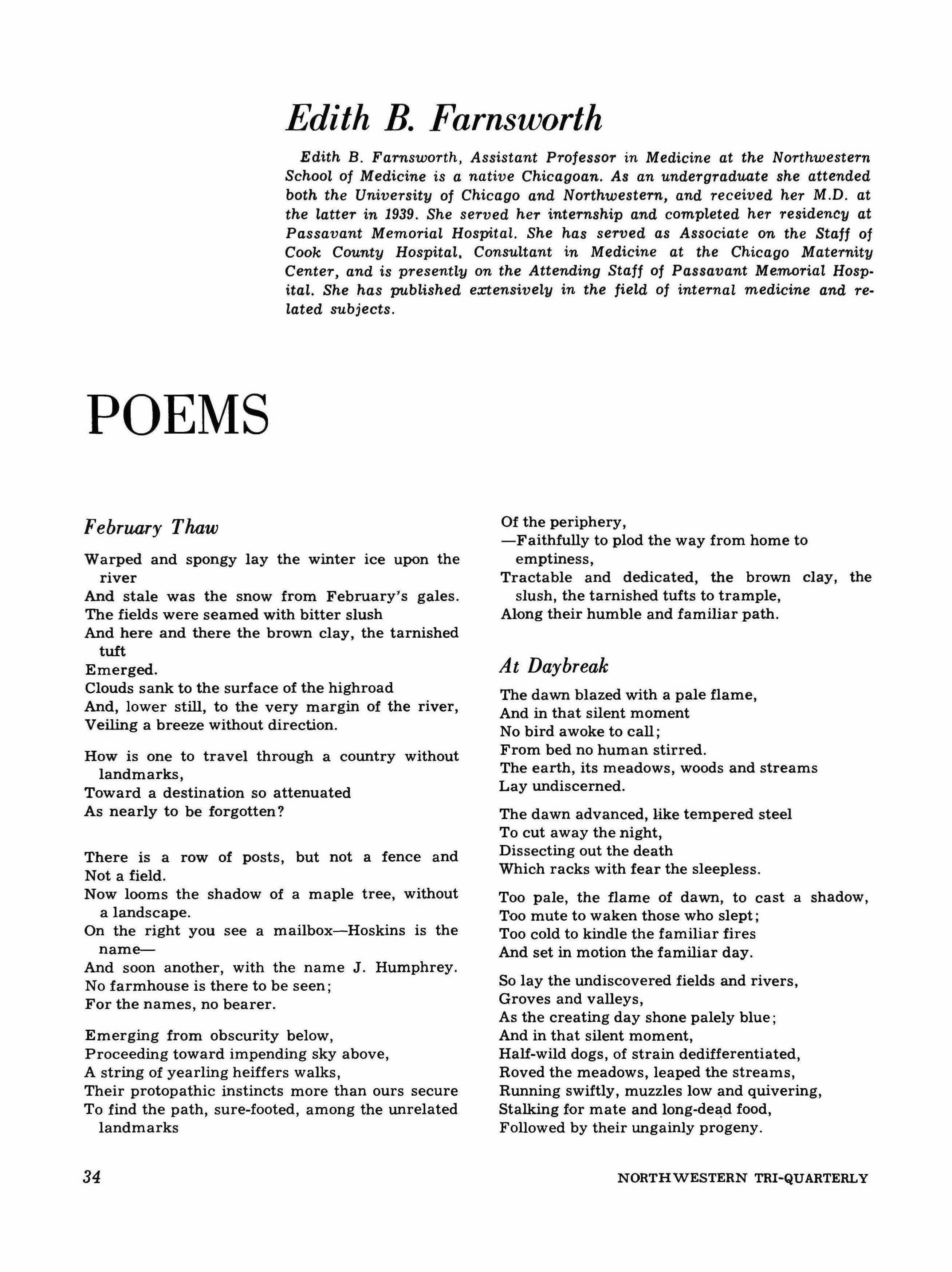
Of the periphery, -Faithfully to plod the way from home to emptiness, Tractable and dedicated, the brown clay, the slush, the tarnished tufts to trample, Along their humble and familiar path.
At Daybreak
The dawn blazed with a pale flame, And in that silent moment No bird awoke to call; From bed no human stirred. The earth, its meadows, woods and streams Lay undiscerned.
The dawn advanced, like tempered steel To cut away the night, Dissecting out the death Which racks with fear the sleepless.
Too pale, the flame of dawn, to cast a shadow, Too mute to waken those who slept; Too cold to kindle the familiar fires And set in motion the familiar day.
So lay the undiscovered fields and rivers, Groves and valleys, As the creating day shone palely blue; And in that silent moment, Half-wild dogs, of strain dedifferentiated, Roved the meadows, leaped the streams, Running swiftly, muzzles low and quivering, Stalking for mate and long-dead food, Followed by their ungainly progeny. NORTHWESTERN
34
TRI-QUARTERLY
Felix Pollak
Felix Pollak, from 1949 to 1959 Deering Library's Curator of Special Collections, is now in charge of the Rare Book Department of the University of Wisconsin Library. Last spring, just before he left to take up his work at Wisconsin, he made for THE TRI-QuARTERLY translations of several short pieces by the pungent Austrian writer, Alfred Polgar. These, with Mr. Pollak's comment, are now printed with the permission of Polgar's Austrian publisher and of Mrs. Polgar.
Felix Pollak is a native of Vienna, Austria, where he attended the Humanistic Gymnasium and later received a doctorate in jurisprudence from the University of Vienna. Coniing to this country in 1938, he went into library work, obtaining a B.S.L.S. [rom. the University of Buffalo, New York, and, after his service in the U.S. Army, his A.M.L.S. from the University of Michigan. He has publish�d prose and poetry in Austrian and German journals and in many little magazines in this country.
ALFRED POLGAR:
AN INTRODUCTION
ALFRED POLGAR. HAS SAID of the Viennese coffee house that it was not an institution but a Weltanschauung. (Being Polgar, he added the parenthesis that it was the gist of this world view not to view the world.) With this perfect explanation of why there are no coffee houses in America, Polgar has also explained why he himself is so unknown here. For he, too, represents a philosophy of life-a tone and feel of life-which is difficult, if not impossible, to transmit. It is a very European, specifically Austrian, and beyond that an intensely personal attitude; one might come closest to defining it by saying that the state of the world appeared to him in the same light in which the state of their national affairs appeared to his countrymen at any given point in their history: as hopeless but not serious.
Still, While the Polgar spirit-also known as esprit with an Austrian accent-is no easier to convey than the Polgar style, for which his contemporary Franz Blei had coined the term "filigranite," there are among his sketches, satires, critiques, stories, storiettes, musings, and amusements a few pieces the rendition of which can be attempted. Thus the following translations.
Polgar's work comprises roundly 20 volumes.
Fall, 1959
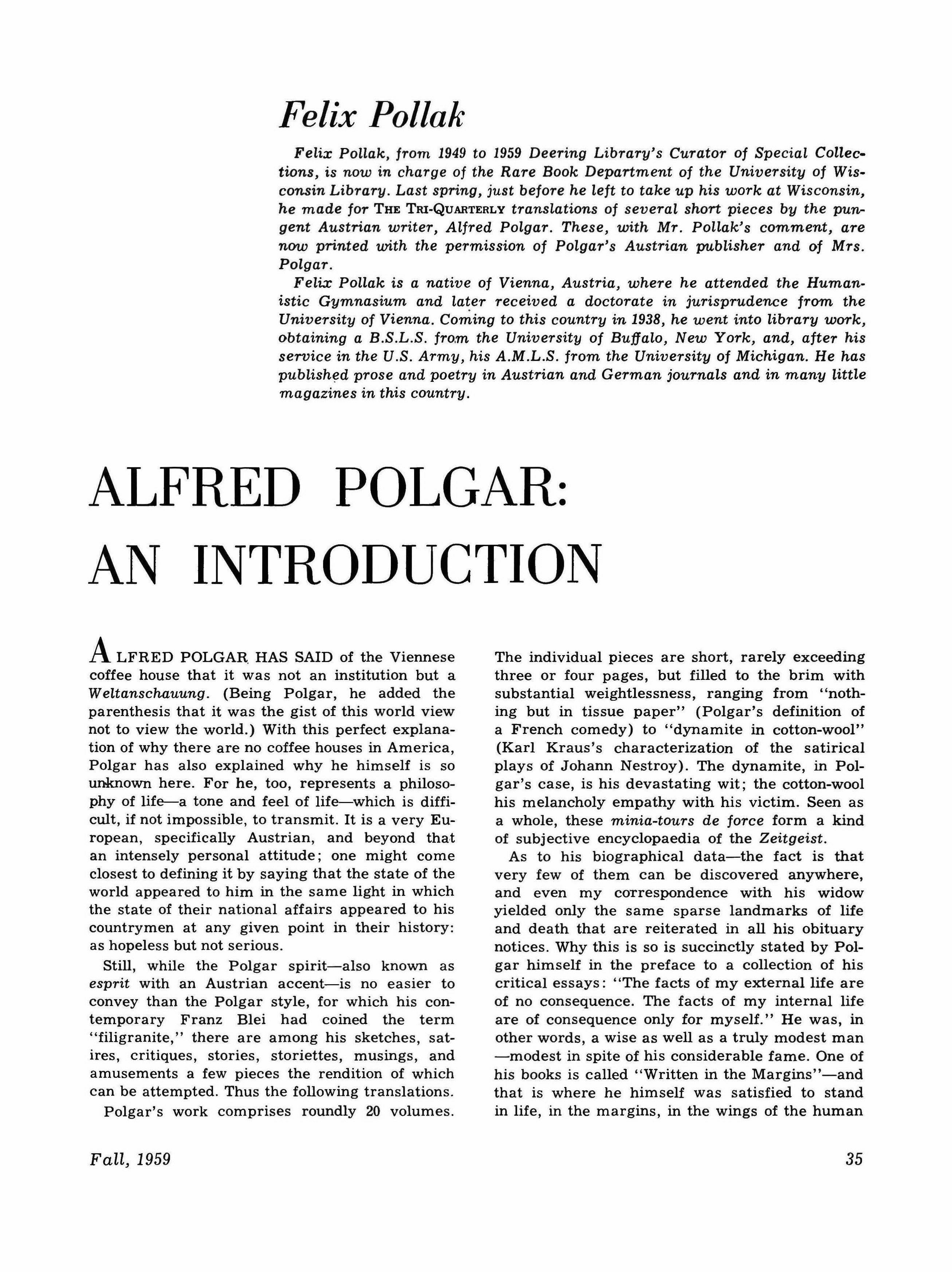
The individual pieces are short, rarely exceeding three or four pages, but filled to the brim with substantial weightlessness, ranging from "nothing but in tissue paper" (Polgar's definition of a French comedy) to "dynamite in cotton-wool" (Karl Kraus's characterization of the satirical plays of Johann Nestroy). The dynamite, in Polgar's case, is his devastating wit; the cotton-wool his melancholy empathy with his victim. Seen as a whole, these minia-tours de force form a kind of subjective encyclopaedia of the Zeitgeist.
As to his biographical data-the fact is that very few of them can be discovered anywhere, and even my correspondence with his widow yielded only the same sparse landmarks of life and death that are reiterated in all his obituary notices. Why this is so is succinctly stated by Polgar himself in the preface to a collection of his critical essays: "The facts of my external life are of no consequence. The facts of my internal life are of consequence only for myself." He was, in other words, a wise as well as a truly modest man -modest in spite of his considerable fame. One of his books is called "Written in the Margins"-and that is where he himself was satisfied to stand in life, in the margins, in the wings of the human
35
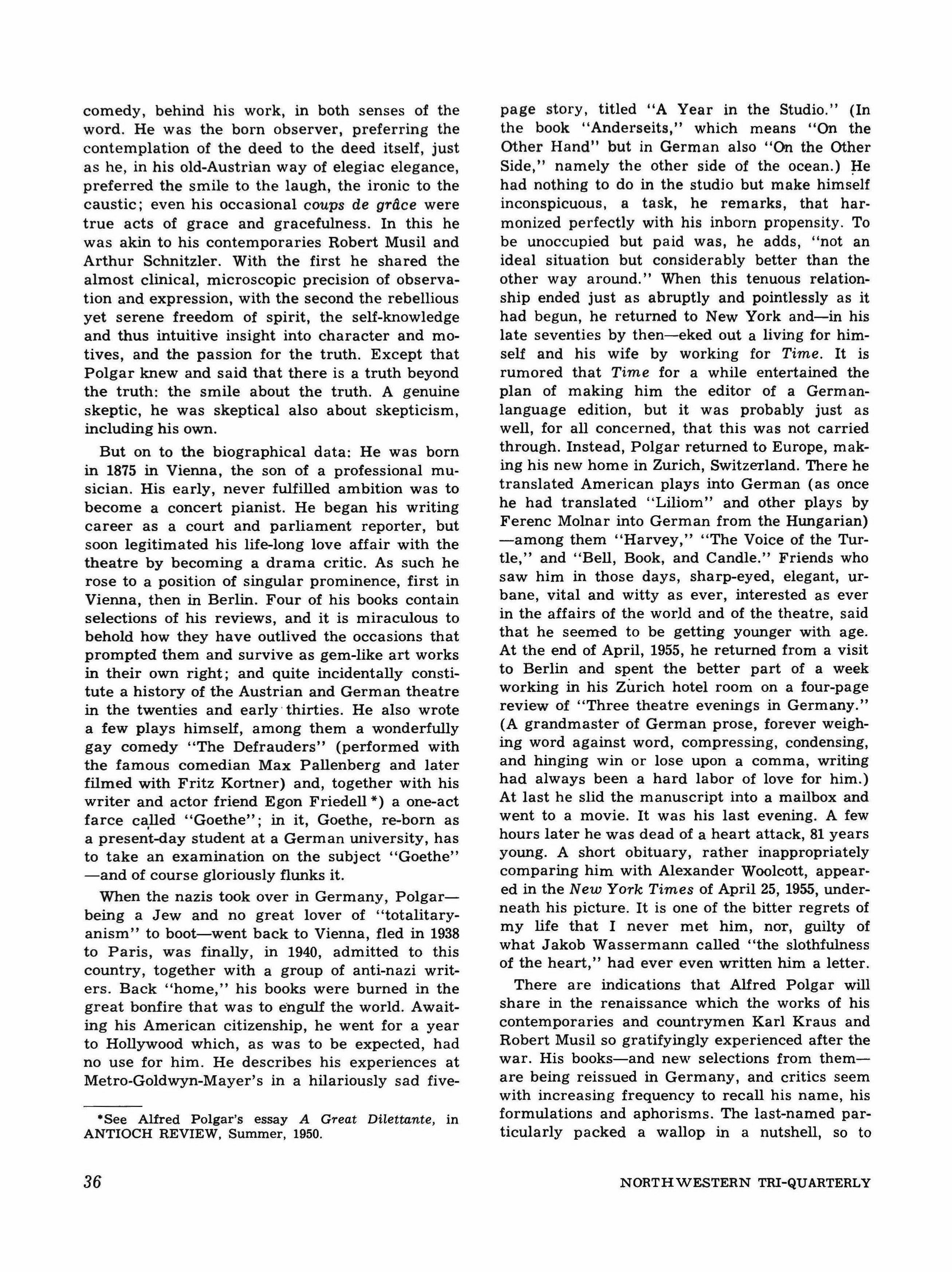
comedy, behind his work, in both senses of the word. He was the born observer, preferring the contemplation of the deed to the deed itself, just as he, in his old-Austrian way of elegiac elegance, preferred the smile to the laugh, the ironic to the caustic; even his occasional coups de grdce were true acts of grace and gracefulness. In this he was akin to his contemporaries Robert Musil and Arthur Schnitzler. With the first he shared the almost clinical, microscopic precision of observation and expression, with the second the rebellious yet serene freedom of spirit, the self-knowledge and thus intuitive insight into character and motives, and the passion for the truth. Except that Polgar knew and said that there is a truth beyond the truth: the smile about the truth. A genuine skeptic, he was skeptical also about skepticism, including his own.
But on to the biographical data: He was born in 1875 in Vienna, the son of a professional musician. His early, never fulfilled ambition was to become a concert pianist. He began his writing career as a court and parliament reporter, but soon legitimated his life-long love affair with the theatre by becoming a drama critic. As such he rose to a position of singular prominence, first in Vienna, then in Berlin. Four of his books contain selections of his reviews, and it is miraculous to behold how they have outlived the occasions that prompted them and survive as gem-like art works in their own right; and quite incidentally constitute a history of the Austrian and German theatre in the twenties and early' thirties. He also wrote a few plays himself, among them a wonderfully gay comedy "The Defrauders" (performed with the famous comedian Max Pallenberg and later filmed with Fritz Kortner) and, together with his writer and actor friend Egon Friedell *) a one-act farce called "Goethe"; in it, Goethe, re-born as a present-day student at a German university, has to take an examination on the subject "Goethe" -and of course gloriously flunks it.
When the nazis took over in Germany, Polgarbeing a Jew and no great lover of "totalitaryanism" to boot-went back to Vienna, fled in 1938 to Paris, was finally, in 1940, admitted to this country, together with a group of anti-nazi writers. Back "home," his books were burned in the great bonfire that was to engulf the world. Awaiting his American citizenship, he went for a year to Hollywood which, as was to be expected, had no use for him. He describes his experiences at Metro-Goldwyn-Mayer's in a hilariously sad five-
·See Alfred Polgar's essay A Great Dilettante, in ANTIOCH REVIEW, Summer, 1950.
page story, titled "A Year in the Studio." (In the book "Anderseits," which means "On the Other Hand" but in German also "On the Other Side," namely the other side of the ocean.) He had nothing to do in the studio but make hims�lf inconspicuous, a task, he remarks, that harmonized perfectly with his inborn propensity. To be unoccupied but paid was, he adds, "not an ideal situation but considerably better than the other way around." When this tenuous relationship ended just as abruptly and pointlessly as it had begun, he returned to New York and-in his late seventies by then-eked out a living for himself and his wife by working for Time. It is rumored that Time for a while entertained the plan of making him the editor of a Germanlanguage edition, but it was probably just as well, for all concerned, that this was not carried through. Instead, Polgar returned to Europe, rnaking his new home in Zurich, Switzerland. There he translated American plays into German (as once he had translated "Liliom" and other plays by Ferenc Molnar into German from the Hungarian) -among them "Harvey," "The Voice of the Turtle," and "Bell, Book, and Candle." Friends who saw him in those days, sharp-eyed, elegant, urbane, vital and witty as ever, interested as ever in the affairs of the world and of the theatre, said that he seemed to be getting younger with age. At the end of April, 1955, he returned from a visit to Berlin and spent the better part of a week working in his Zurich hotel room on a four-page review of "Three theatre evenings in Germany." (A grandmaster of German prose, forever weighing word against word, compressing, condensing, and hinging win or lose upon a comma, writing had always been a hard labor of love for him.) At last he slid the manuscript into a mailbox and went to a movie. It was his last evening. A few hours later he was dead of a heart attack, 81 years young. A short obituary, rather inappropriately comparing him with Alexander Woolcott, appeared in the New York Times of April 25, 1955, underneath his picture. It is one of the bitter regrets of my life that I never met him, nor, guilty of what Jakob Wassermann called "the slothfulness of the heart," had ever even written him a letter.
There are indications that Alfred Polgar will share in the renaissance which the works of his contemporaries and countrymen Karl Kraus and Robert Musil so gratifyingly experienced after the war. His books-and new selections from themare being reissued in Germany, and critics seem with increasing frequency to recall his name, his formulations and aphorisms. The last-named particularly packed a wallop in a nutshell, so to
36
NORTHWESTERN TRI-QUARTERLY
speak, combining spark and sparkle with profundity-as when he defines love as "a private world event" or comprises the fate of the emigre in the sentence, "The foreign land has not become home but home a foreign land." Or consider this product of his preoccupation with the big consequences of small events and the small consequences of big ones-a theme which we again encounter in his stories to follow: "The problems one creates when one throws a deed into the world behave contrary to the waves one creates when one throws a stone into the water: the problems begin wide and grow concentrically narrower and narrower-until they have shrunk into Tolstoy's question, How much earth does a man need?
Perspectives 0/ War*
"What does the death of the individual matter," said the captain, "if only the company upholds the honor of the flag!
"What significance does the fate of a regiment have, if only the town is taken and the enemy driven out?" said the general.
The patriot said, "And if we all have to die to the last man as long as it is of service to the fatherland.
The far-seeing historian of civilization saw far and said, "Even if a few nations should disappear -they wouldn't have gone down in vain. Europe would remember its common heritage and emerge from the blood-bath cleansed and new-born."
The wise man stroked his long beard with cool fingers: "Let us suppose old Europe would crumble into chaos: how beneficial this would be in the long run for the world! Its demise (this must be clear to anybody who can fathom deeper contexts) would bring the richest blessings to our planet. As fertilizer On the acre of mankind, the dead continent would produce upon this acre crops of undreamed richness."
God spoke: "For my solar system XXVII, arabic number 12, letter F, the elimination of the planet Earth would be of great advantage. It might even be a good thing to extinguish the whole solar system group XXVII in the interest of higher cosmic purposes
"May everything go to pot, if only my boy comes home in one piece!" said Mrs. Mueller and put the unread newspaper with the victory reports next to the untouched cup of Ersatz-coffee.
·From BEGEGNUNG 1M ZWIELICHT, Lothar Blanvalet Verlag, Berlin, 1951.
FaZZ, 1959
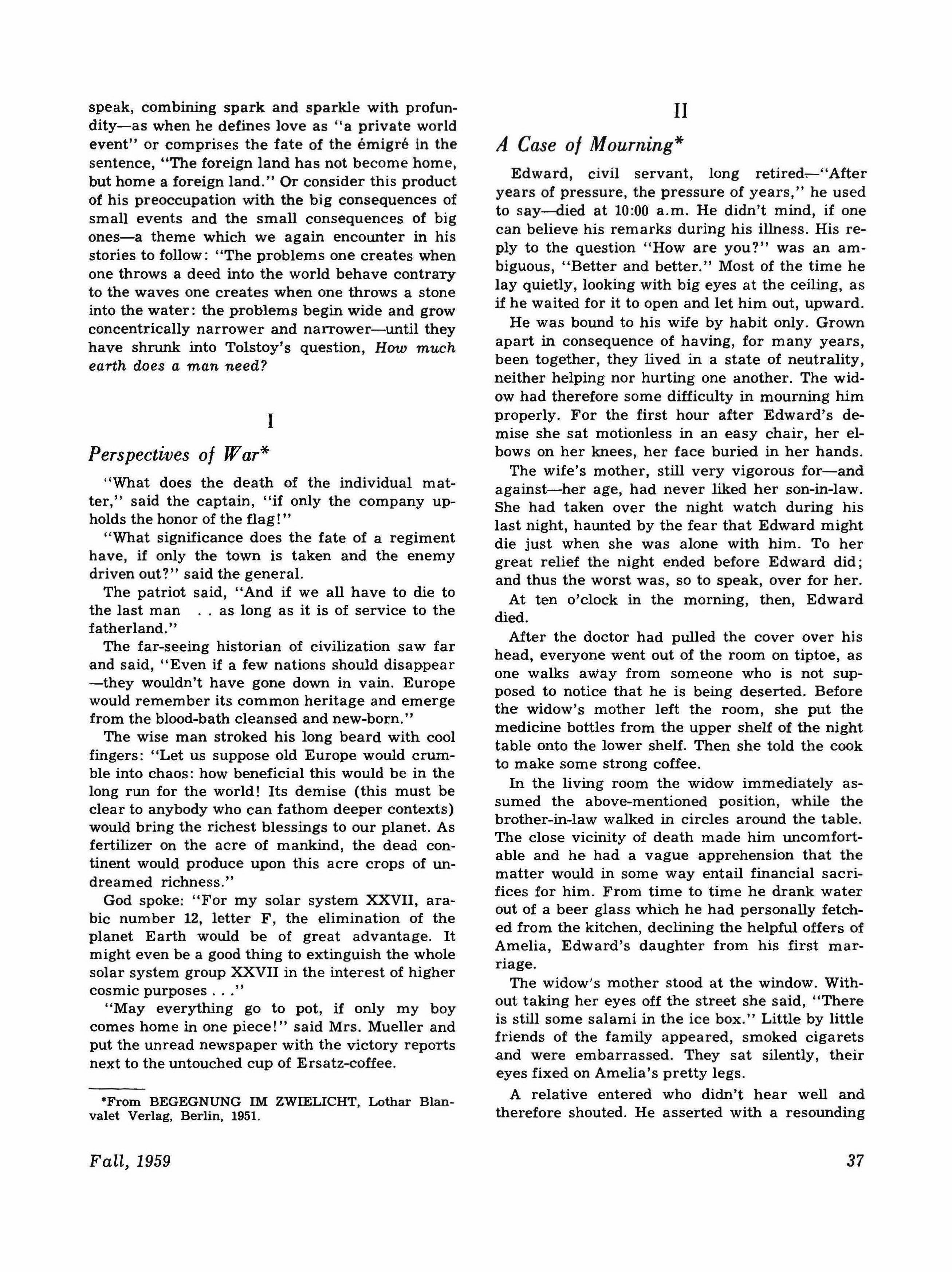
A Case 0/ Mourning*
Edward, civil servant, long retired->"After years of pressure, the pressure of years," he used to say-died at 10:00 a.m. He didn't mind, if one can believe his remarks during his illness. His reply to the question "How are you?" was an ambiguous, "Better and better." Most of the time he lay quietly, looking with big eyes at the ceiling, as if he waited for it to open and let him out, upward.
He was bound to his wife by habit only. Grown apart in consequence of having, for many years, be�n together, they lived in a state of neutrality, neither helping nor hurting one another. The widow had therefore some difficulty in mourning him properly. For the first hour after Edward's demise she sat motionless in an easy chair, her elbows on her knees, her face buried in her hands.
The wife's mother, still very vigorous for-and against-her age, had never liked her son-in-law. She had taken over the night watch during his last night, haunted by the fear that Edward might die just when she was alone with him. To her great relief the night ended before Edward did' and thus the worst was, so to speak, over for her:
At ten o'clock in the morning, then, Edward died.
After the doctor had pulled the cover over his head, everyone went out of the room on tiptoe, as one walks away from someone who is not supposed to notice that he is being deserted. Before the widow's mother left the room, she put the medicine bottles from the upper shelf of the night table onto the lower shelf. Then she told the cook to make some strong coffee.
In the living room the widow immediately assumed the above-mentioned position, while the brother-in-law walked in circles around the table. The close vicinity of death made him uncomfortable and he had a vague apprehension that the matter would in some way entail financial sacrifices for him. From time to time he drank water out of a beer glass which he had personally fetched from the kitchen, declining the helpful offers of Amelia, Edward's daughter from his first marriage.
The widow's mother stood at the window. Without taking her eyes off the street she said, "There is still some salami in the ice box." Little by little friends of the family appeared, smoked cigarets and were embarrassed. They sat silently, their eyes fixed on Amelia's pretty legs.
A relative entered who didn't hear well and therefore shouted. He asserted with a resounding
I
II
37
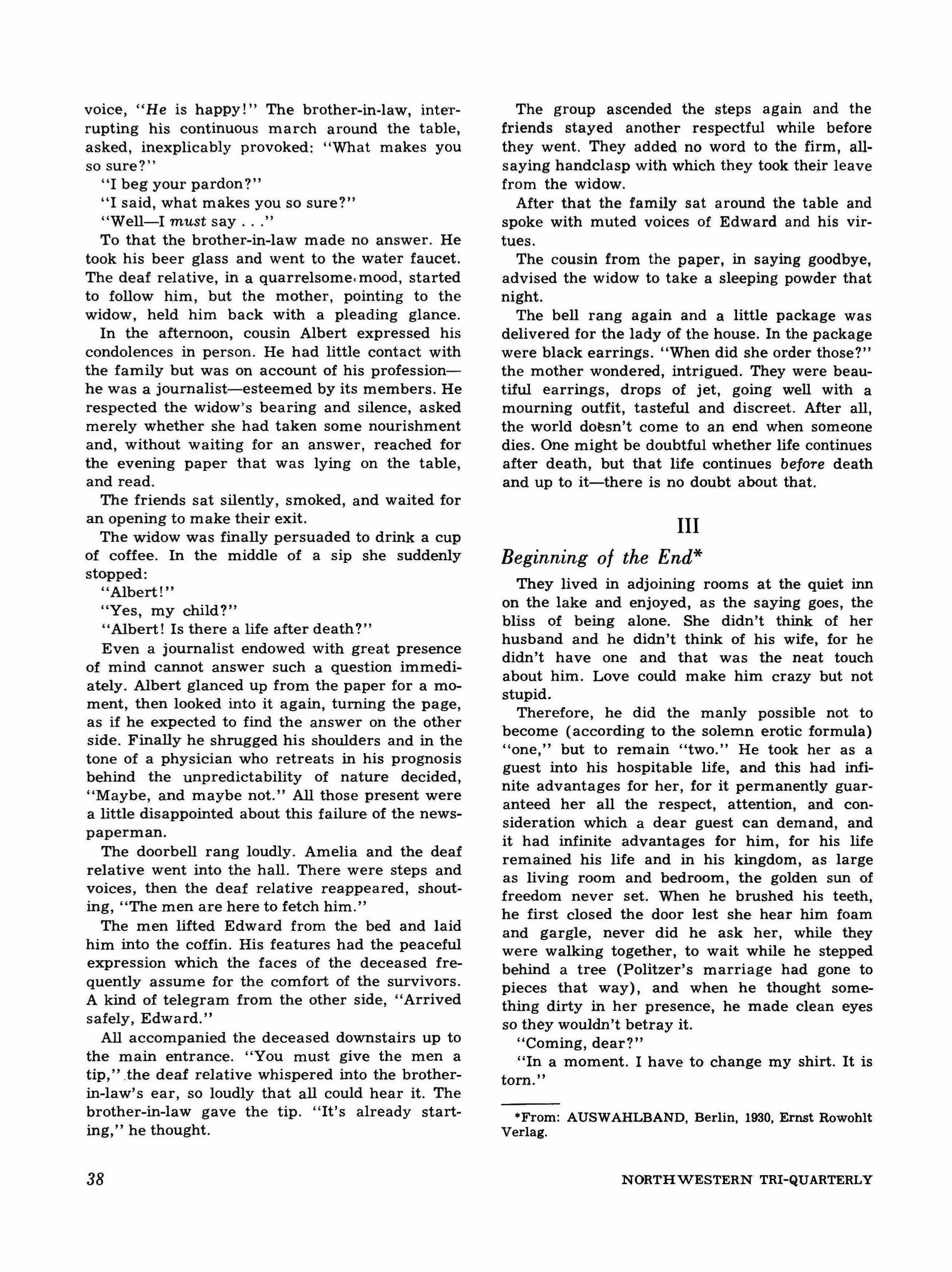
voice, "He is happy!" The brother-in-law, interrupting his continuous march around the table, asked, inexplicably provoked: "What makes you so sure?"
"I beg your pardon?"
"I said, what makes you so sure?"
"Well-I must say
To that the brother-in-law made no answer. He took his beer glass and went to the water faucet. The deaf relative, in a quarrelsome, mood, started to follow him, but the mother, pointing to the widow, held him back with a pleading glance.
In the afternoon, cousin Albert expressed his condolences in person. He had little contact with the family but was on account of his professionhe was a journalist-esteemed by its members. He respected the widow's bearing and silence, asked merely whether she had taken some nourishment and, without waiting for an answer, reached for the evening paper that was lying on the table, and read.
The friends sat silently, smoked, and waited for an opening to make their exit.
The widow was finally persuaded to drink a cup of coffee. In the middle of a sip she suddenly stopped:
"Albert!
"Yes, my child?"
"Albert! Is there a life after death?"
Even a journalist endowed with great presence of mind cannot answer such a question immediately. Albert glanced up from the paper for a moment, then looked into it again, turning the page, as if he expected to find the answer on the other side. Finally he shrugged his shoulders and in the tone of a physician who retreats in his prognosis behind the unpredictability of nature decided, "Maybe, and maybe not." All those present were a little disappointed about this failure of the newspaperman.
The doorbell rang loudly. Amelia and the deaf relative went into the hall. There were steps and voices, then the deaf relative reappeared, shouting, "The men are here to fetch him."
The men lifted Edward from the bed and laid him into the coffin. His features had the peaceful expression which the faces of the deceased frequently assume for the comfort of the survivors. A kind of telegram from the other side, "Arrived safely, Edward."
All accompanied the deceased downstairs up to the main entrance. "You must give the men a tip," the deaf relative whispered into the brotherin-law's ear, so loudly that all could hear it. The brother-in-law gave the tip. "It's already starting," he thought.
The group ascended the steps again and the friends stayed another respectful while before they went. They added no word to the firm, allsaying handclasp with which they took their leave from the widow.
After that the family sat around the table and spoke with muted voices of Edward and his virtues.
The cousin from the paper, in saying goodbye, advised the widow to take a sleeping powder that night.
The bell rang again and a little package was delivered for the lady of the house. In the package were black earrings. "When did she order those?" the mother wondered, intrigued. They were beautiful earrings, drops of jet, going well with a mourning outfit, tasteful and discreet. After all, the world doesn't come to an end when someone dies. One might be doubtful whether life continues after death, but that life continues before death and up to it-there is no doubt about that.
III
Beginning 0/ the End*
They lived in adjoining rooms at the quiet inn on the lake and enjoyed, as the saying goes, the bliss of being alone. She didn't think of her husband and he didn't think of his wife, for he didn't have one and that was the neat touch about him. Love could make him crazy but not stupid.
Therefore, he did the manly possible not to become (according to the solemn erotic formula) "one," but to remain "two." He took her as a guest into his hospitable life, and this had infinite advantages for her, for it permanently guaranteed her all the respect, attention, and consideration which a dear guest can demand, and it had infinite advantages for him, for his life remained his life and in his kingdom, as large as living room and bedroom, the golden sun of freedom never set. When he brushed his teeth, he first closed the door lest she hear him foam and gargle, never did he ask her, while they were walking together, to wait while he stepped behind a tree (Politzer's marriage had gone to pieces that way), and when he thought something dirty in her presence, he made clean eyes so they wouldn't betray it.
"Coming, dear?"
"In a moment. I have to change my shirt. It is torn."
·From: AUSWAHLBAND, Berlin, 1930, Ernst Rowohlt Verlag.
38
NORTHWESTERN TRI-QUARTERLY
Then, while he went to the village to get tobacco for his pipe, a free breath for his soul and Kleenex for the beloved, she took the torn shirt from his dresser and mended it.
He noticed the repair immediately. For a few seconds he stared fascinated at the scar of thread. His heartbeat was faint, his face sad.
"Didn't I mend this beautifully?" she asked, lovingly.
He stroked her hands and spoke:
"My sweet darling! You shouldn't have done this. This mended tear brings the first tear into our relationship. Every stitch a needle sting into my nervous system. I feel spitted upon your sewing needle a La papiHon. Oh, you mustn't play wife if our love is dear to you. Keep a little distance if you want to stay close. Lohengrin left Elsa not because she was curious but because he couldn't live without mystery, because he could only give himself if he could preserve himself. Such is man. Your womanly care frightens
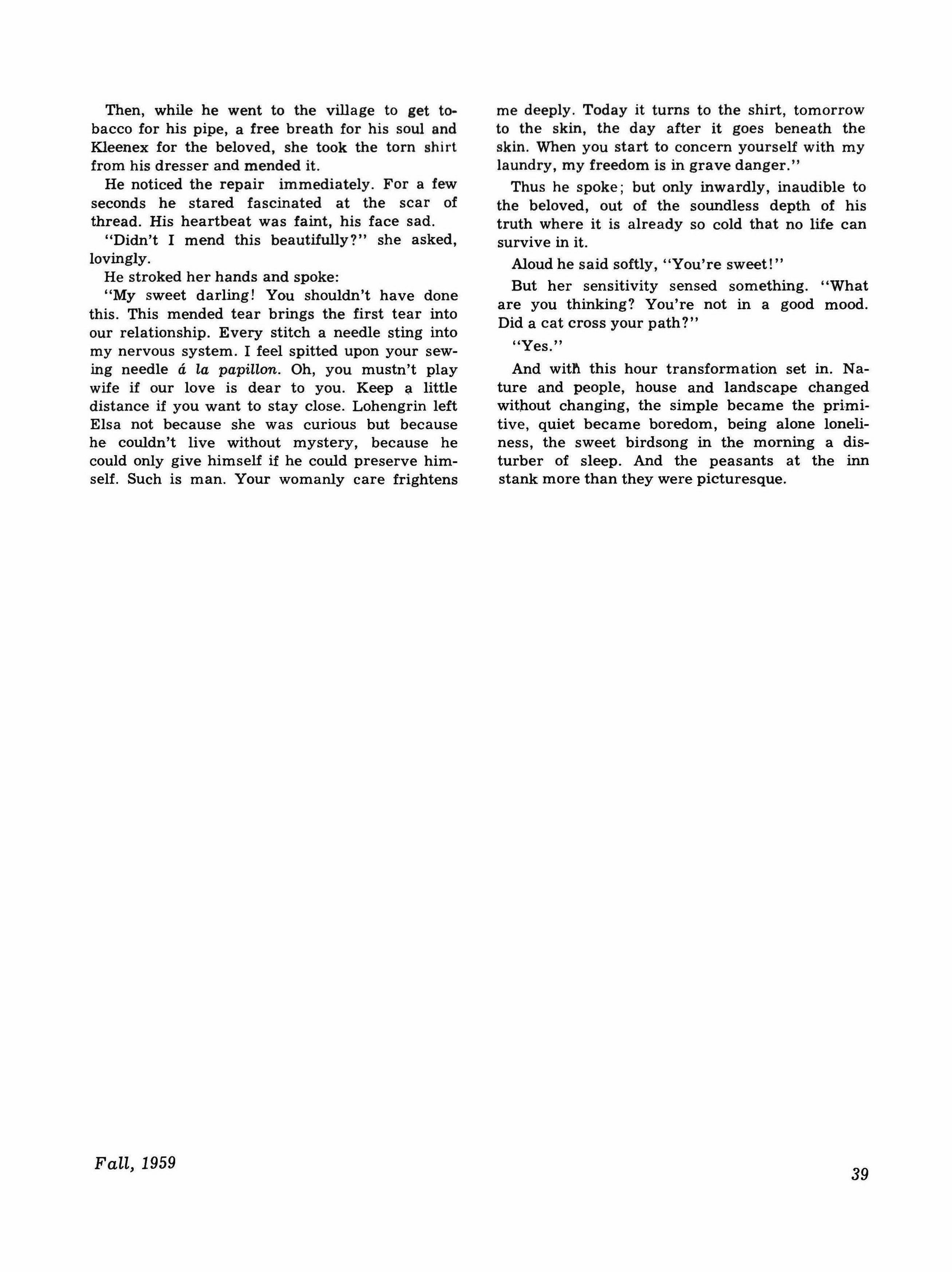
me deeply. Today it turns to the shirt, tomorrow to the skin, the day after it goes beneath the skin. When you start to concern yourself with my laundry, my freedom is in grave danger."
Thus he spoke; but only inwardly, inaudible to the beloved, out of the soundless depth of his truth where it is already so cold that no life can survive in it.
Aloud he said softly, "You're sweet!"
But her sensitivity sensed something. "What are you thinking? You're not in a good mood. Did a cat cross your path?"
"Yes."
And witl'l this hour transformation set in. Nature and people, house and landscape changed without changing, the simple became the primitive, quiet became boredom, being alone loneliness, the sweet birdsong in the morning a disturber of sleep. And the peasants at the inn stank more than they were picturesque.
Fall,
1959
39
Anthony H. M. Kirk-Greene
Before leaving Northwestern last spring to continue his visits to centers of area studies, Mr. Kirk-Greene, briLliant historian of African affairs, wrote this amusing squib for THE Tm-QUARTERLY.
Anthony H. M. Kirk-Greene, born in England - his home is at Tunbridge Wens, Kent - was educated at Oxford and afterwards served as District Officer in Northern Nigeria. He has been in this country as a Commonwealth Fellow of the Division of International Fellowships of the Carnegie Corporation. At Northwestern he attended seminars of the Program of African Studies. Among his several books are This is Nigeria, 1955, and Adamawa, Past and Present, 1958.
A CONVERSATION -PIECE:
On casually passing a friend in West
A/rica
HI!"-ONE
OF THE AMERICANISMS that, taut with the firm-willed resolution that made the British Empire what it is, I classified with wearing green earmuffs, eating syrup with my bacon and rhyming dance with pants instead of dahns, as a stigma of an alien culture to which I must not yield during my visit to the United States.
"Hi! "-nowadays not only my commonest Americanism (I'm still holding firm on the syrup), but also the only possible expression with which to greet those I meet on the campus, from the countless breath-taking co-eds that refresh labyrinthine Deering as heartwarmingly as the unexpected flower in the desert, to the friendly faculty members who resent the formality of the British "good morning, sir," yet for whom a first-name intimacy would doubtless jar on both parties.
"Hi! "-the inimitable, indispensable, all-embracing, nothing-or-everything, guaranteed-embarrassment-proof indication to friends that we are, after all, human and thus blessed with organs of speech, even though, intent on making class or a date, we've no time to blurt out more than the "HU" We all understand; nobody minds.
But in West Africa, where polished protocol holds sway and courtesy is not yet filed among the archives, where etiquette has not yet been
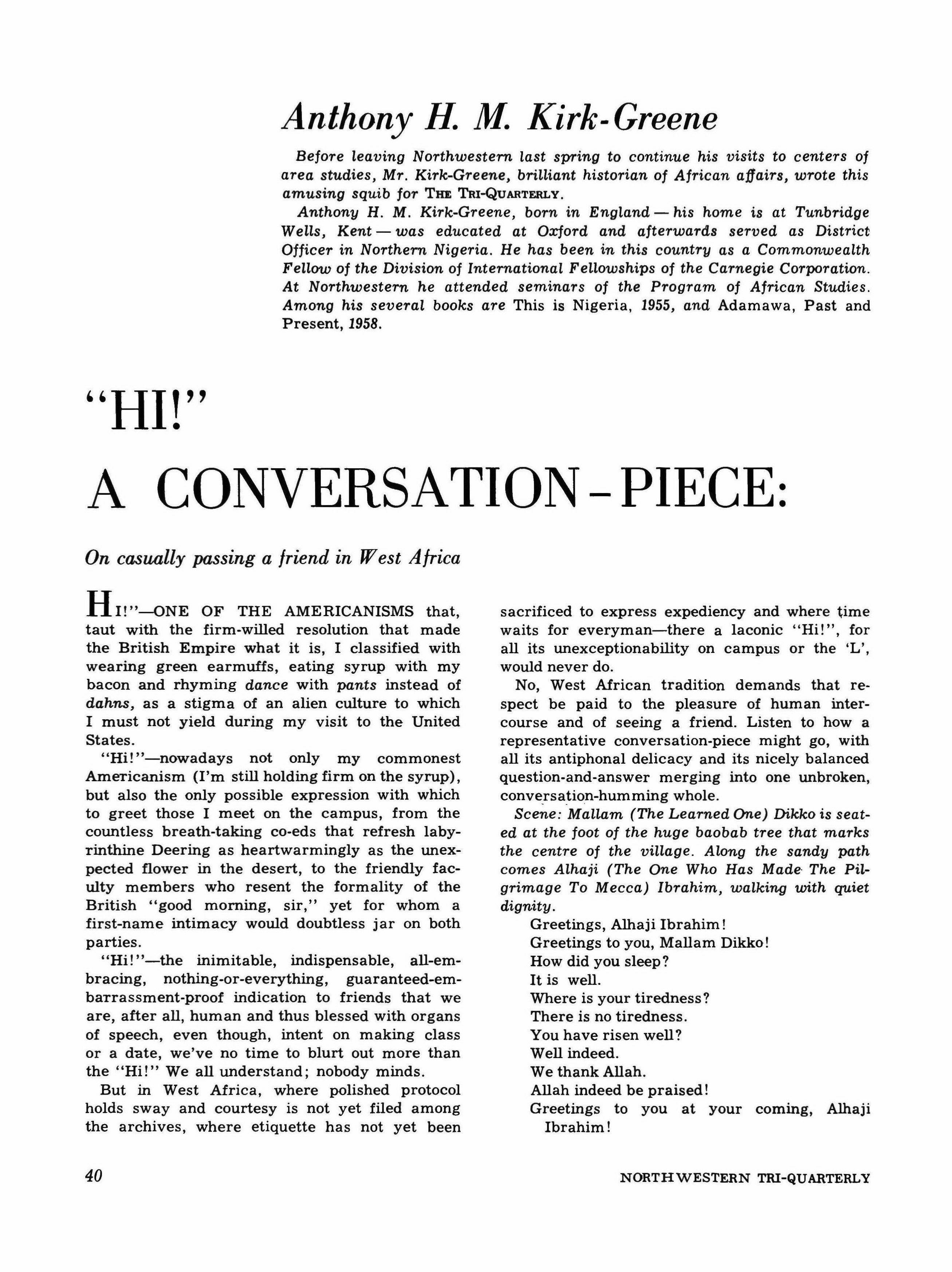
sacrificed to express expediency and where time waits for everyman-there a laconic "Hi!", for all its unexceptionability on campus or the 'L', would never do.
No, West African tradition demands that respect be paid to the pleasure of human intercourse and of seeing a friend. Listen to how a representative conversation-piece might go, with all its antiphonal delicacy and its nicely balanced question-and-answer merging into one unbroken, conversation-humming whole.
Scene: MaHam (The Learned One) Dikko is seated at the foot of the huge baobab tree that marks the centre of the village. Along the sandy path comes Alhaji (The One Who Has Made· The Pilgrimage To Mecca) Ibrahim, walking with quiet dignity.
Greetings, Alhaji Ibrahim!
Greetings to you, Mallam Dikko!
How did you sleep? It is well.
Where is your tiredness?
There is no tiredness.
You have risen well?
Well indeed.
We thank Allah.
Allah indeed be praised!
Greetings to you at your coming, Alhaji Ibrahim!
"HI! "
40
NORTHWESTERN TRI-QUARTERLY
Greetings to you, Mallam Dikko!
Welcome on your coming!
Greetings, greetings! You have come well?
But well, but well.
Greetings on the tiredness of your journey! Is your house well? Nothing but blessings. How are your doings? Nothing but thanks. How is the coldness? It is seasonable, Alhaji.
May Allah increase your prosperity! Amin!
Greetings to you, greetings to you! Where are you going, Alhaji Ibrahim? To the market, Mallam Dikko.
May Allah take you there safely! Amin!
Go in safety, Alhaji! Amin!
Blessings on your travelling!

1959
Greetings! May Allah give you good fortune! Amin!
Rest your tiredness, Alhaji!
Greetings! Till you return, Alhaji!
Greetings, Mallam! Allah give mercy to us! Amin!
Greet your household, Alhaji! They shall hear, Mallam. Till to-morrow!
May Allah bring us safely to it!
Amin! Amin!
So, 0 searchers after the truth in West Africa, whether you come as anthropologists, missionaries, top executives or just plain visitors, please remember what we Euramericans find so difficult: never cut the cackle, even if you want to ask a one-line question that calls for a monosyllabic answer.
Meanwhile, folks,-it's "Hi!" and "Bye!"
FaU,
41
Robert Anglim
Robert Anglim is a pen name chosen by Marion N. Howard, L.A. '58, now Mrs. Donald E. Moes. Born in Cleveland, she attended school there, then majored in History at Northwestern where, in her senior year, she received the Edwin L. Shuman Award for excellence in writing. Since graduation she has studied composition in the Evenings Division of the University, while her husband studied at the Technological Institute.
"A Piece of Fat" won first prize last winter in the Nelson A. Litten Short Story Contest. It is an evocation of one of the bands of wild children reputed to have roamed Russia during the famine which followed the Revolution of 1917. But Mrs. Moes intends a meaning that is not localized.
A PIECE OF FAT
THE BUILDING WAS COLD and there were no doors, or if there had once been, they had long since been carried away for firewood. From inside the black bowels of its one room an occasional pathetic cough or fitful cry sounded from the small lumps on the floor.
Misha sat awake and huddled with his arms caught about his body trying to keep the constant chills from shuddering down his back and arms. Next to him a girl moved restlessly and then jerked in a nervous spasm. Misha's listless eyes ignored her. He wanted to feel nothing, be aware of nothing.
He tried to ignore the intense itching in his scalp. He wanted to forget it but he couldn't. Quickly he removed a hand from its warm spot under his armpit, feeling for some way to reach into the mats that covered his head. Finally pushing enough of the tangles aside to be able to touch the spot, he scratched a small bony finger hard, and caked bits of his scalp flaked off in chunks. The more he scratched the more he wanted to scratch and the itching became unbearable. At last it seemed to subside. He gave one final dig with his finger and then tried to find how he had placed his hand under his arm before, making him feel so warm. Turning it this way and that, he still couldn't find the same position and at last he just shoved it under to warm a new position. His head fell spastically against the wall and he appeared to be asleep.
But ideas of sleep now brought other associations-deep inside-his mind was suddenly filled with a thought and idea of great excitement to
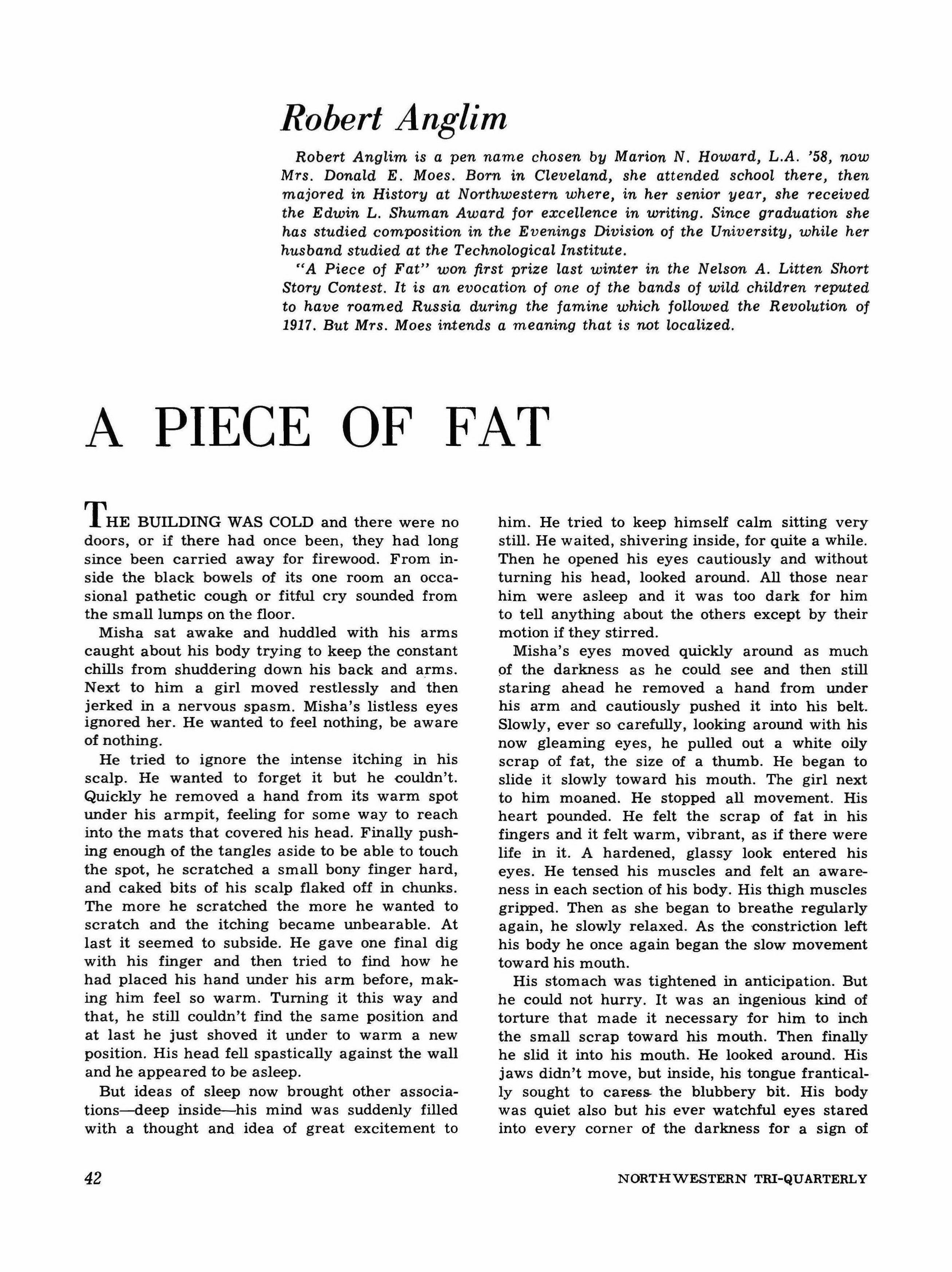
him. He tried to keep himself calm sitting very still. He waited, shivering inside, for quite a while. Then he opened his eyes cautiously and without turning his head, looked around. All those near him were asleep and it was too dark for him to tell anything about the others except by their motion if they stirred.
Misha's eyes moved quickly around as much of the darkness as he could see and then still staring ahead he removed a hand from under his arm and cautiously pushed it into his belt. Slowly, ever so carefully, looking around with his now gleaming eyes, he pulled out a white oily scrap of fat, the size of a thumb. He began to slide it slowly toward his mouth. The girl next to him moaned. He stopped all movement. His heart pounded. He felt the scrap of fat in his fingers and it felt warm, vibrant, as if there were life in it. A hardened, glassy look entered his eyes. He tensed his muscles and felt an awareness in each section of his body. His thigh muscles gripped. Then as she began to breathe regularly again, he slowly relaxed. As the constriction left his body he once again began the slow movement toward his mouth.
His stomach was tightened in anticipation. But he could not hurry. It was an ingenious kind of torture that made it necessary for him to inch the small scrap toward his mouth. Then finally he slid it into his mouth. He looked around. His jaws didn't move, but inside, his tongue frantically sought to caress the blubbery bit. His body was quiet also but his ever watchful eyes stared into every corner of the darkness for a sign of
42
NORTHWESTERN TRI-QUARTERLY
movement. He smiled to himself in painful ecstasy.
Suddenly in the sharp night air outside there was a stumbling sound. The scene became distorted. Within seconds all of the children were awake-half-crouched, sitting, listening quietly. The sounds came closer. There was rarely a sound of breathing inside the room. Looking out of the darkness at the partially light doorway they waited as the stumbling sounds grew louder. Still the children remained quiet. Then in the faint light two men appeared-thin, starved shapes dragging themselves along. They passed by the doorway and down the alley.
Misha sat terrorized with the rest of the children. His whole thought centered on the doorway. Silently the small piece of fat seemed to slip into his throat and, sputtering, he coughed violently. Immediately the footsteps turned and started back. Misha let the fat fall to the ground as he buried his head desperately between his knees. But the light in the doorway was blotted out and then reappeared. The figures moved into the room.
Immediately all was confusion. The children sprang to their feet and crowded against the far wall. The men advanced quickly and awkwardly, each breathing heavily and grunting unintelligible sounds. Within about four feet of the children they paused. There was a stillness on both sides, a pause-each waiting; and then as the stillness became unbearable, the men lunged. The children scattered along the wall with screams and frightened cries, but within their obvious chaos was some sort of uncanny coordination. As the men grabbed a little figure, immediately there were others behind them, beside them, seeking to reach the eyes with their small fingers, kicking at the testicles of the men, trying to find any damaging spot. As the men turned, the little girl slipped out of their grasp with a sharp cry.
Gradually more and more children reversed the positions and escaped around the brute bodies of the men till it was they who darkened the door, and then with one almost unanimous cry they shoved at the men, then turned and fled. Some limped, one's arm dangled at odd angles, but helping each other-dragging, falling-with a clatter they soon outdistanced the men. Misha ran close to the front of them. His eyes protruded and his lungs were bursting. He began to feel a numbing pain in his side.
Soon the children realized the running noise was coming only from their feet and they began to slow down and then gradually began to meander in the street. Some sat down as weak legs couldn't
Fall, 1959
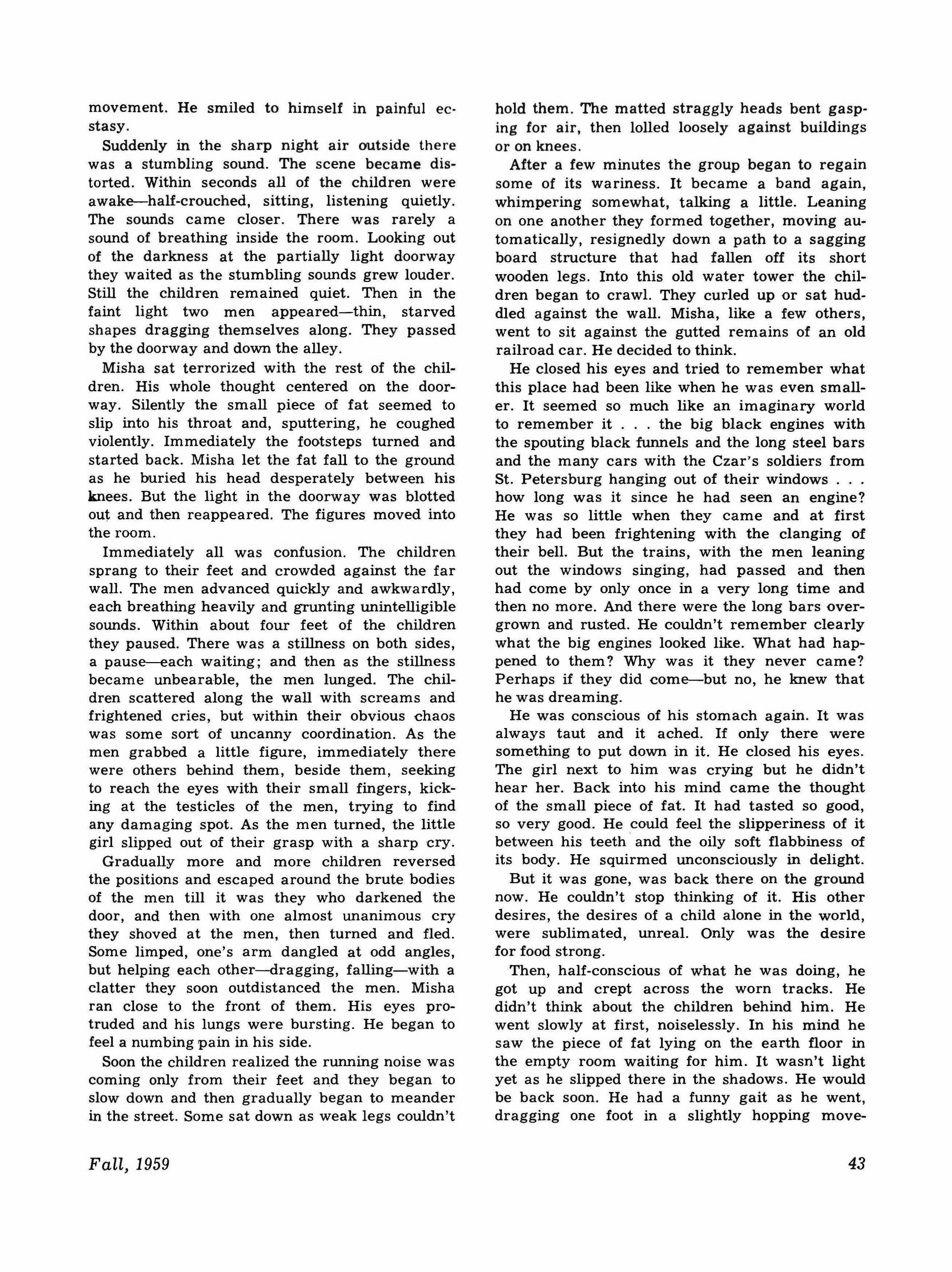
hold them. The matted straggly heads bent gasping for air, then lolled loosely against buildings or on knees.
After a few minutes the group began to regain some of its wariness. It became a band again, whimpering somewhat, talking a little. Leaning on one another they formed together, moving automatically, resignedly down a path to a sagging board structure that had fallen off its short wooden legs. Into this old water tower the children began to crawl. They curled up or sat huddled against the wall. Misha, like a few others, went to sit against the gutted remains of an old railroad car. He decided to think.
He closed his eyes and tried to remember what this place had been like when he was even smaller. It seemed so much like an imaginary world to remember it the big black engines with the spouting black funnels and the long steel bars and the many cars with the Czar's soldiers from St. Petersburg hanging out of their windows how long was it since he had seen an engine? He was so little when they came and at first they had been frightening with the clanging of their bell. But the trains, with the men leaning out the windows singing, had passed and then had come by only once in a very long time and then no more. And there were the long bars overgrown and rusted. He couldn't remember clearly what the big engines looked like. What had happened to them? Why was it they never came? Perhaps if they did come-but no, he knew that he was dreaming.
He was conscious of his stomach again. It was always taut and it ached. If only there were something to put down in it. He closed his eyes. The girl next to him was crying but he didn't hear her. Back into his mind came the thought of the small piece of fat. It had tasted so good, so very good. He could feel the slipperiness of it between his teeth and the oily soft flabbiness of its body. He squirmed unconsciously in delight.
But it was gone, was back there on the ground now. He couldn't stop thinking of it. His other desires, the desires of a child alone in the world, were sublimated, unreal. Only was the desire for food strong.
Then, half-conscious of what he was doing, he got up and crept across the worn tracks. He didn't think about the children behind him. He went slowly at first, noiselessly. In his mind he saw the piece of fat lying on the earth floor in the empty room waiting for him. It wasn't light yet as he slipped there in the shadows. He would be back soon. He had a funny gait as he went, dragging one foot in a slightly hopping move-
43
ment. He stuck close to the buildings and shadows. He would be back soon.
The streets were deserted. Down one street, up another, between the buildings; he avoided certain houses where he knew the men were likely to be. Quicker and quicker he moved till at last he reached the street. He breathed a silent sigh and then made his way among the rubble to the doorway.
He listened cautiously for a moment but heard nothing. He slipped in and over to the corner where he had sat before. His eyes began to become adjusted to the darkness and he strained
Just Imagine
"Just imagine," he said. The words echoed in my brain and I tried. But I cannot imagine, for my child's mind is gone. Only my child's emotions remain.
Winter Rain
The town awoke with the eight-hour memory of winter fresh in its mind and smelled the rain.
The businessman looked at his ram-soaked newspaper and cursed.
The housewife thought of her children's muddy feet and sighed.
The children thought of gutter dams and mudpuddles and laughed.
The town put on its galoshes and raised its umbrella and went about its business, thinking of baseball and fishing trips,
them eagerly at the ground. The darkness began to form, gain depth and perspective until he was able to see the floor before his eyes. At first, painfully, he thought the piece was gone but then with occult joy he saw it lying near the corner, dirt caked on its greasy moist surface. His grubby fingers tried to brush some of the soil off. He picked most of the lumps off hurriedly and gratefully and then slipped it into his mouth. He smiled. There was so much warm life in the fat.
From the darkness around him two shapes arose noiselessly and began to move toward him.
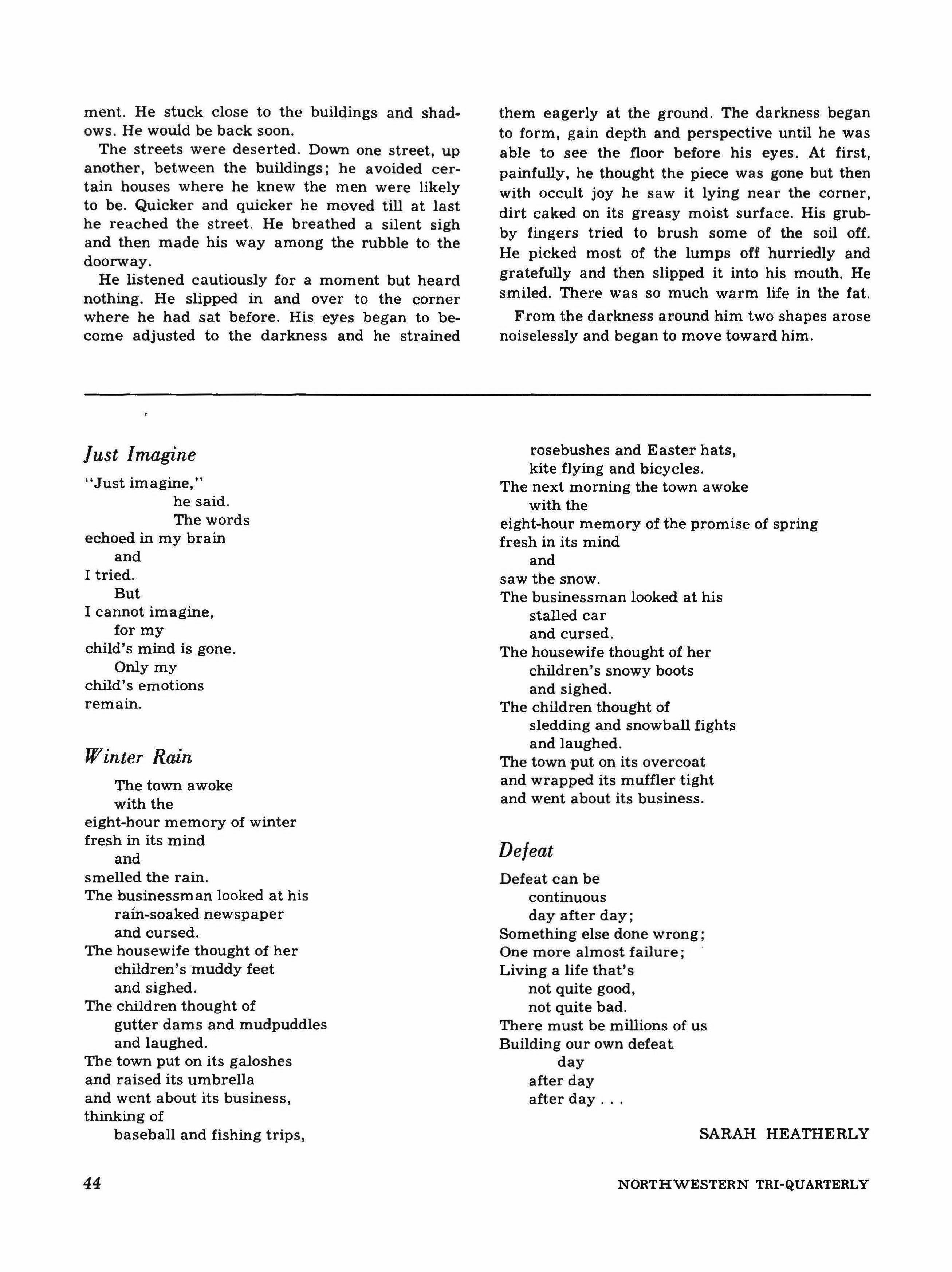
rosebushes and Easter hats, kite flying and bicycles.
The next morning the town awoke with the eight-hour memory of the promise of spring fresh in its mind and saw the snow.
The businessman looked at his stalled car and cursed.
The housewife thought of her children's snowy boots and sighed.
The children thought of sledding and snowball fights and laughed.
The town put on its overcoat and wrapped its muffler tight and went about its business.
De/eat
Defeat can be continuous day after day; Something else done wrong; One more almost failure; Living a life that's not quite good, not quite bad.
There must be millions of us
Building our own defeat day after day after day
44
NORTHWESTERN TRI-QUARTERLY
SARAH HEATHERLY
Sarah Heatherly
Sarah Heatherly, L.A. '58, now Mrs. Carl S. Lossau, has recently been working in the Documents Room at Deering Library while her husband, engaged in research for the Chicago City Planning Board, completes his work for the Ph.D. degree in Geography. She was born in BrO'l.VTl.sville, Texas, went to school in St. Louis, and majored in English Composition at Northwestern. THE TRIQUARTERLY is pleased to include in this issue three of her poems, which appear on the facing page, as well as her story.
TOO OLD
TO BE A SISTER
DID YOU KNOW that every neighborhood is divided into two worlds? "Their" world and "our" world. Or to state it more clearly, the children's world and the adults' world.
Somewhere during high school I passed quietly from the former into the latter without knowing it. But this summer we moved into a new neighborhood, and I realized how clearly marked is the line between the two.
Our family consists of two children, Bill, age nine, and Cherry, age twelve; two adults, my parents; and one young college person caught in the no man's land between, me. I slipped easily into the adult world. I spoke to the neighbors over the rose bushes but never walked on their grass. When I went to the local grocer or the mail box, I took the accredited route via the paved footpaths the city fathers call streets. I nodded to an occasional dog but knew the names, owners, and favorite home territory of none of them. I spoke to the neglected-looking children that happened past, but connected none of them with permanent dwelling places. And so I continued, half a summer, knowing nothing of the world in which my brother and sister lived.
One day in mid-July, my mother for som€ reason needed the children in the middle of the afternoon. They weren't within calling distance. They never are. Ordinarily the children in our neighborhood wander freely in the summertime, appearing only for meals and when dark sets in. If any parent needs a child unexpectedly there is usually some other child around and the grapevine system of youth takes over. Within ten minutes the child appears from across the street, or down
Fall, 1959
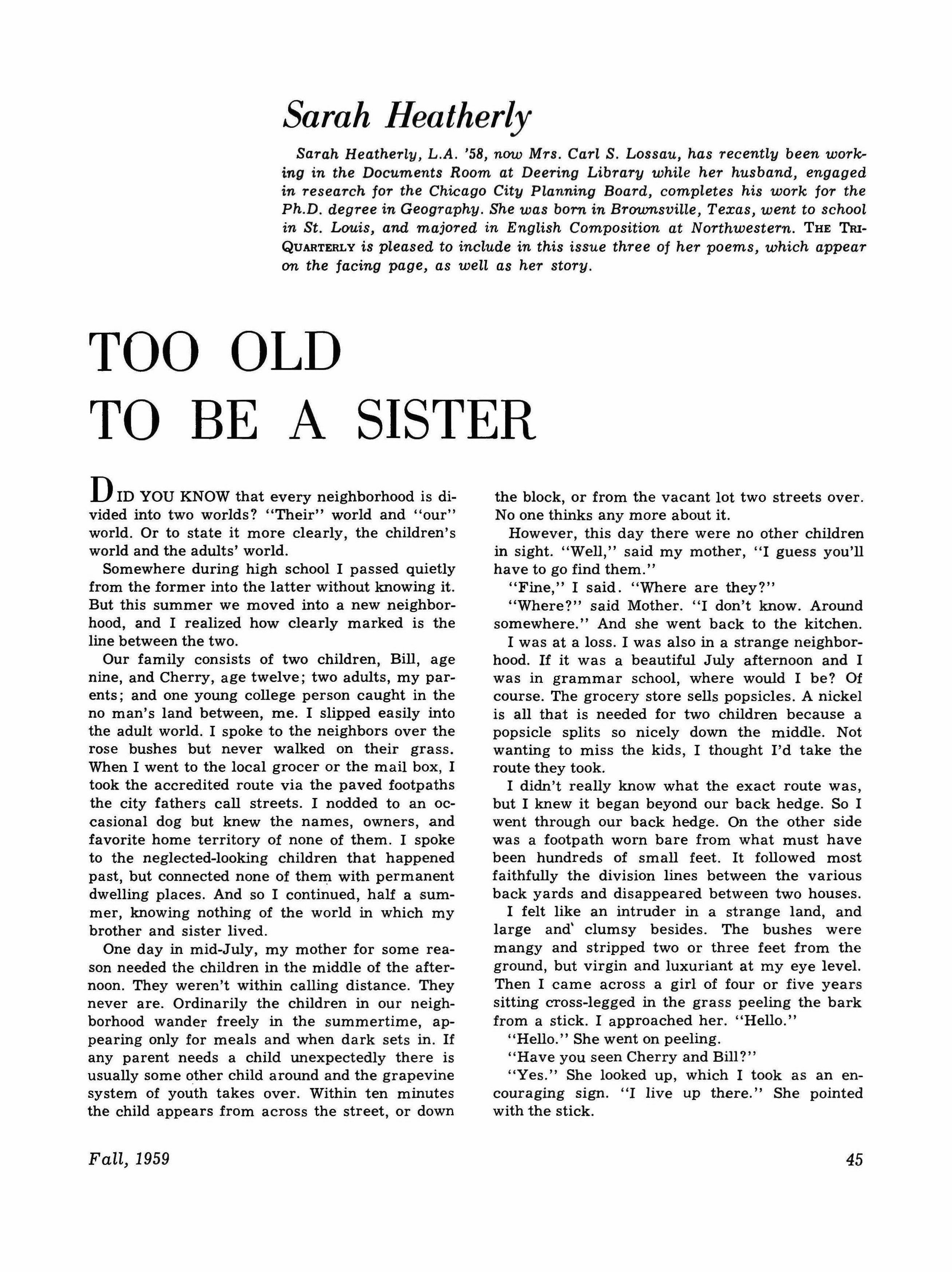
the block, or from the vacant lot two streets over. No one thinks any more about it.
However, this day there were no other children in sight. "Well," said my mother, "I guess you'll have to go find them."
"Fine," I said. "Where are they?"
"Where?" said Mother. "I don't know. Around somewhere." And she went back to the kitchen.
I was at a loss. I was also in a strang€ neighborhood. If it was a beautiful July afternoon and I was in grammar school, where would I be? Of course. The grocery store sells popsicles. A nickel is all that is needed for two children because a popsicle splits so nicely down the middle. Not wanting to miss the kids, I thought I'd take the route they took.
I didn't really know what the exact route was, but I knew it began beyond our back hedge. So I went through our back hedge. On the other side was a footpath worn bare from what must have been hundreds of small feet. It followed most faithfully the division lines between the various back yards and disappeared between two houses.
I felt like an intruder in a strange land, and large and' clumsy besides. The bushes were mangy and stripped two or three feet from the ground, but virgin and luxuriant at my eye level. Then I came across a girl of four or five years sitting cross-legged in the grass peeling the bark from a stick. I approached her. "Hello."
"Hello." She went on peeling.
"Have you seen Cherry and Bill?"
"Yes." She looked up, which I took as an encouraging sign. "I live up there." She pointed with the stick.
45
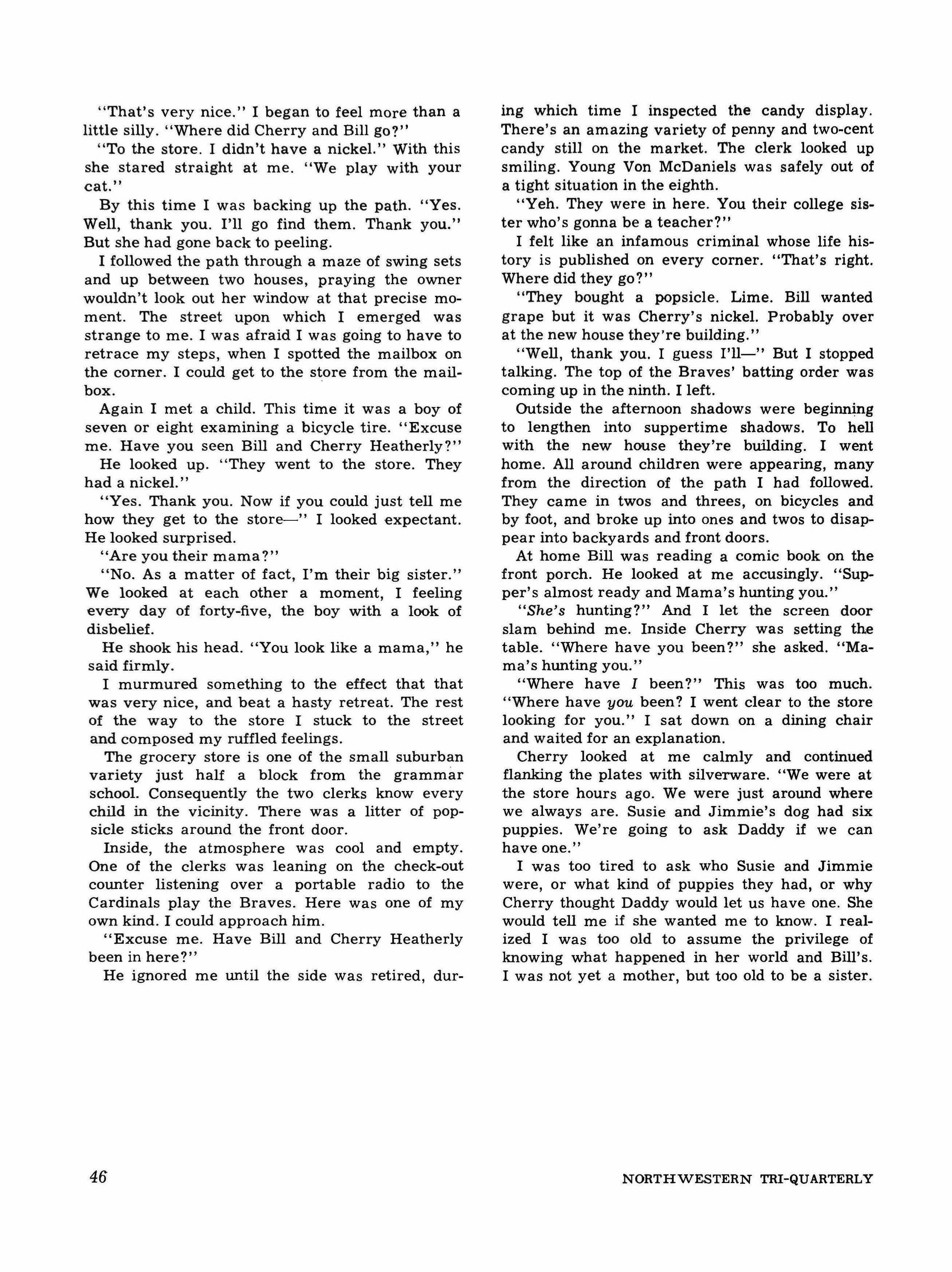
"That's very nice." I began to feel more than a little silly. "Where did Cherry and Bill go?"
"To the store. 1 didn't have a nickel." With this she stared straight at me. "We play with your cat."
By this time 1 was backing up the path. "Yes. Well, thank you. I'll go find them. Thank you." But she had gone back to peeling.
I followed the path through a maze of swing sets and up between two houses, praying the owner wouldn't look out her window at that precise moment. The street upon which I emerged was strange to me. I was afraid I was going to have to retrace my steps, when I spotted the mailbox on the comer. I could get to the store from the mailbox.
Again I met a child. This time it was a boy of seven or eight examining a bicycle tire. "Excuse me. Have you seen Bill and Cherry Heatherly?"
He looked up. "They went to the store. They had a nickel."
"Yes. Thank you. Now if you could just tell me how they get to the store-" I looked expectant. He looked surprised.
"Are you their mama?"
"No. As a matter of fact, I'm their big sister." We looked at each other a moment, I feeling every day of forty-five, the boy with a look of disbelief.
He shook his head. "You look like a mama," he said firmly.
I murmured something to the effect that that was very nice, and beat a hasty retreat. The rest of the way to the store I stuck to the street and composed my ruffled feelings.
The grocery store is one of the small suburban variety just half a block from the grammar school. Consequently the two clerks know every child in the vicinity. There was a litter of popsicle sticks around the front door.
Inside, the atmosphere was cool and empty. One of the clerks was leaning on the check-out counter listening over a portable radio to the Cardinals play the Braves. Here was one of my own kind. I could approach him.
"Excuse me. Have Bill and Cherry Heatherly been in here?"
He ignored me until the side was retired, dur-
ing which time I inspected the candy display. There's an amazing variety of penny and two-cent candy still on the market. The clerk looked up smiling. Young Von McDaniels was safely out of a tight situation in the eighth.
"Yeh. They were in here. You their college sister who's gonna be a teacher?"
1 felt like an infamous criminal whose life history is published on every corner. "That's right. Where did they go?"
"They bought a popsicle. Lime. Bill wanted grape but it was Cherry's nickel. Probably over at the new house they're building."
"Well, thank you. 1 guess 1'11-" But I stopped talking. The top of the Braves' batting order was coming up in the ninth. I left.
Outside the afternoon shadows were beginning to lengthen into suppertime shadows. To hell with the new house they're building. I went home. All around children were appearing, many from the direction of the path I had followed. They came in twos and threes, on bicycles and by foot, and broke up into ones and twos to disappear into backyards and front doors.
At home Bill was reading a comic book on the front porch. He looked at me accusingly. "Supper's almost ready and Mama's hunting you."
"She's hunting?" And I let the screen door slam behind me. Inside Cherry was setting the table. "Where have you been?" she asked. "Mama's hunting you."
"Where have I been?" This was too much. "Where have you been? I went clear to the store looking for you." I sat down on a dining chair and waited for an explanation.
Cherry looked at me calmly and continued flanking the plates with silverware. "We were at the store hours ago. We were just around where we always are. Susie and Jimmie's dog had six puppies. We're going to ask Daddy if we can have one."
I was too tired to ask who Susie and Jimmie were, or what kind of puppies they had, or why Cherry thought Daddy would let us have one. She would tell me if she wanted me to know. I realized I was too old to assume the privilege of knowing what happened in her world and Bill's. I was not yet a mother, but too old to be a sister.
46
NORTHWESTERN TRI-QUARTERLY














































